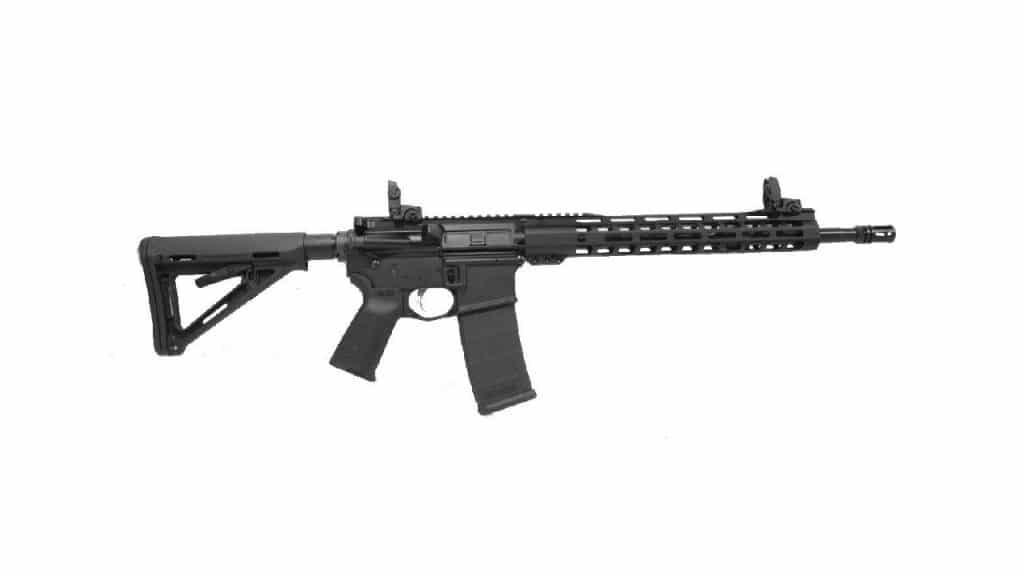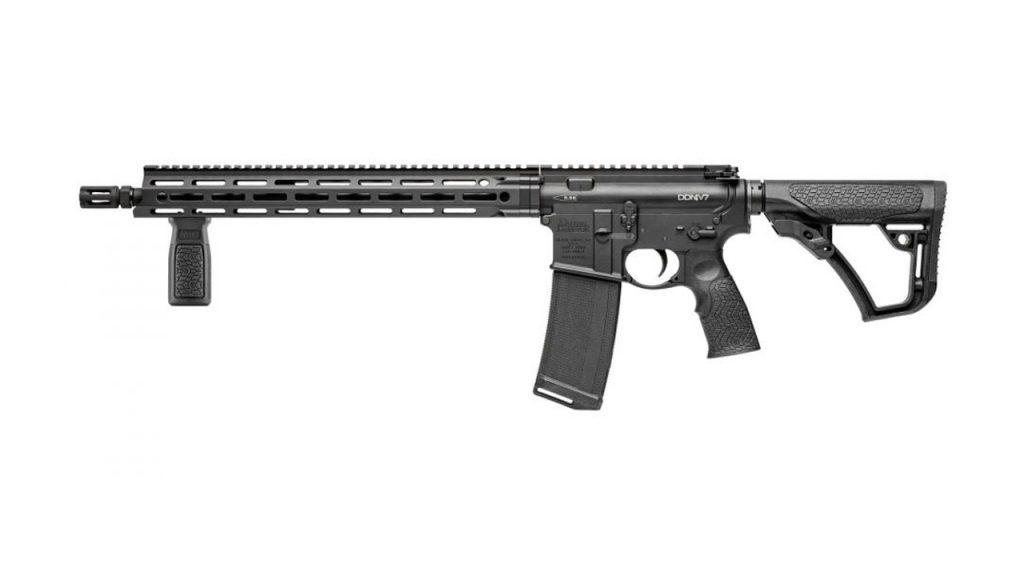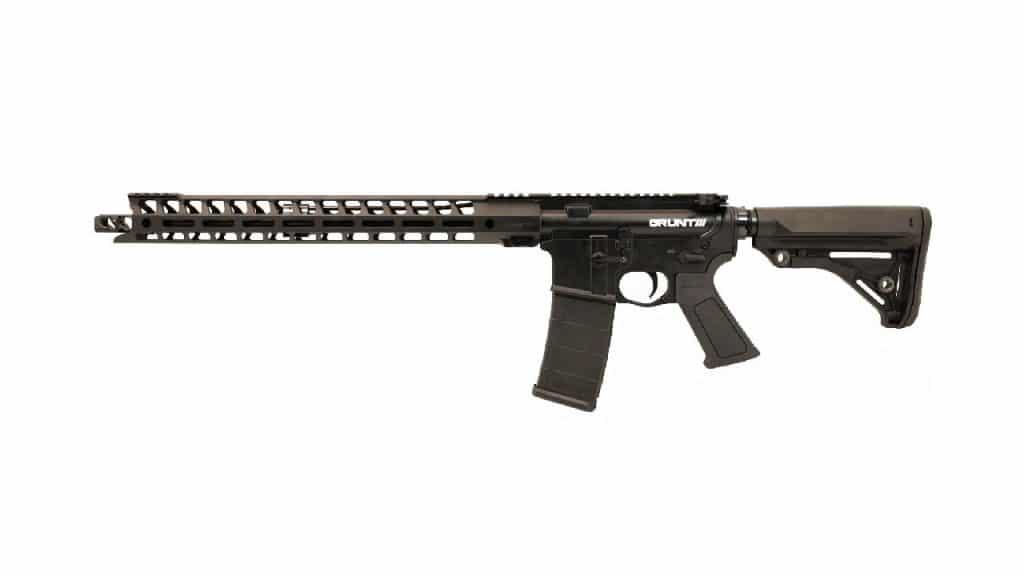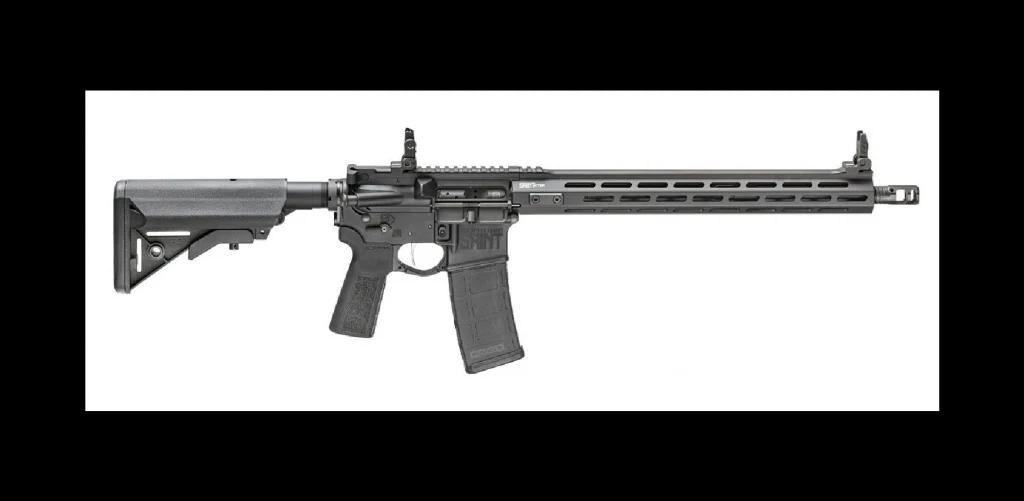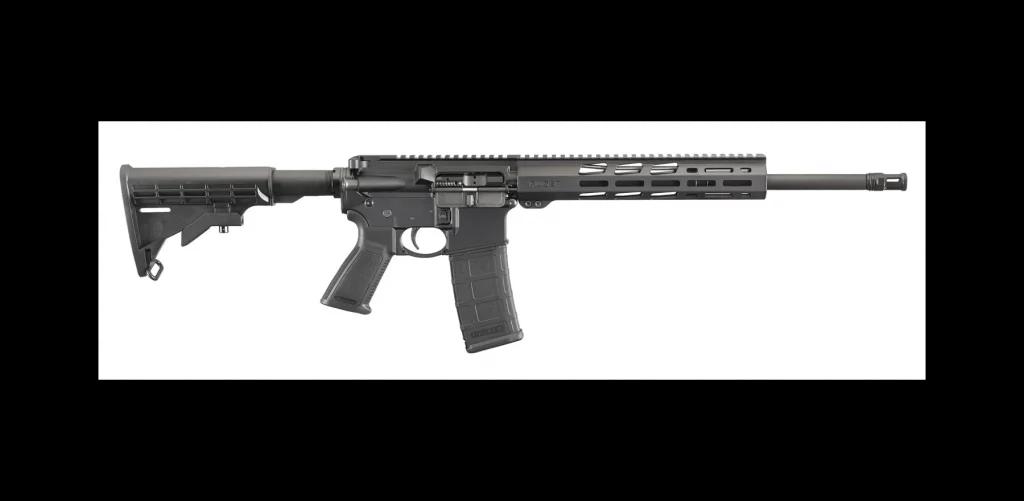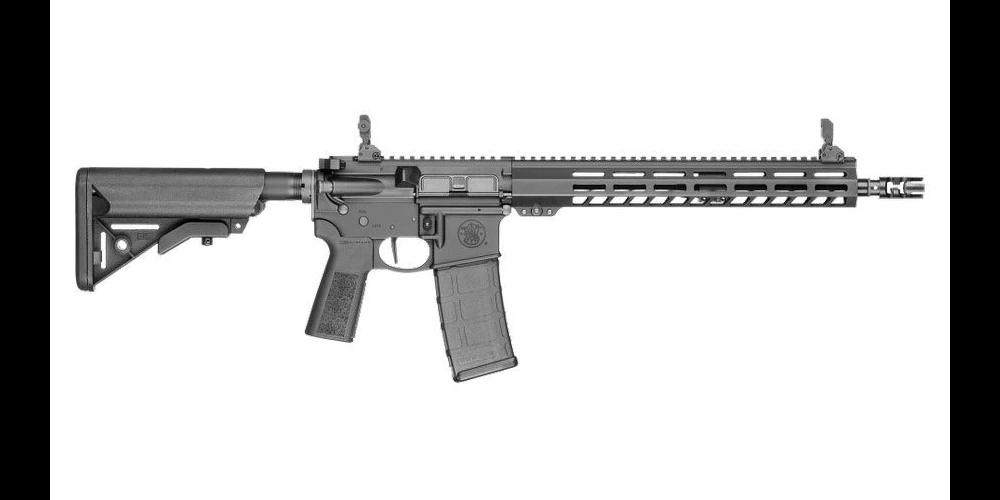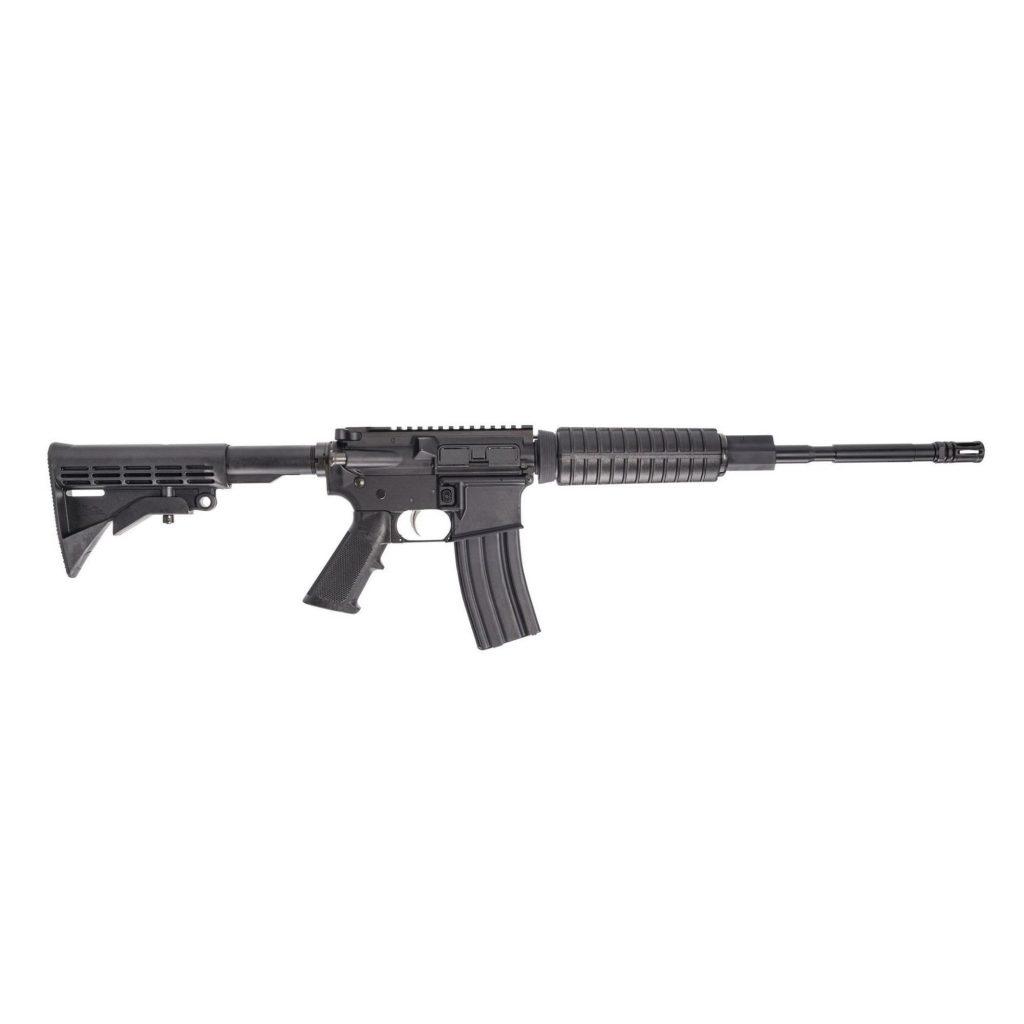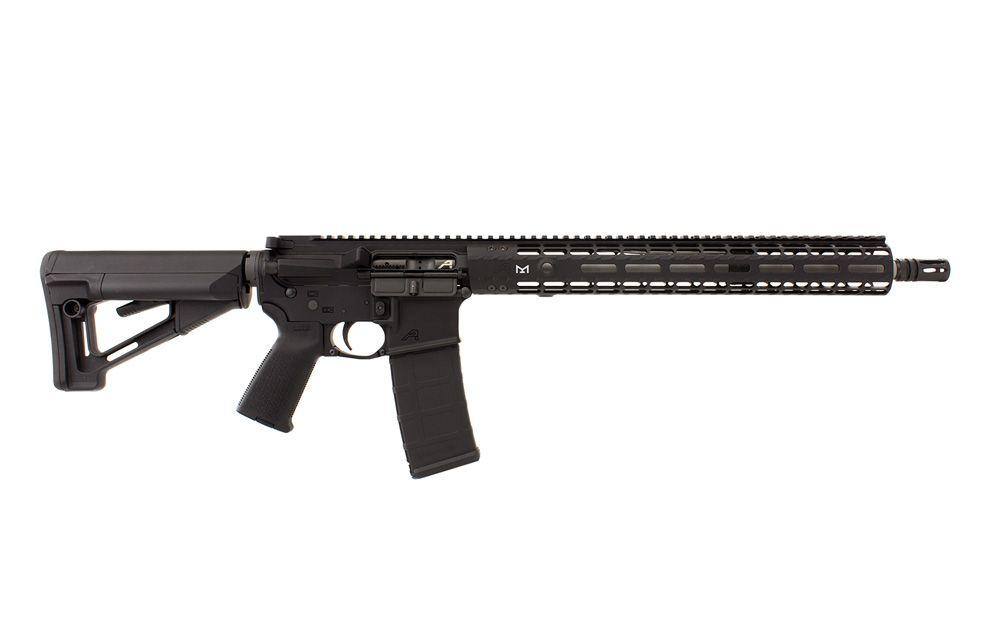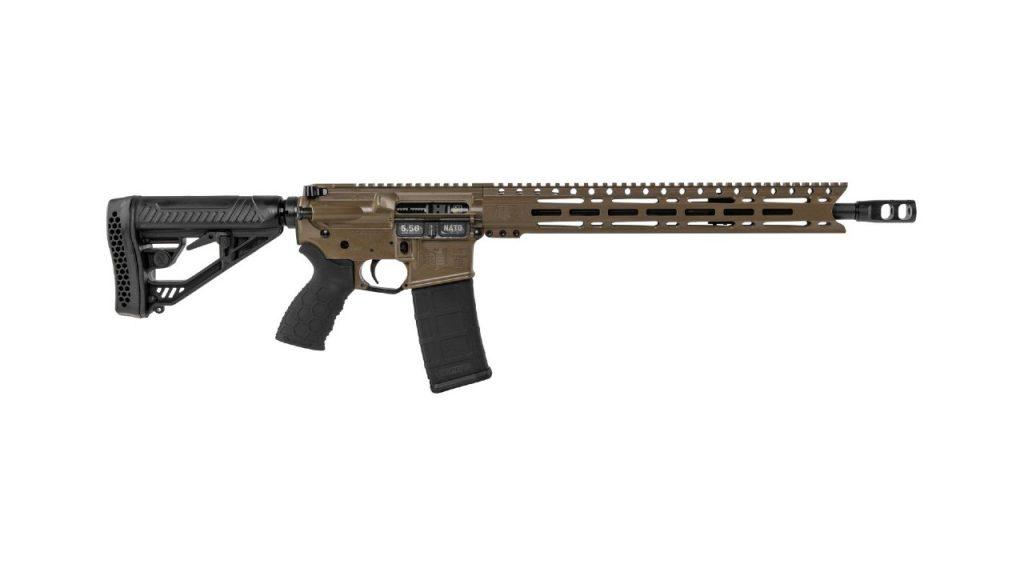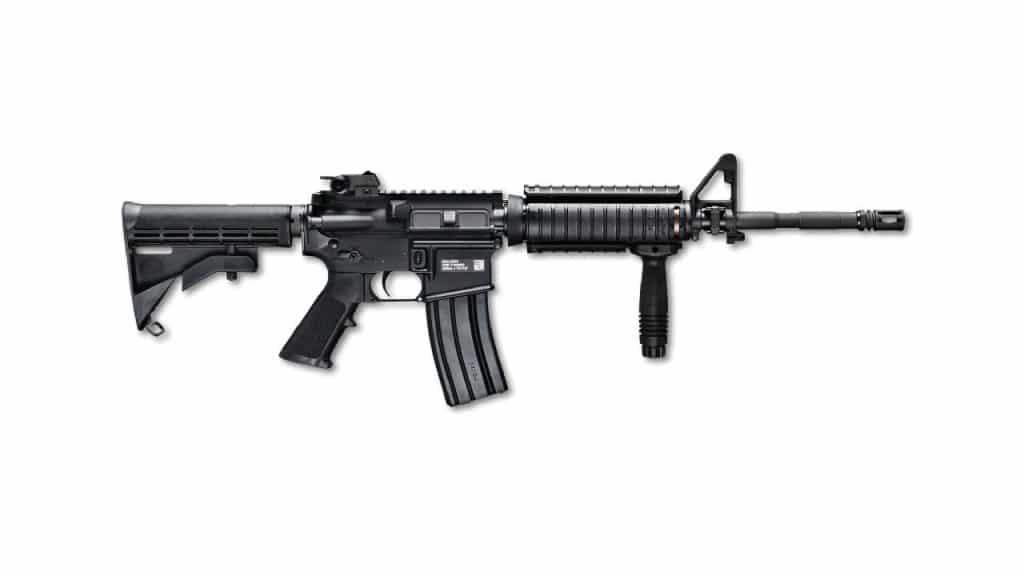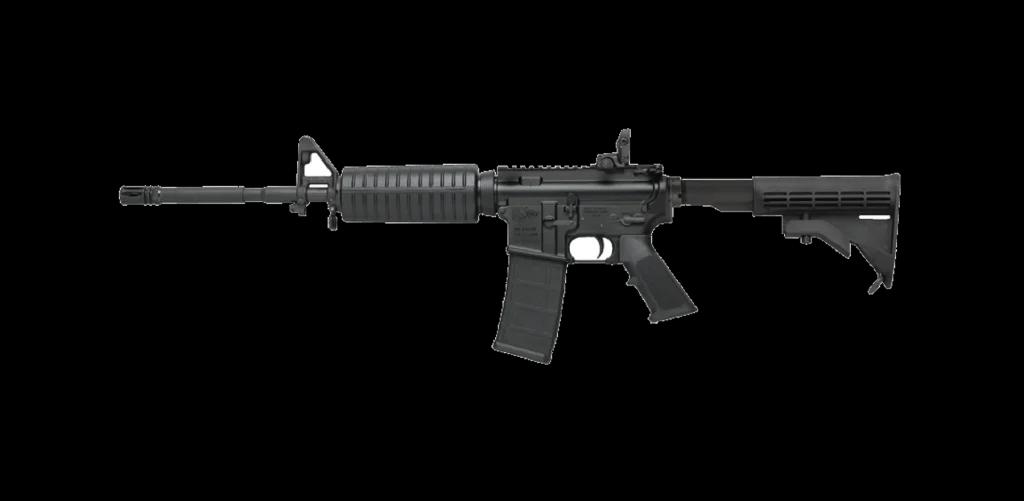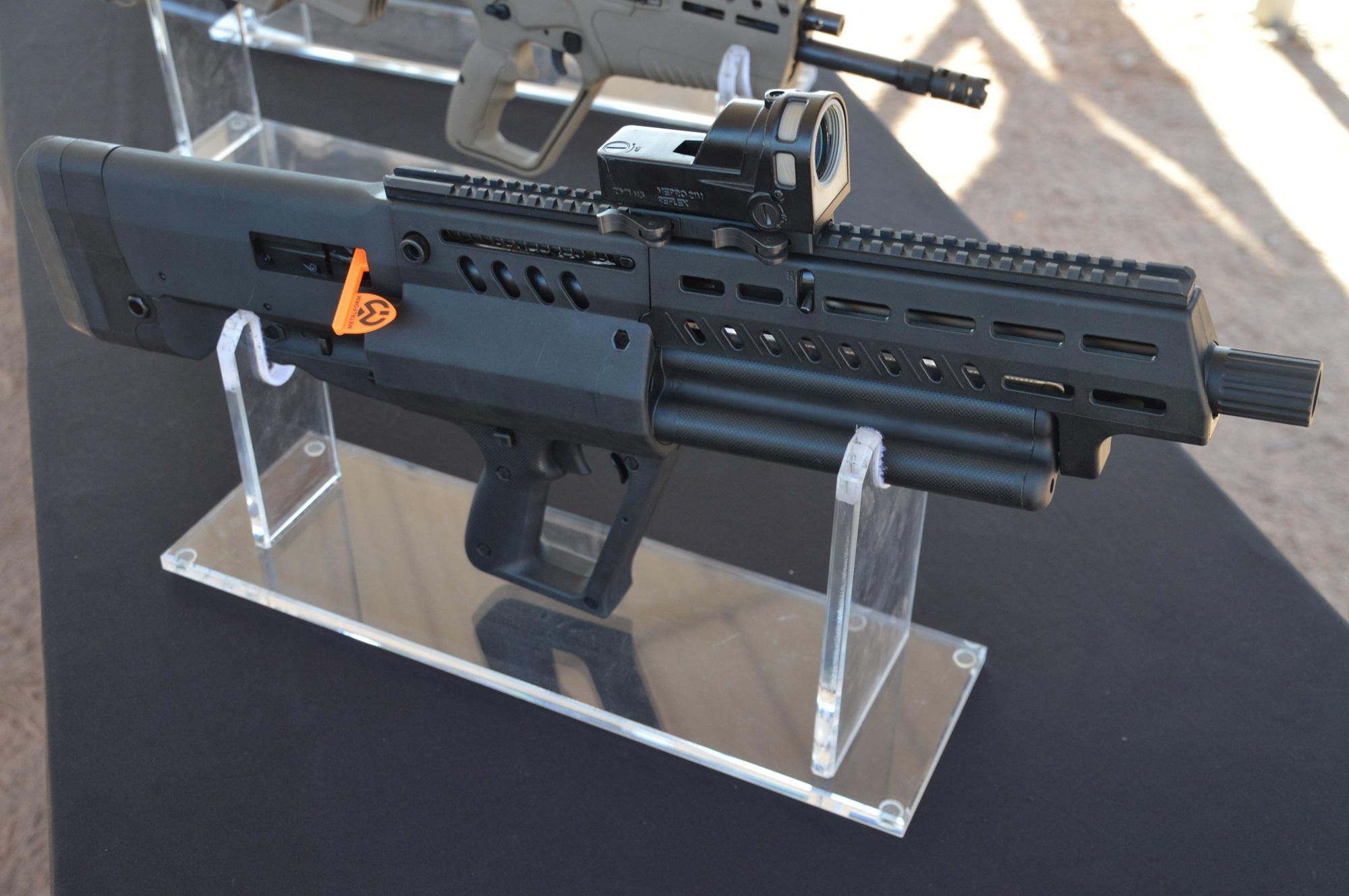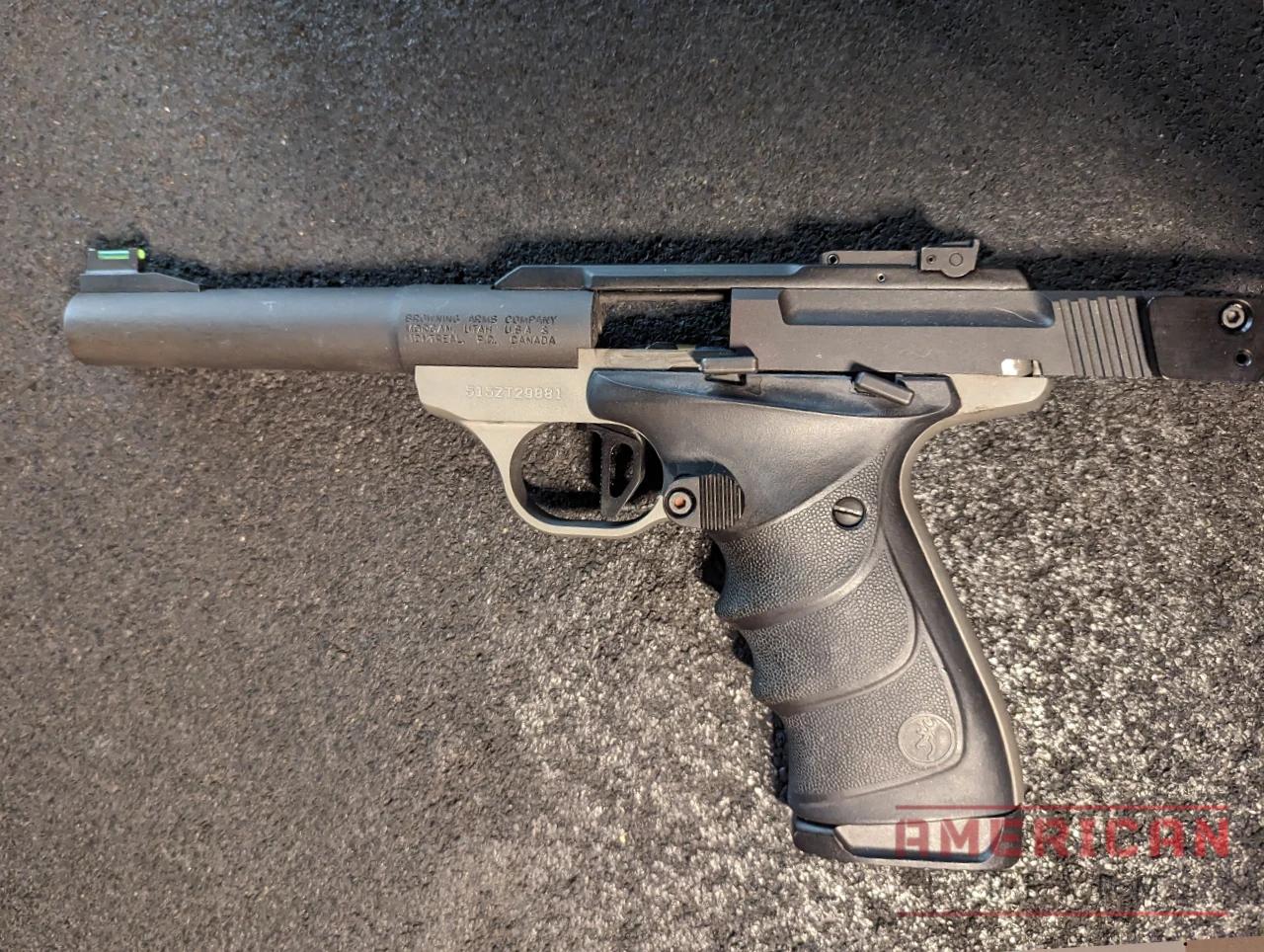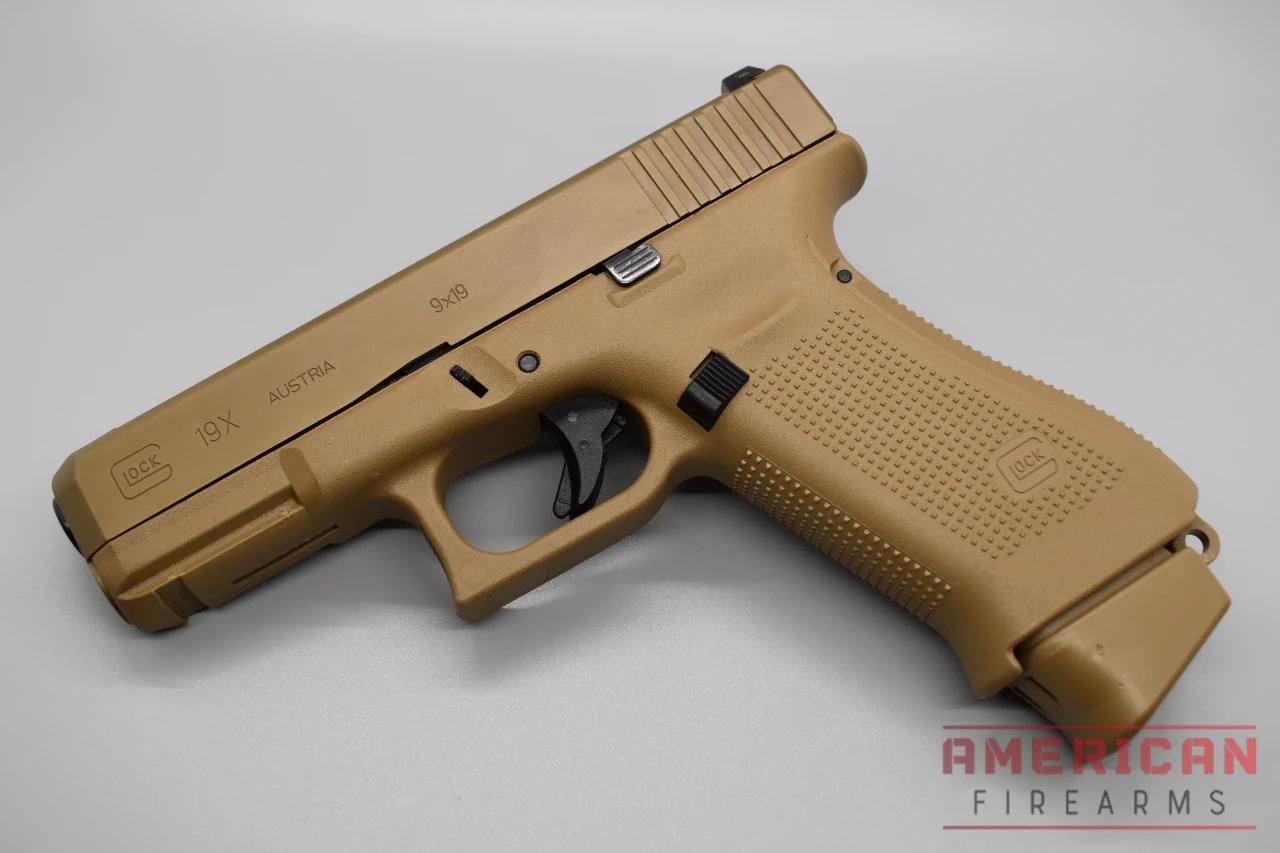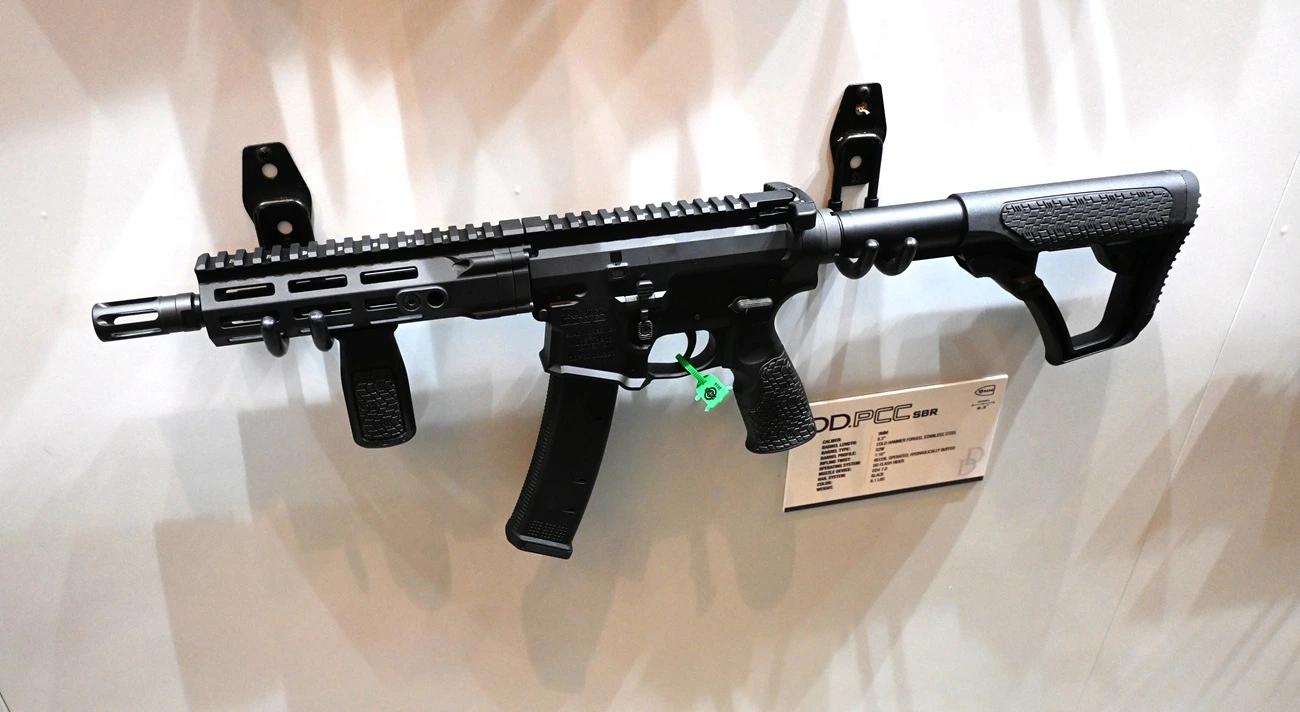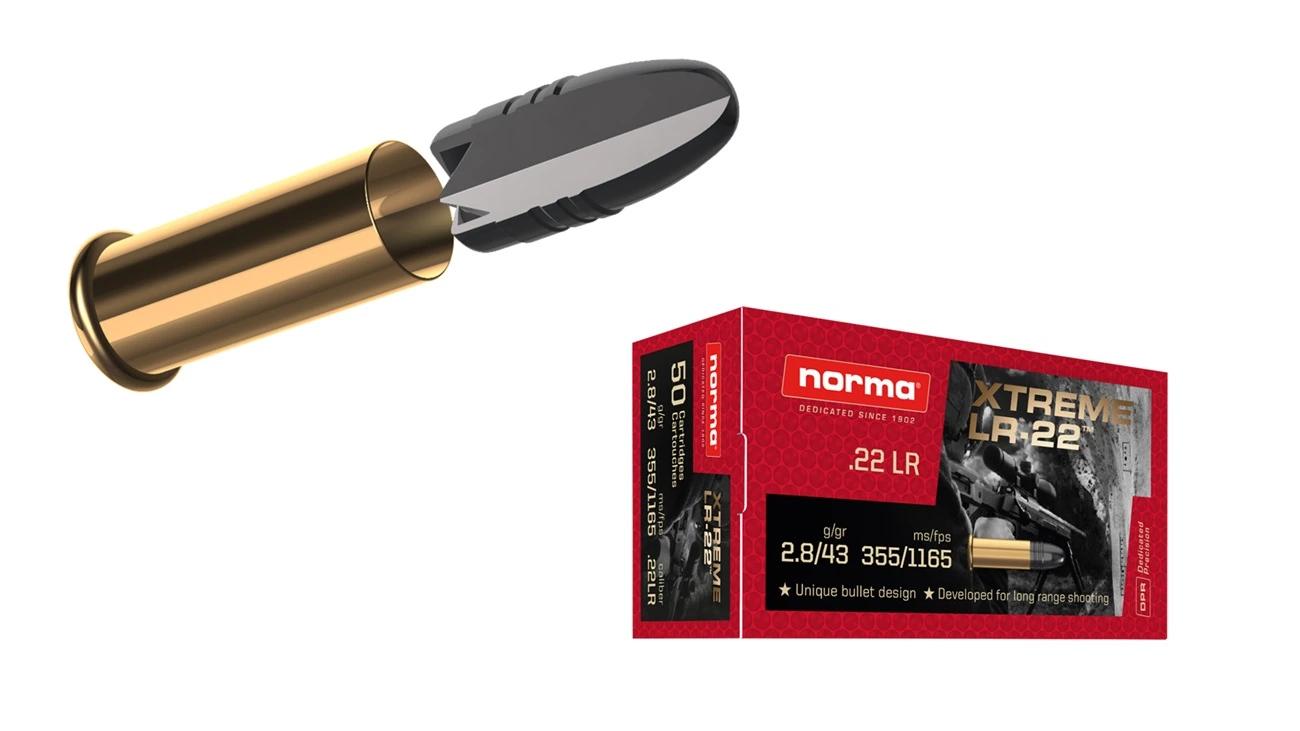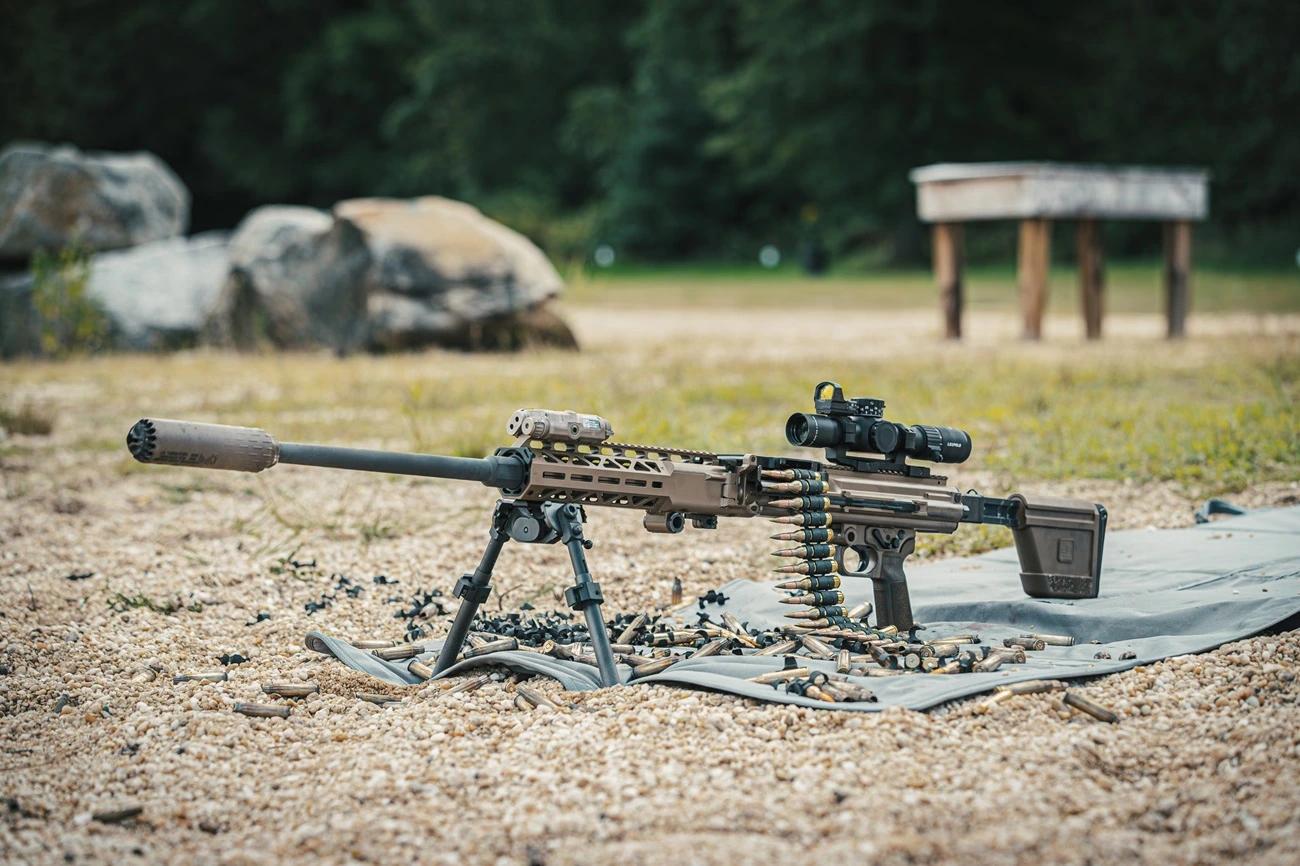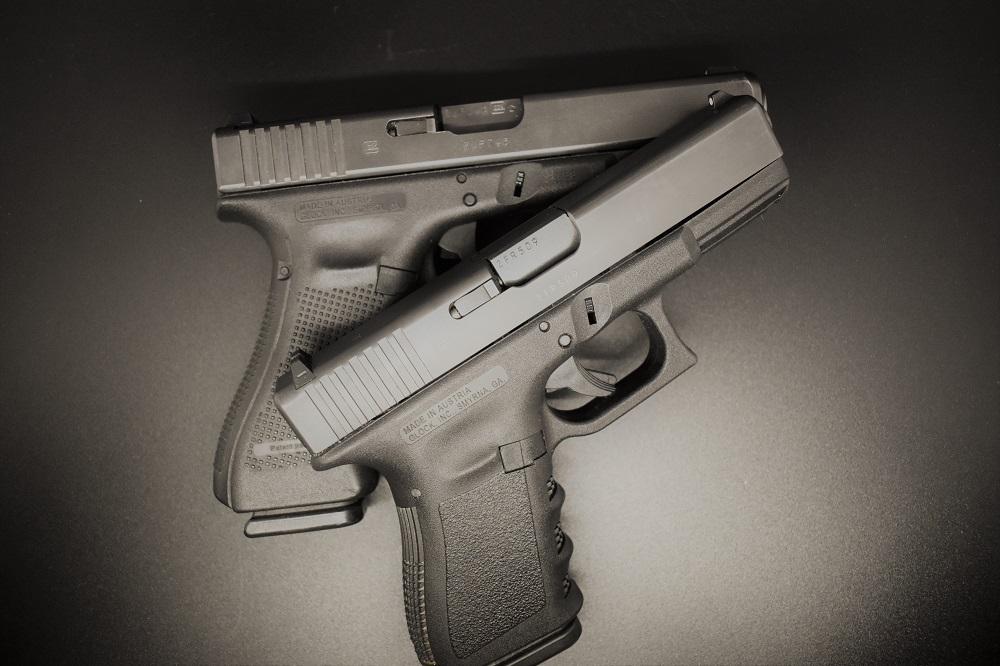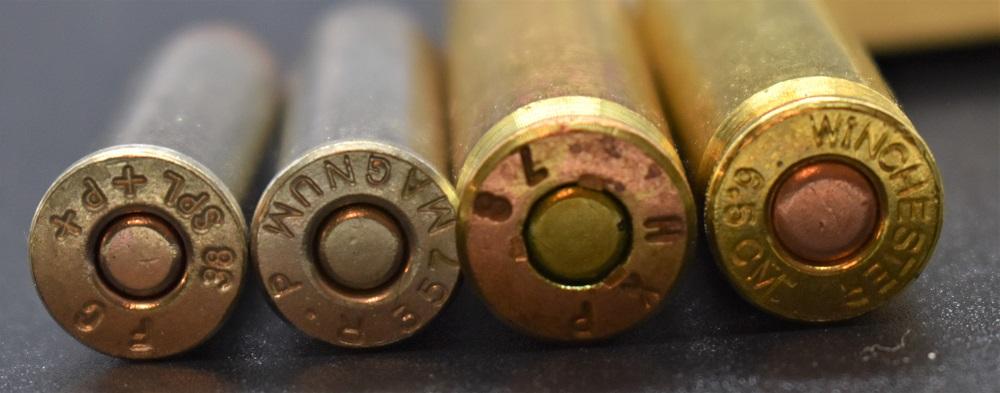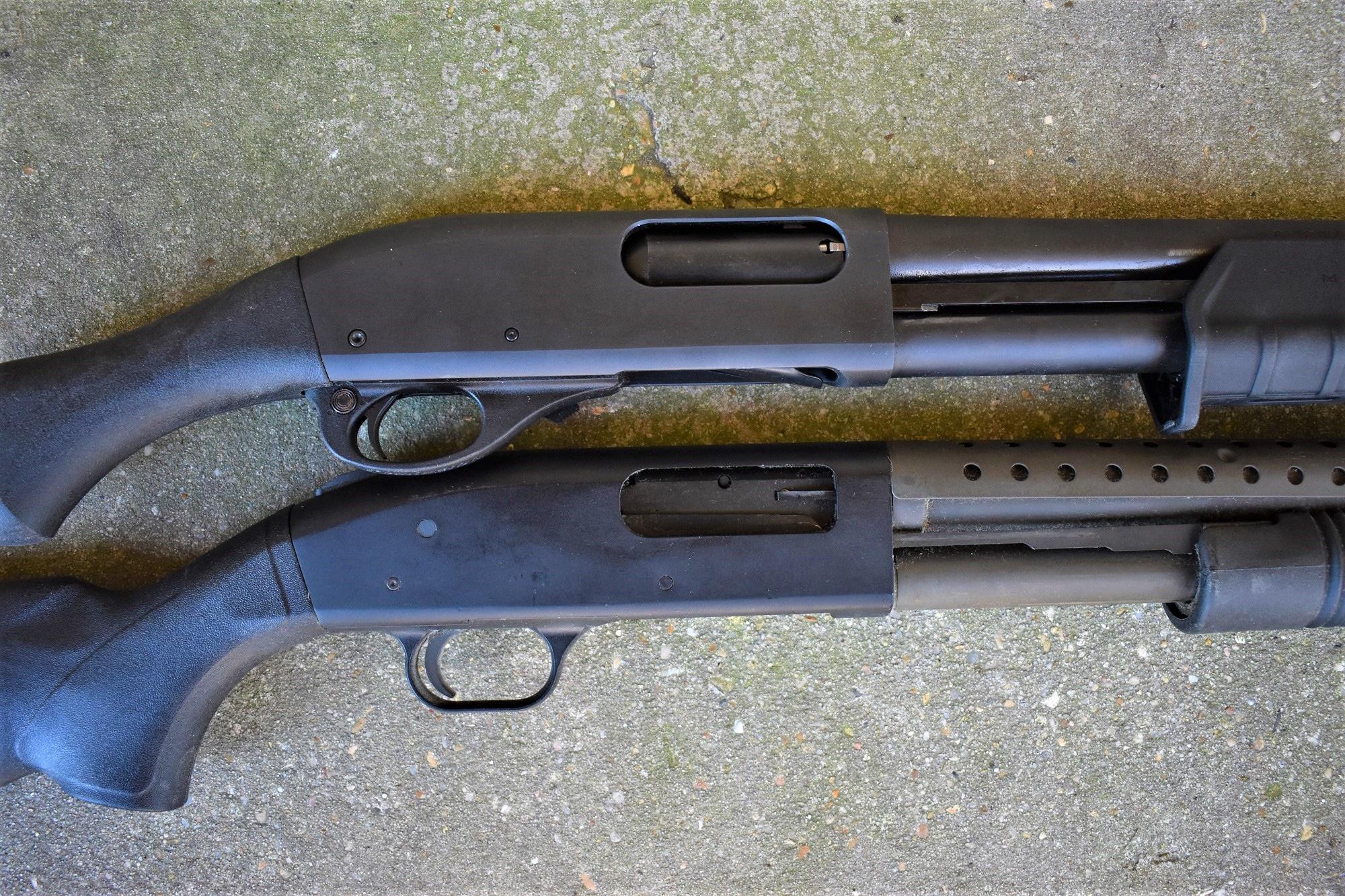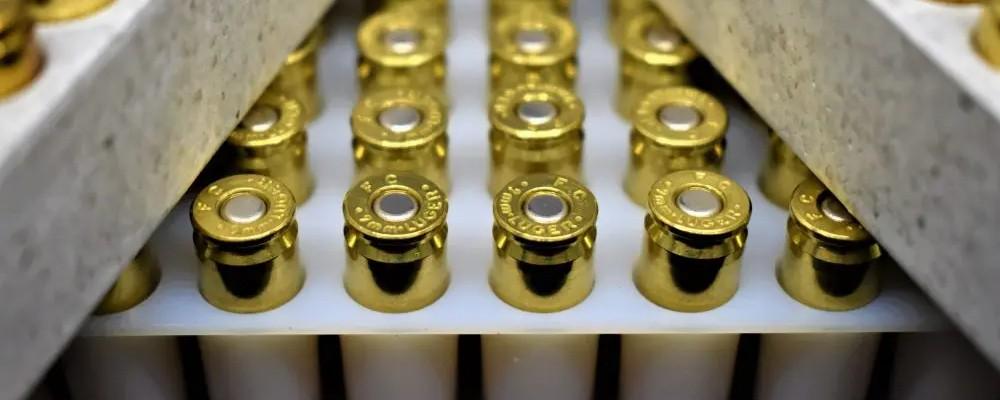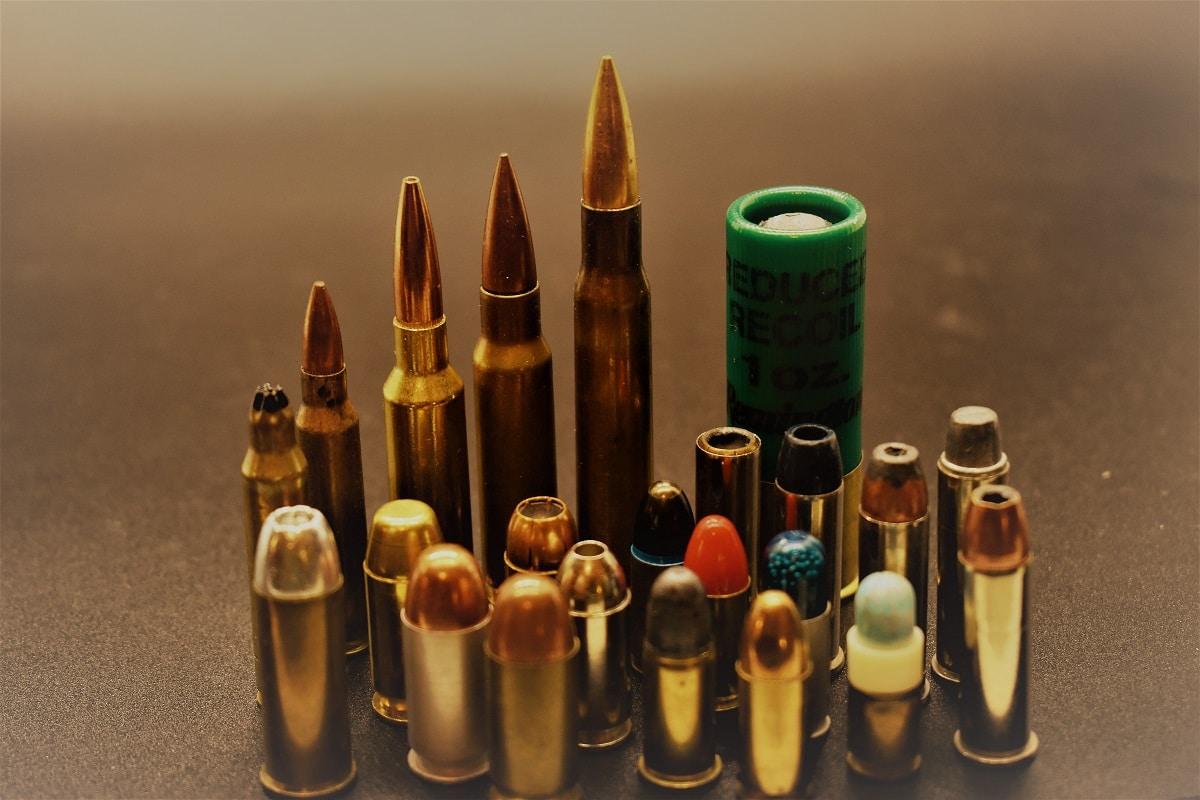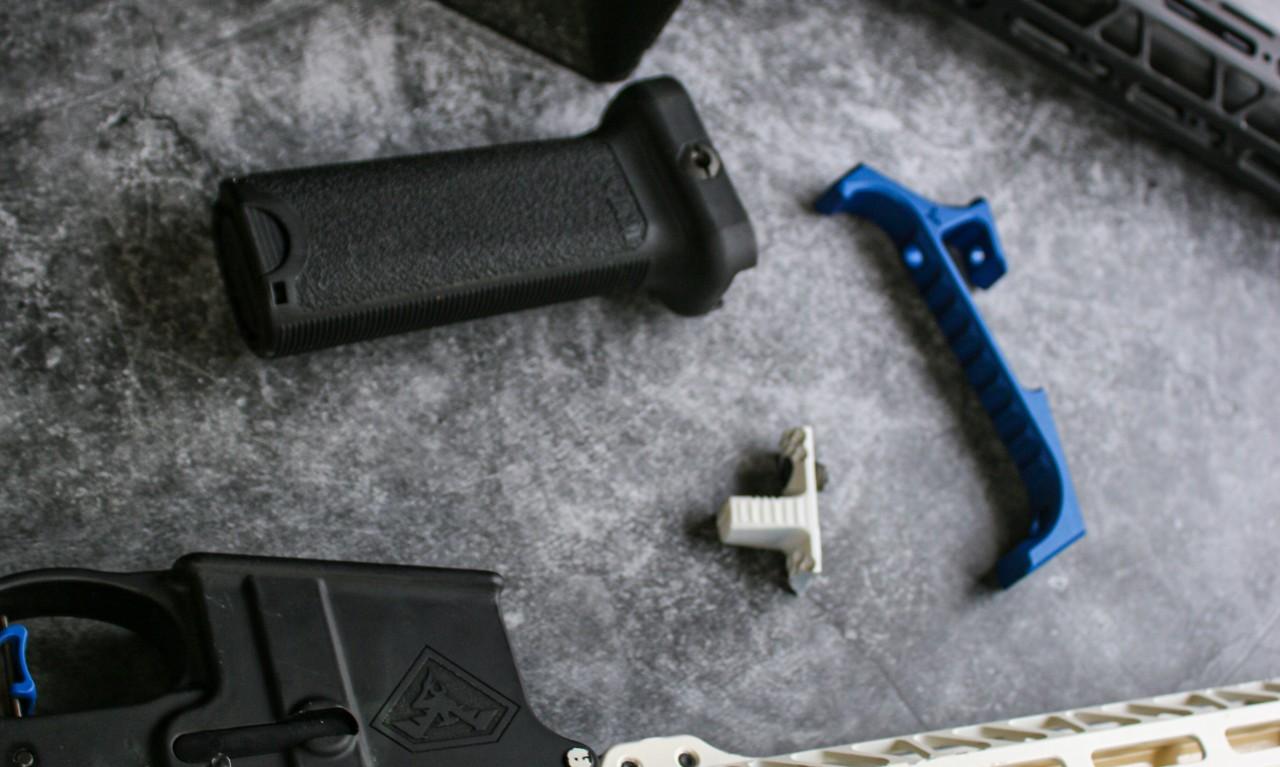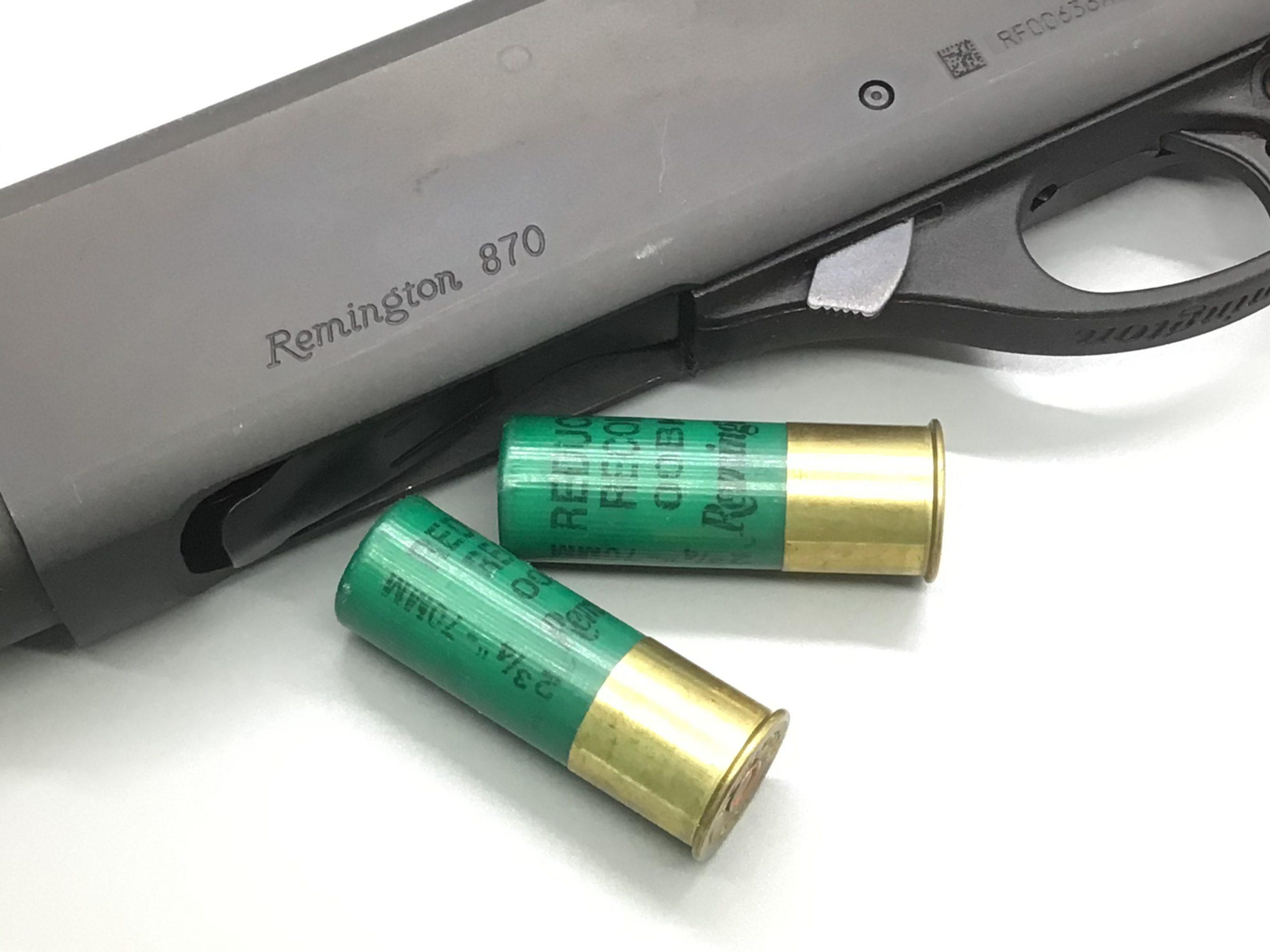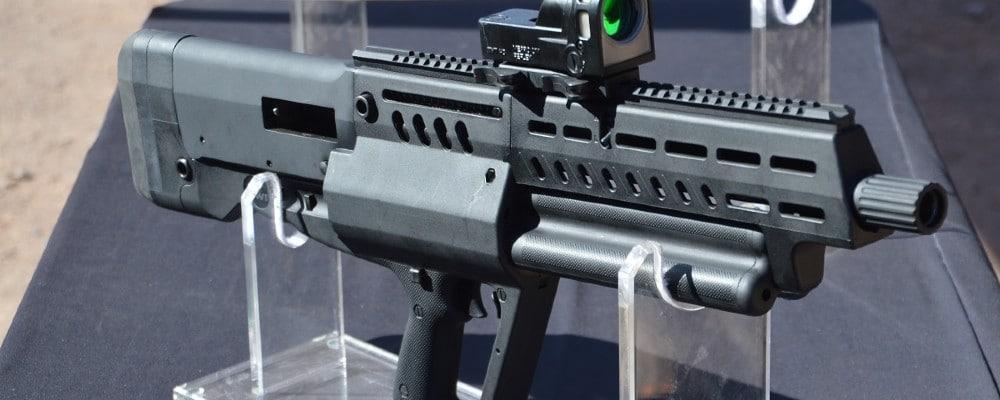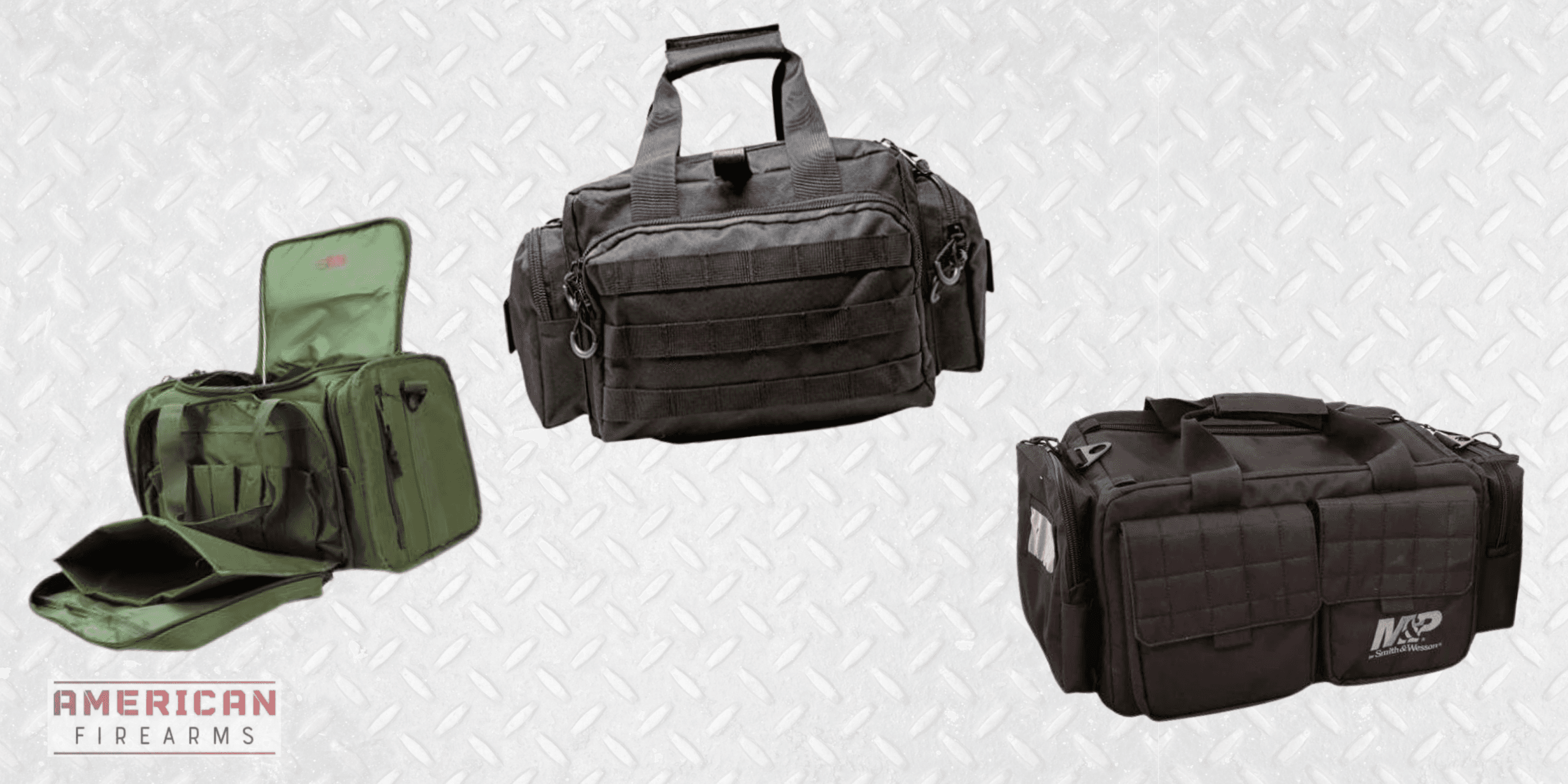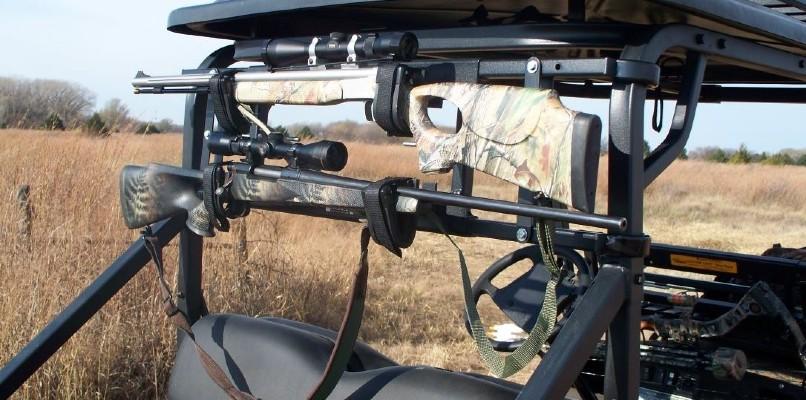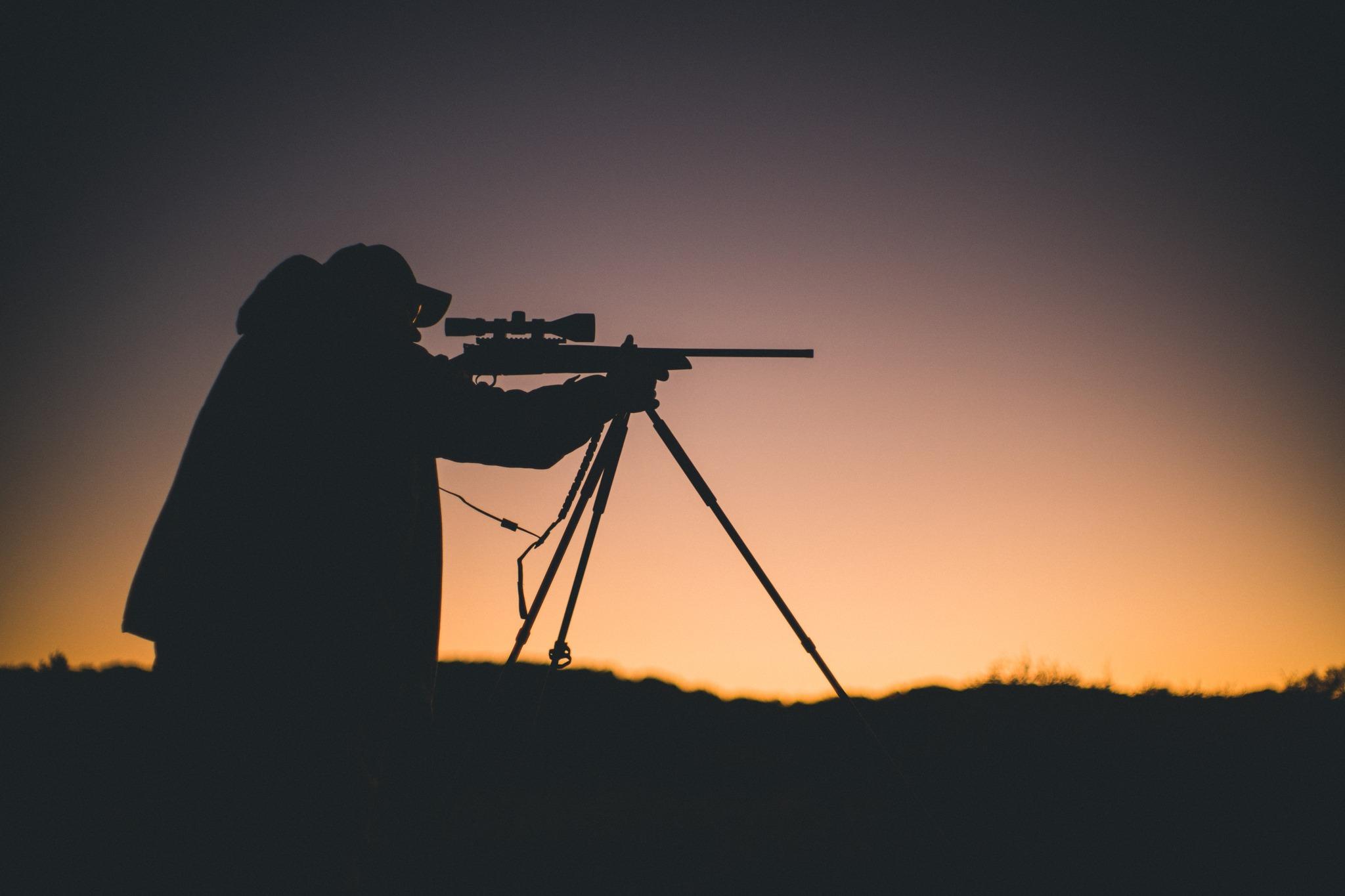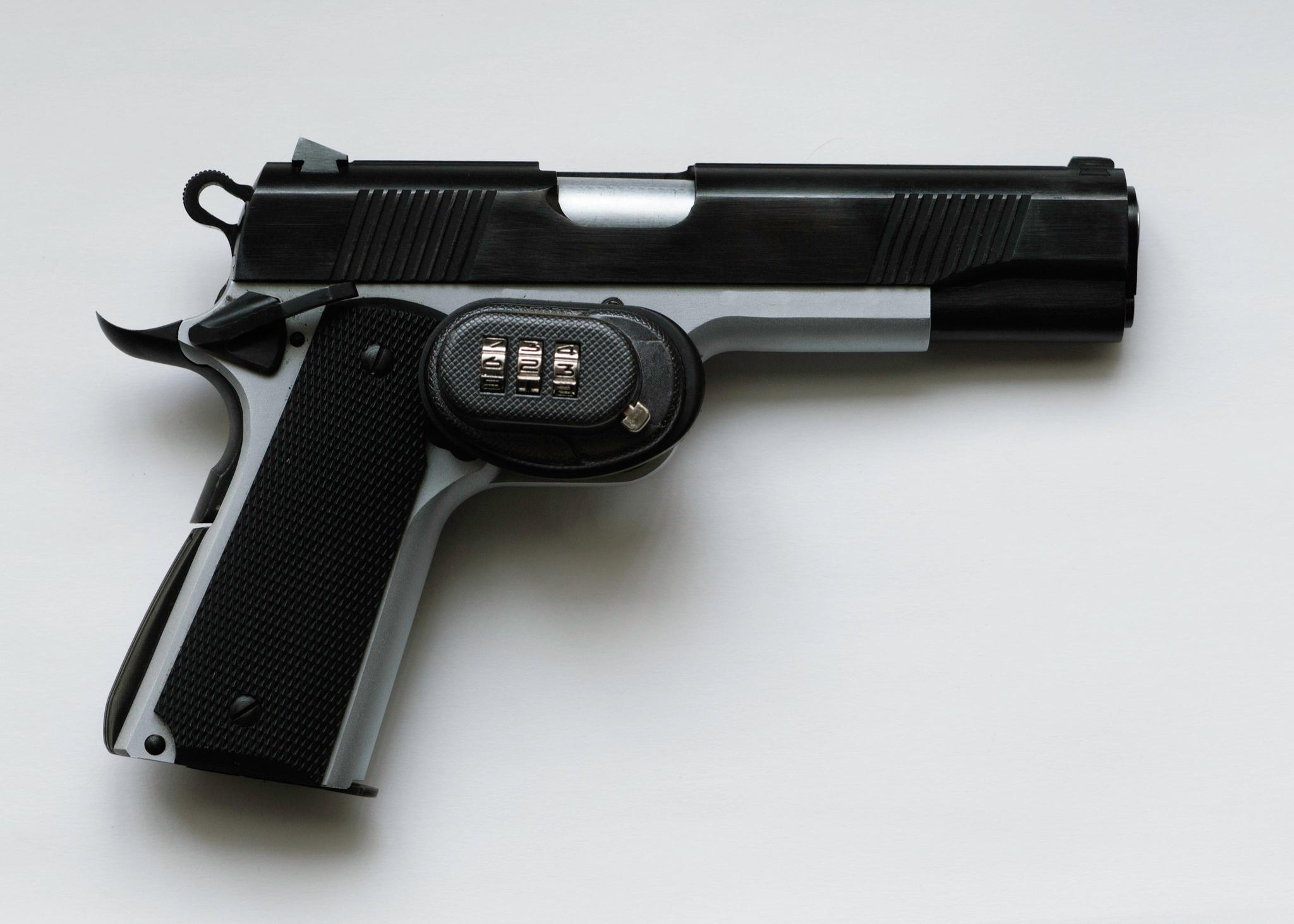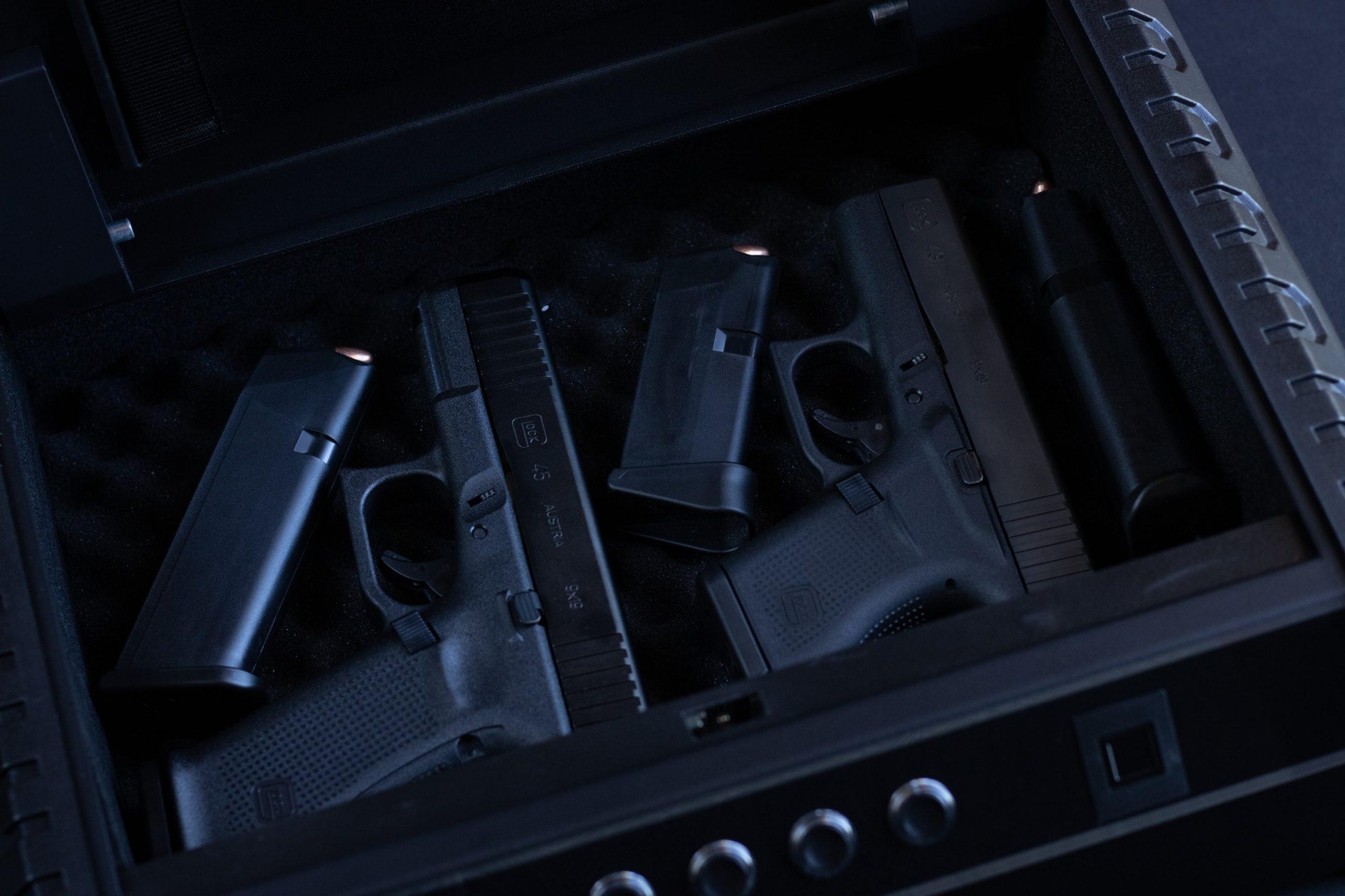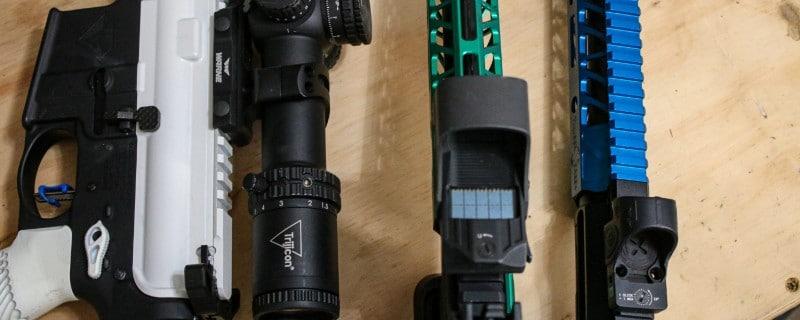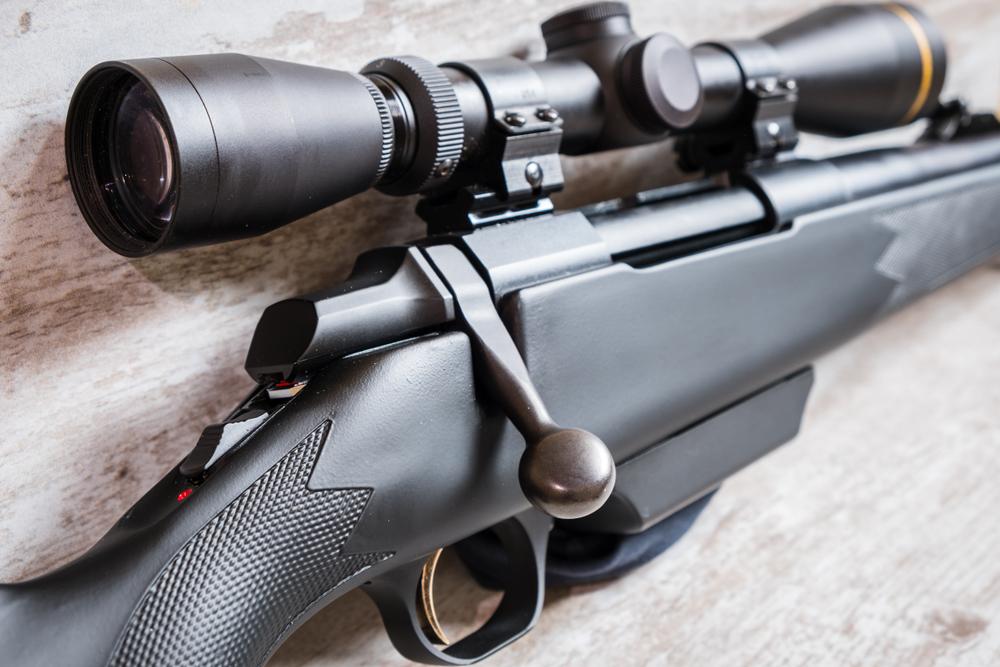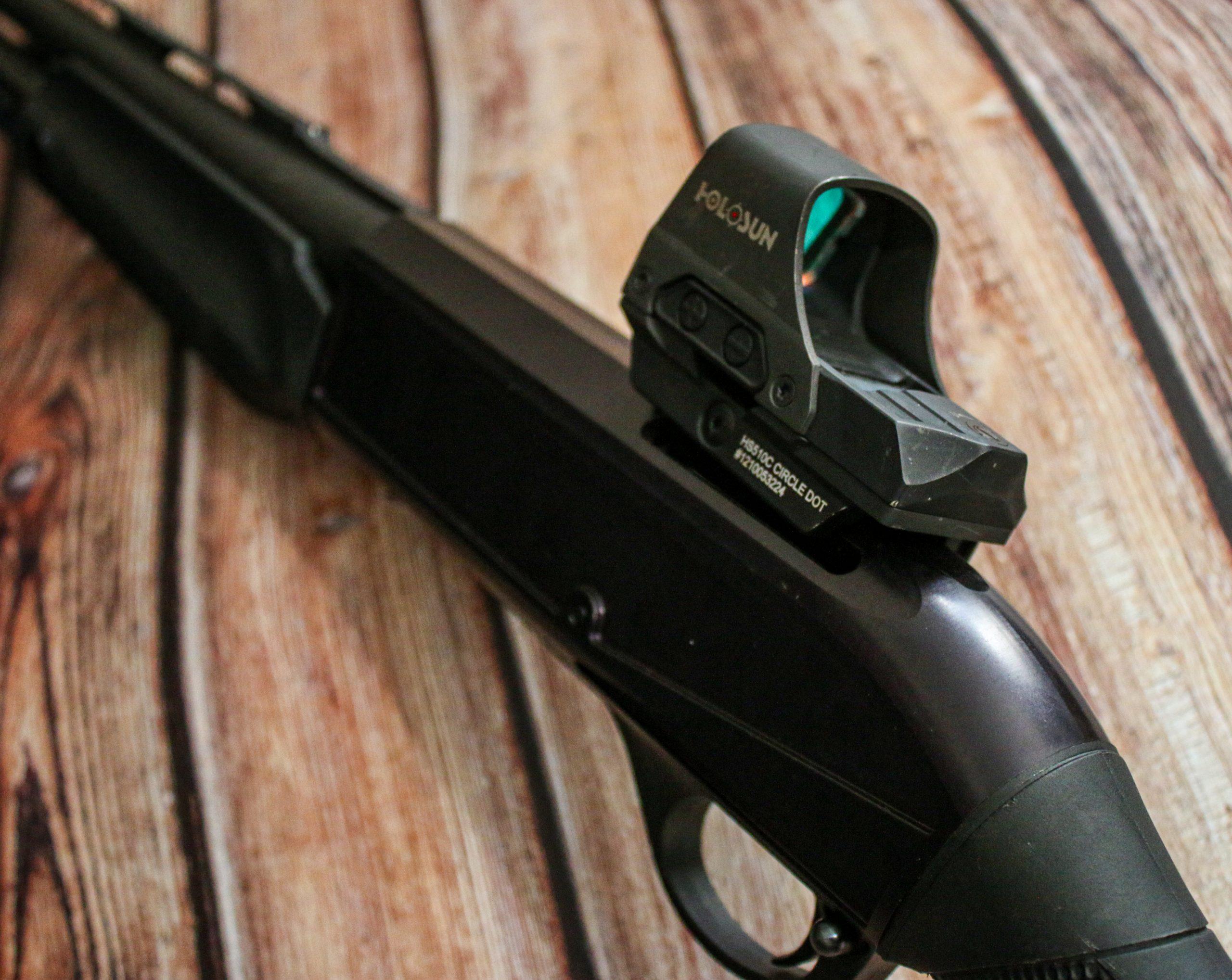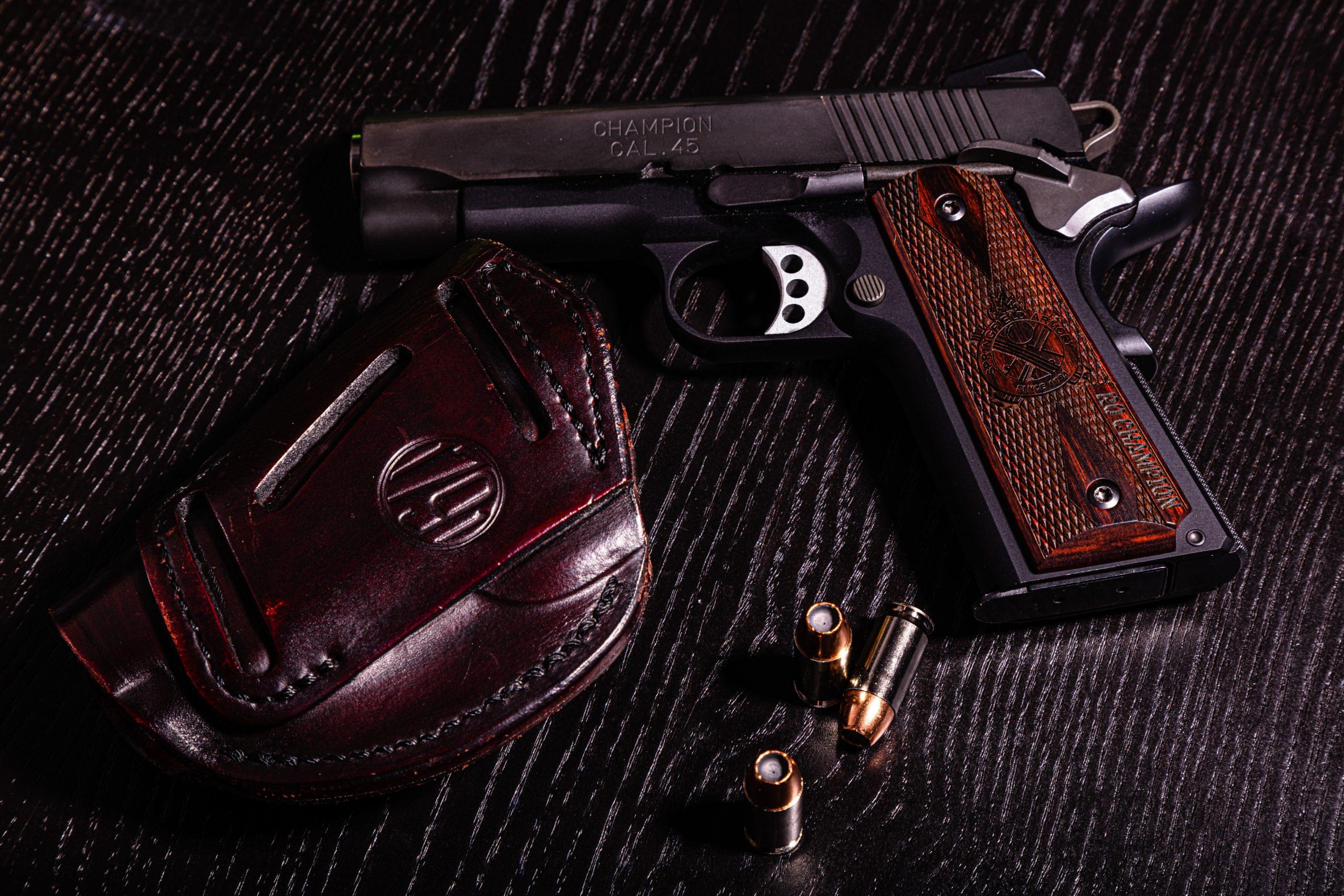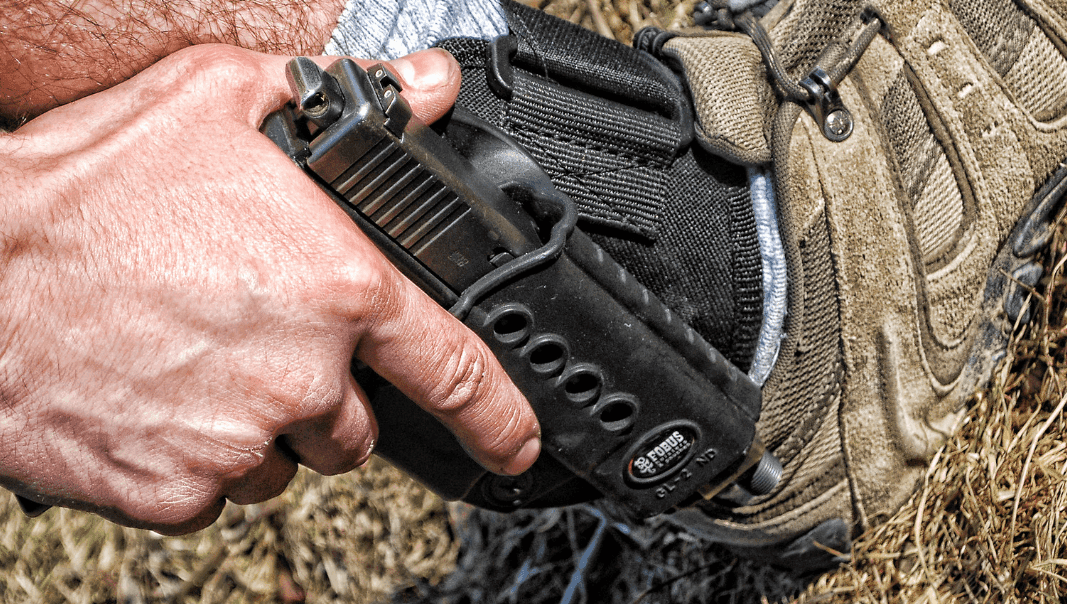Top Best AR-15 Brands: From Beginner To Baller
America's rifle is a universe of performance potential, but navigating the Black Rifle World takes a little preparation to find your perfect AR. We break it all down.
Written By
Kenzie Fitzpatrick
Competitive Shooter
Edited By
Michael Crites
Licensed Concealed Carry Holder
Share:
Products are selected by our editors. We may earn a commission on purchases from a link. How we select gear.
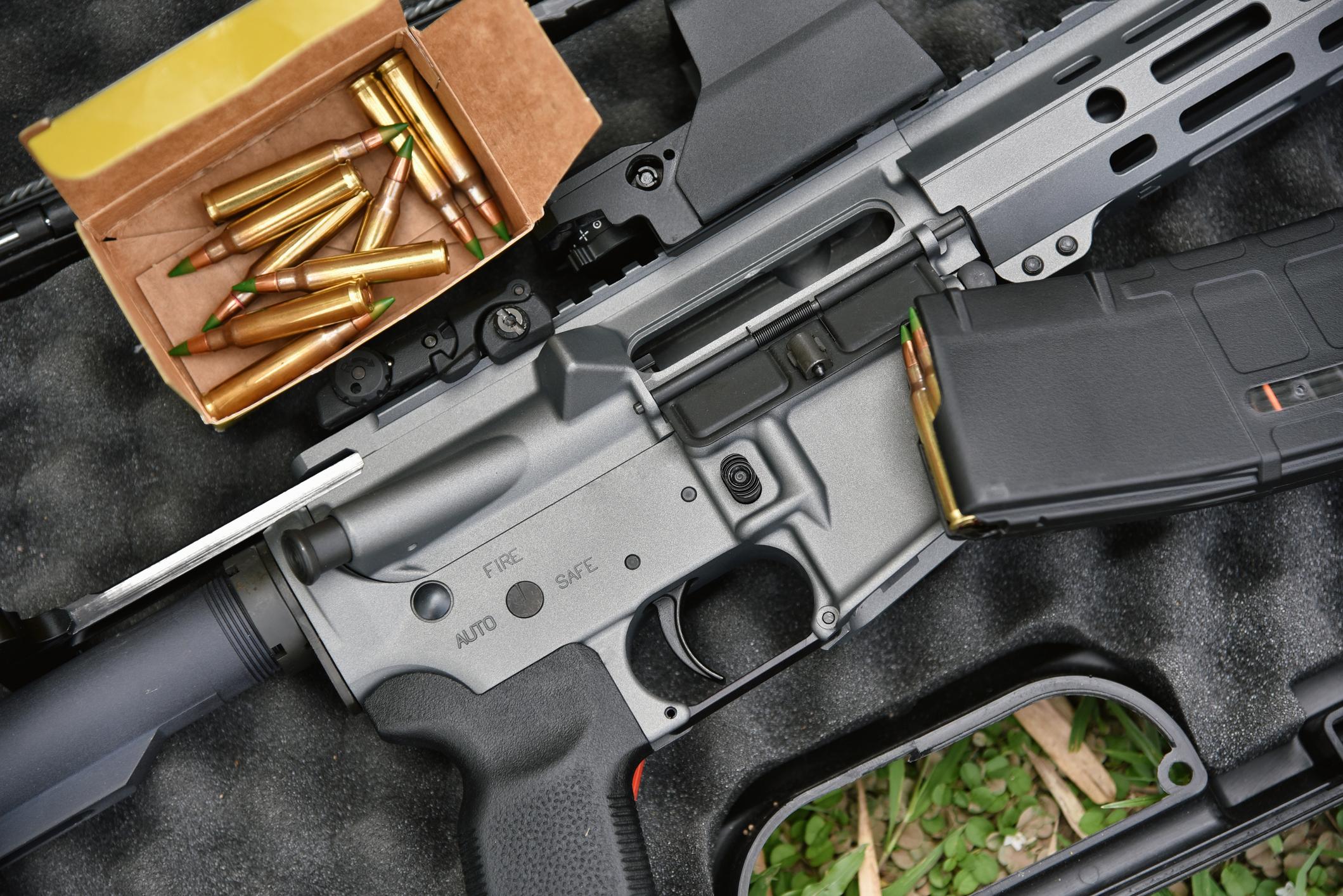
Updated
Jun 2025
After testing over 30 AR-15 rifles across thousands of rounds and consulting with military vets, competitive shooters, and gunsmiths, we’ve created this comprehensive guide to help you understand, select, and master America’s most popular rifle platform.
The Palmetto State Armory PA-15 emerges as our top pick for most shooters, offering an outstanding mix of reliability, accuracy, and value based on our extensive testing. However, your ideal AR-15 will depend on your specific needs, budget, and intended use.
In This Article
Getting Started: Why the AR-15 Today?
Battle-Proven Modularity
By its nature, the AR-15 is lightweight and modular.
The military has fielded various models of the platform over the years in both shortened “Commando” varieties as well as heavy-barreled rifles geared for precision marksmanship at longer ranges.
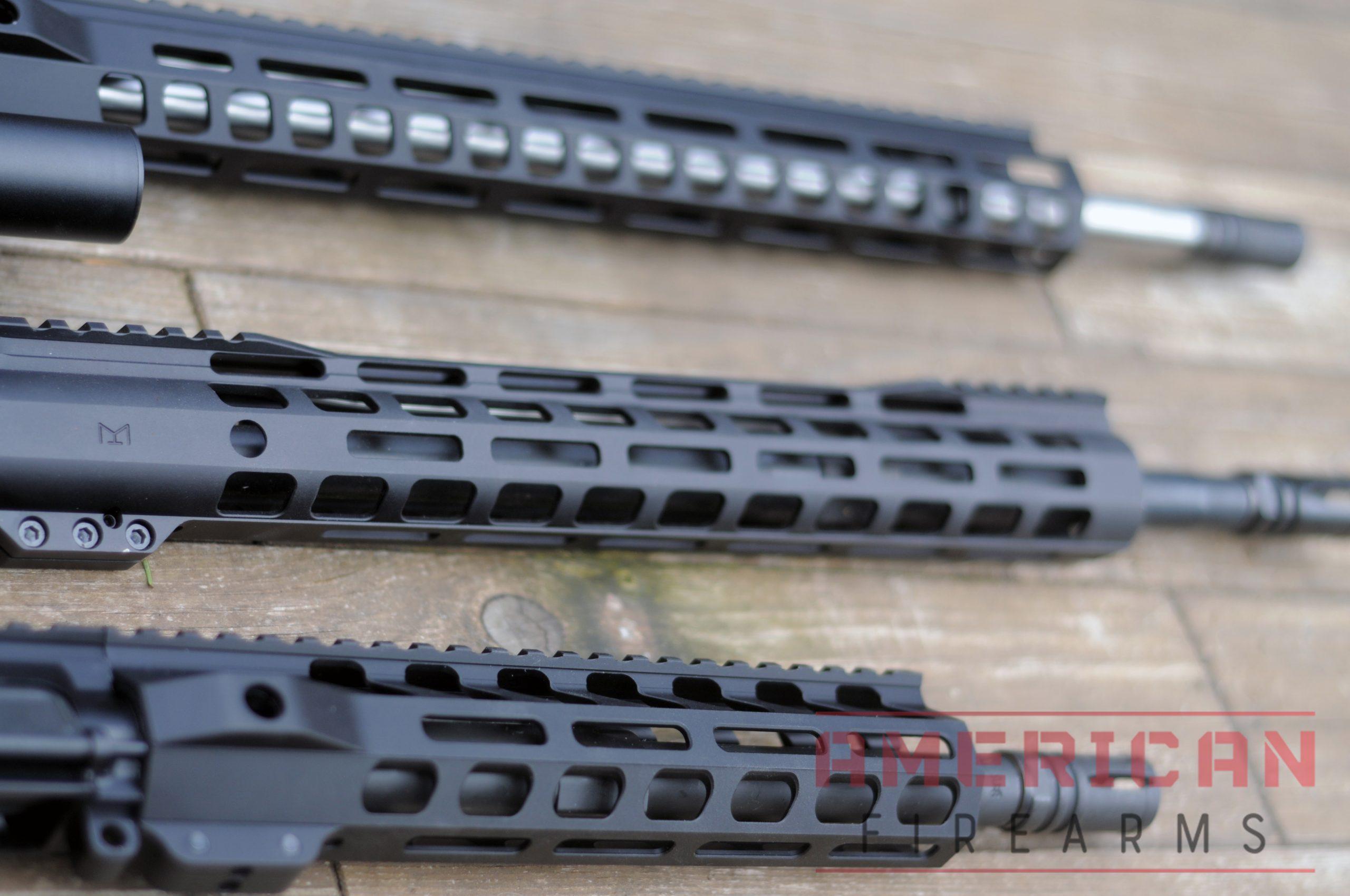
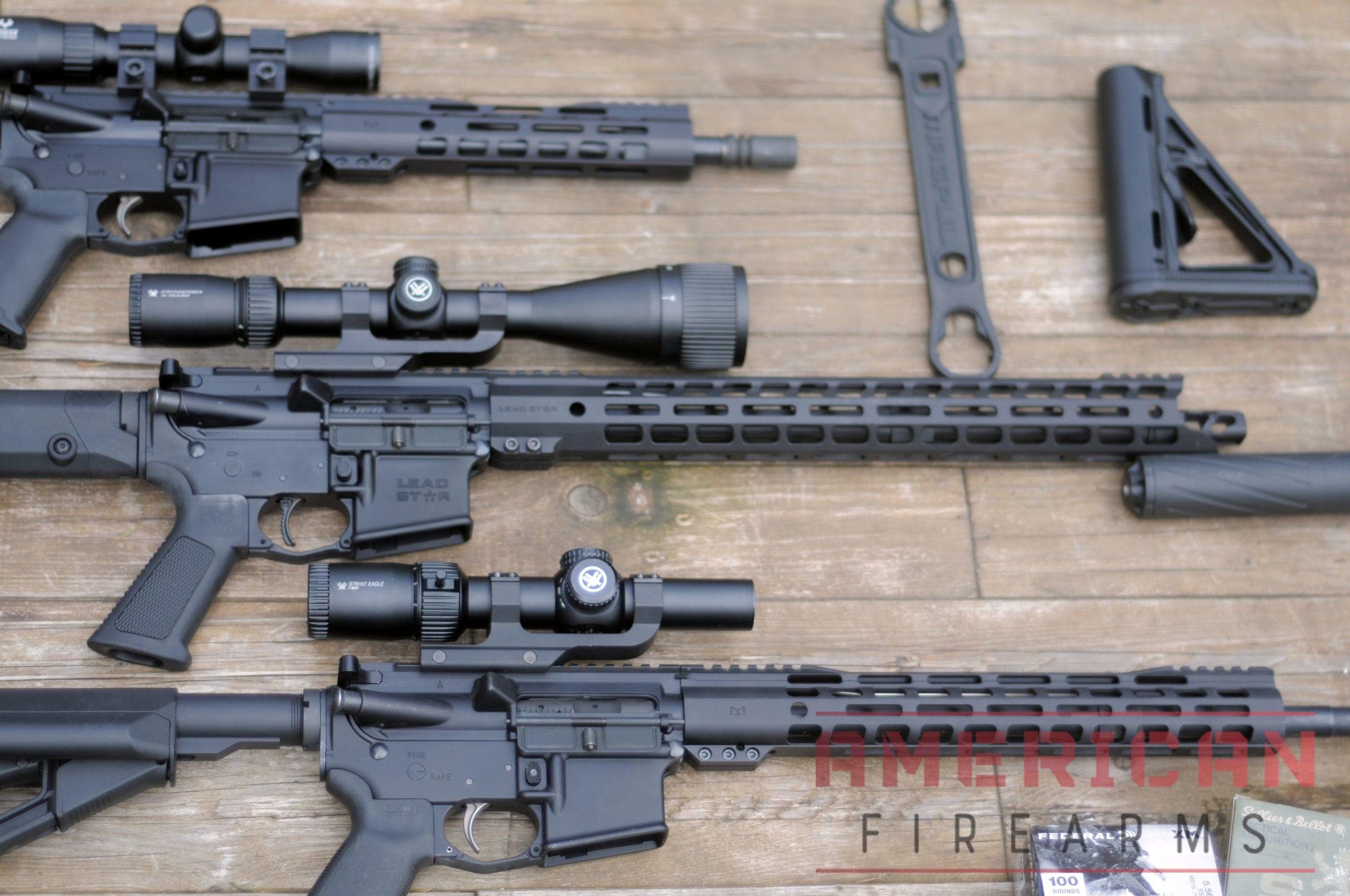
This has had the side benefit of allowing owners whose guns are “banned” under state gun laws to modify their AR to a compliant or “featureless” format that is still legal with little more than some research into basic AR-15 reviews or what AR-15 buying entails.
Massive Aftermarket
With the slate of aftermarket support, you can take your AR in whatever direction you want when it comes to colors, and accessories. and overall configuration.
Today it is estimated that more than 18 million such modern sporting rifles are in circulation among America’s gun owners, a figure that is perhaps underestimated but nonetheless points to how popular the AR platform has become.
This tremendous market means there are many fantastic manufacturers creating niche products designed for every need – everything from small brands knocking out updated mag releases to Magpul’s military-embraced furniture, there’s a product out there for every need.
Added to this are AR-15 and AR-9 style pistols, which are all just branches of the family that are increasingly in demand and generating new product innovations on the daily.
More than 5 Forges
A popular trope among the AR-15 community, as the market has exploded in the past 15 years and now includes dozens of top AR-15 companies along with scores of smaller ones, is that deep down inside, all the rifles have the same heart.
There is no “best budget AR-15” out there – even the top-tier ARs are all cut from the same aluminum cloth, so to speak.
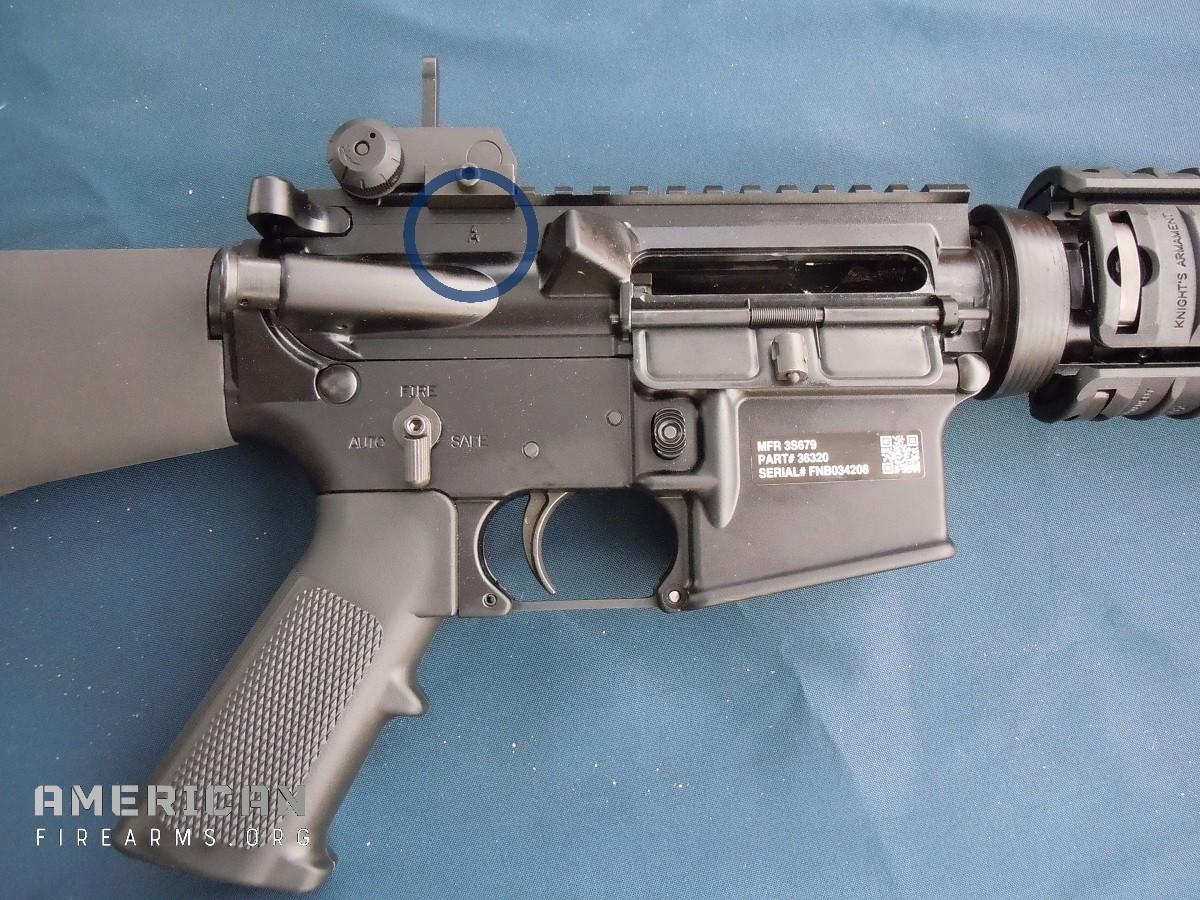
This is because most manufacturers take pre-made aluminum forgings and, after milling them out to finished upper and lower receivers, add barrels, internal parts, and furniture to produce finished AR-15s.
The saying is that “all the AR receiver blanks come from just five forges,” setting up a strawman argument that all AR-15 upper and lower receivers are fundamentally the same when it boils down to it.
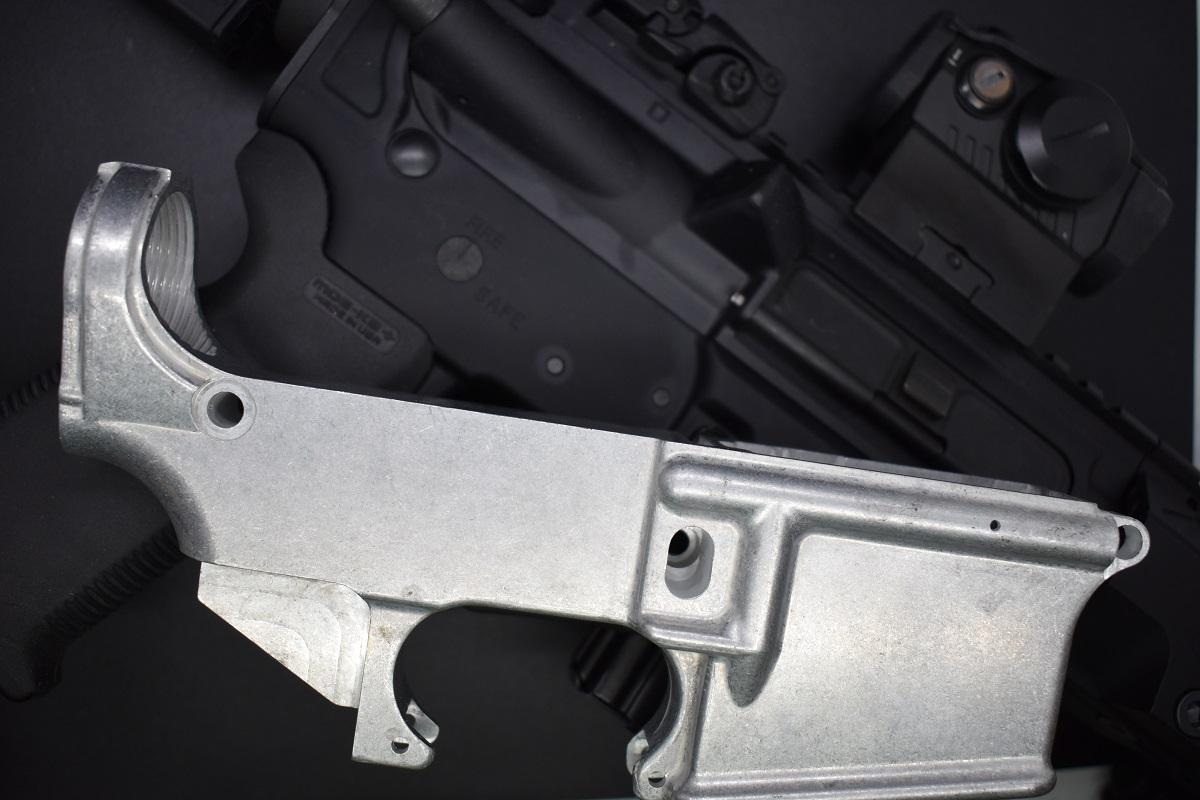
Brands & Manufacturers Add Value
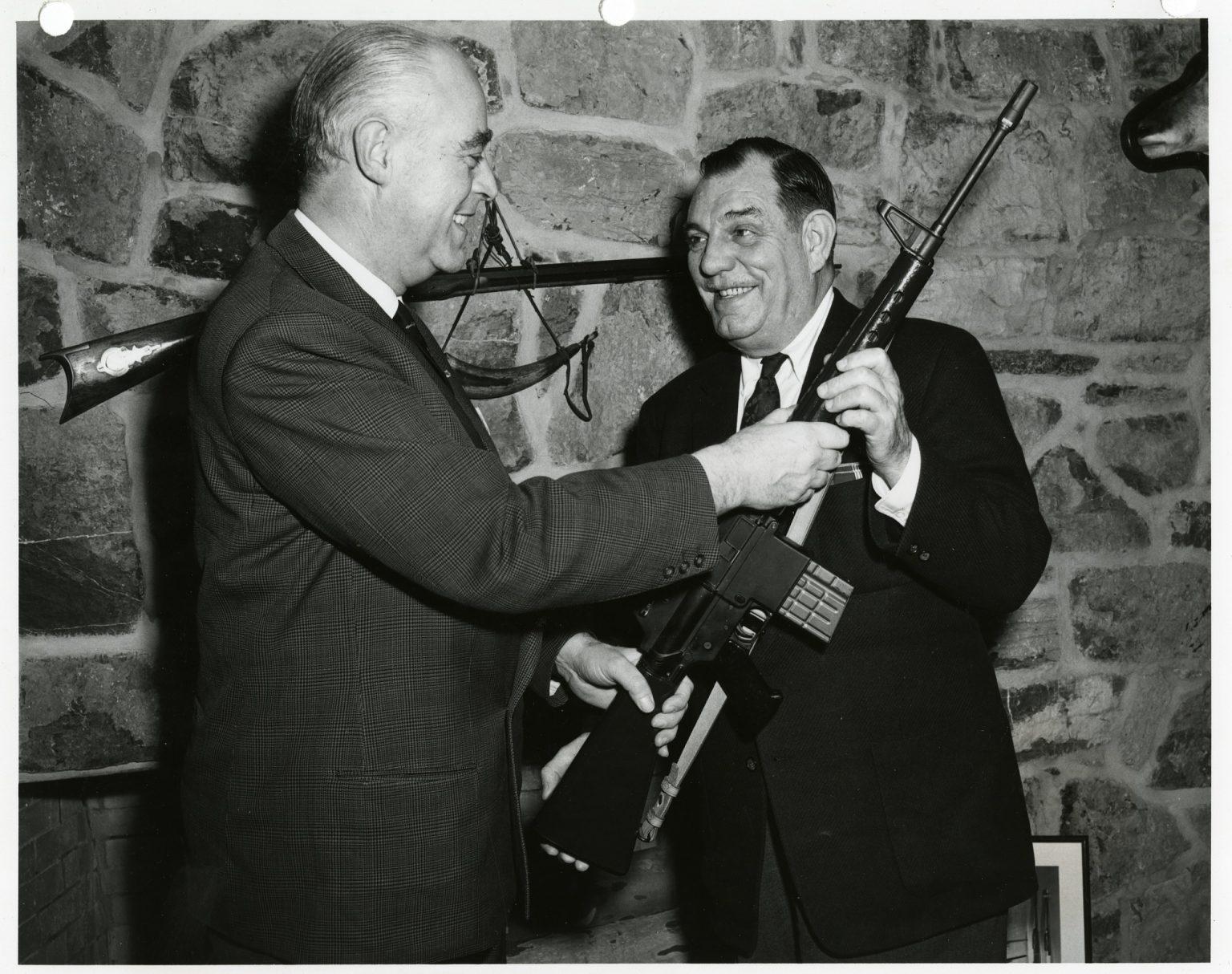
ArmaLite, a subsidiary of the Fairchild Aircraft Company, produced a candidate rifle for consideration, with executive presidents Paul S. Cleveland and Richard S. Boutelle exploring innovative new ways to use the technology brought about by the aviation industry to create firearms.
Early Success
Their initial goal was to focus on creating sporting rifles for the commercial market with the hopes of catching the interest of the military leaders to generate DOD business.
Still, shortly after establishing the company, Armalite was invited by the U.S. Air Force to submit a rifle design to replace their survival rifle, which won the favor of Air Force top brass and ultimately became the MA-1 Survival Rifle.
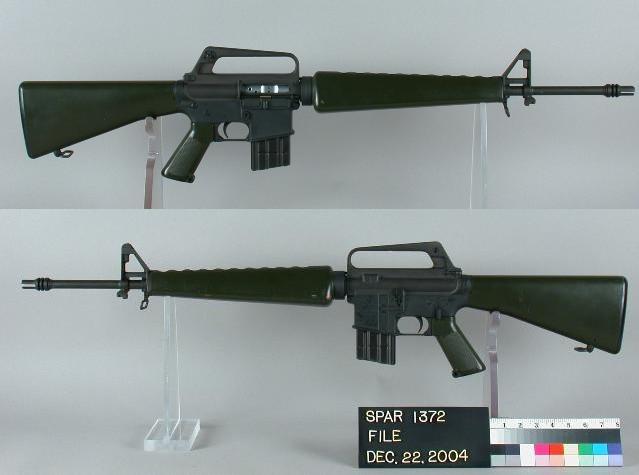
The success of their work with the military prompted Armalite to abandon the commercial market and instead build guns for Uncle Sam.
The company’s top firearm designer, Eugene Stoner, worked with George Sullivan – both an Armalite founder and a chief patent counsel for Lockheed (who was also a life-long tinkerer working on some of his ideas in his own garage) and Chares Dorchester, one-half of Armalite’s founding duo, to create a 7.62 NATO-caliber battle rifle for an Army small arms test, the AR-10 (ArmaLite Rifle Model 10 – “Armalite Rifle” being the “AR” in “AR-15” – not “Assault Rifle” as is often erroneously claimed.)
This new design used a two-piece aluminum receiver, the latest technological advancements in plastics and alloys, and an action that incorporated a direct impingement gas system rather than some sort of piston.
It was also decidedly light at just under 7 pounds when empty.
The receiver could be made from lightweight aluminum because it locked into a steel extension that attached the barrel rather than directly to the receiver itself. Furniture was also crafted from futuristic plastics rather than the solid wood grips and forends that marched through the trenches of multiple World Wars.
The AR-15 Rises from the Ashes
While in the end, the Stoner’s rifle wasn’t adopted after those early tests — few were a fan of the charging handle design, and the Army elected to go with the more conventional T44, which entered service as the M14 in 1957 — Stoner’s direct impingement gas block design was soon modified. Scaled-down by ArmaLite engineers Robert Fremont and Jim Sullivan to use a 5.56mm NATO round and the AR-15 was born.
Using This Guide
This guide is organized into distinct sections to help you find exactly what you need:
- Best AR-15s of 2024: Our detailed reviews and recommendations based on hands-on testing
- Buyer’s Guide: Essential knowledge for making an informed purchase
- Types of ARs: In-depth exploration of AR-15 components and functionality
- Pre-Purchase Questions: Critical questions to ask before making your purchase
This article is part of our Guide to Everything AR.
There’s an ideal AR out there for everyone, and below is my list of the best AR-15 rifles, which takes into account quality, reliability, ergonomics, and our real-world experience.
Essential Pre-Purchase Questions
When shopping for an AR-15, consider asking these often-overlooked questions to make a more informed decision:
Reliability and Performance
- What is the rifle’s expected lifespan with regular use and proper maintenance?
- How does this rifle perform with steel-cased ammunition?
- What is the rifle’s typical grouping size at 100 yards with factory ammunition?
- Are there any known ammunition types or brands that prevent this rifle from cycling well?
- What is the recommended buffer weight for reliable cycling?
- What is the rifle’s gas port size, and how does it affect reliability and recoil?
- How well does the rifle handle suppressed shooting?
Maintenance and Longevity
- What is the recommended break-in procedure for this particular rifle?
- Are there any specific cleaning or maintenance requirements unique to this model?
- Are there any specific break-in or maintenance procedures recommended for the barrel?
- Are there any specific lubricants or cleaning products recommended for this rifle?
- What is the average round count before major components (barrel, bolt) need replacement?
Customization and Upgrades
- How easy is it to find replacement parts for this rifle?
- Are there any restrictions on modifying this rifle that could void the warranty?
- How easy is it to upgrade or customize this rifle with aftermarket parts?
- How does the trigger compare to mil-spec, and what are common upgrade options?
Warranty and Support
- What is the manufacturer’s warranty policy, and how responsive is their customer service?
- Are there any known issues or recalls for this specific model?
Practical Considerations
- What is the availability and cost of magazines compatible with this rifle?
- How does the recoil impulse compare to other AR-15s in its class?
- How well does the finish hold up to heavy use and adverse conditions?
- What is the rifle’s weight with and without a loaded magazine?
- How does the rifle perform in extreme temperatures (both hot and cold)?
Value and Long-Term Ownership
- How well does the rifle retain its value compared to other AR-15s in its price range?
- Are there any training courses or resources specifically recommended for new owners of this rifle model?
Understanding AR-15 Components
The Evolution of the AR
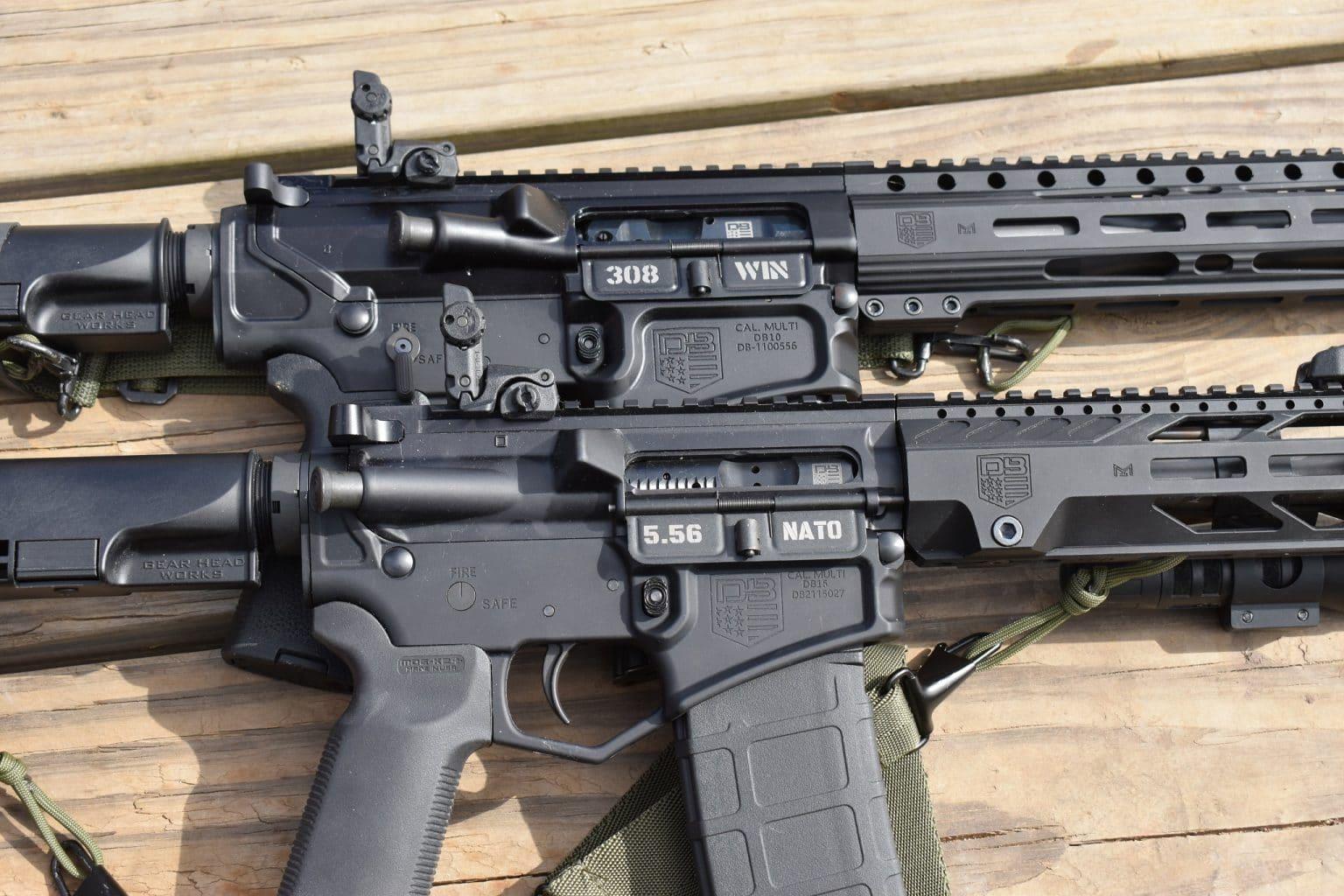
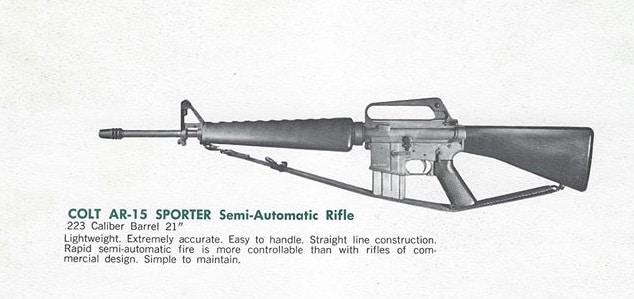
1992: Enter the M4
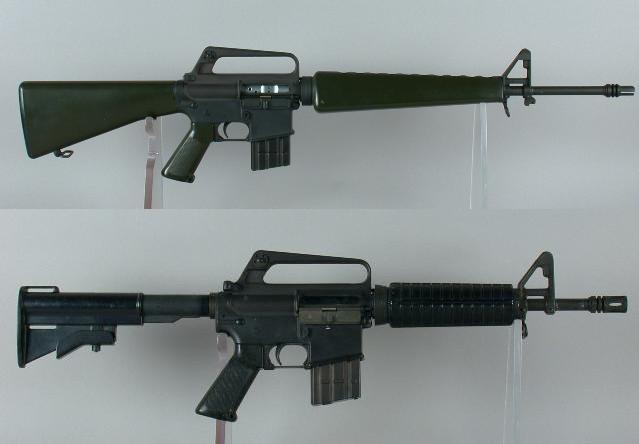
Likewise, the AR-15s of today have morphed away from the original 1960s bench line to keep up with the times, many incorporating a variety of M4 features.
M4 design features include the now-standard birdcage flash hider, 14.5-inch barrel, shortened handguards with rail support, improved feed ramps, flat-top receiver, and an adjustable length, six-position stock.
If you’re interested in digging into these differences further we compare both the AR-15 and M4 as well as the AR-10 vs. AR-15.
AR Buyers Guide
There are a lot of pieces on any AR, and we’re not going to get into the weeds on barrel profiles, anodizing, gas systems, or anything that won’t *really* matter to most folks.
That said, there are some fundamental criteria that will help you get the right black rifle for you:
- Quality receivers
- The right barrel
- Functional furniture
- A trigger that feels right
1. Quality Receiver Construction
The fundamental thing to look for in a solid rifle receiver is the construction – specifically, the kind of aluminum used to craft the two piece AR receivers:
- 7075 aluminum’s primary attribute is its strength. It’s not as corrosion resistant as 6061, but 7075 has tensile strength on par with steel.
- 6061 aluminum offers a blend of durability and natural corrosion resistance. It doesn’t offer 7075’s strength, but it offers a more workable material that is often slightly cheaper.
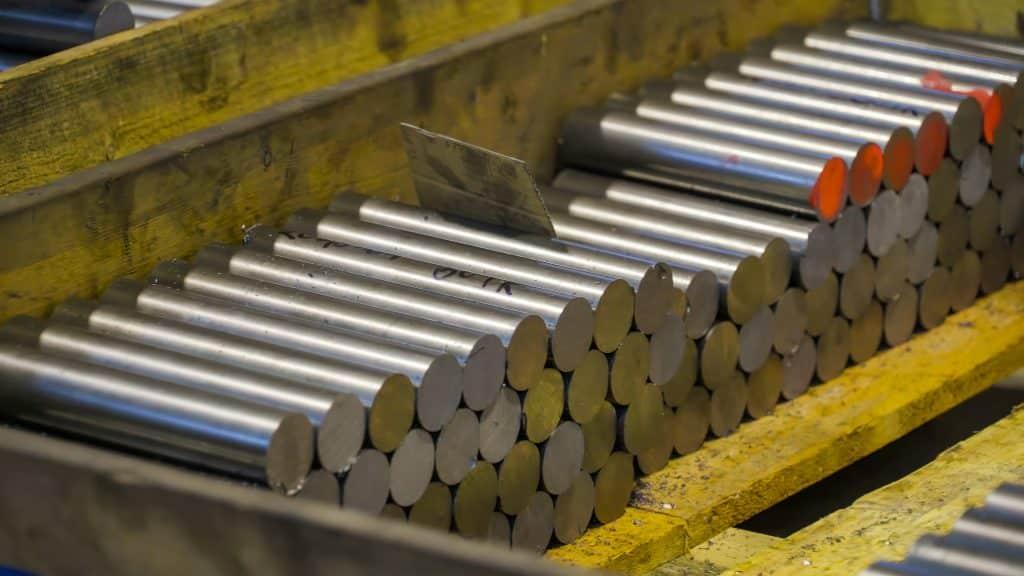
Forged vs. Billet: Further, while forged receivers are standard in AR production, some gun companies make their own billet receivers in-house, milled from a raw block of aluminum.
Most billet receivers have thicker walls and are harder to get into a military spec due to the machining process behind them but are preferred by those using heavier rounds with a bit more spice, such as .350 Legend, .277 Wolverine, and 6.5 Grendel.
The upper receiver, of course, houses the heart and soul of the AR, the bolt carrier group or BCG, also known as the bolt carrier assembly, which plays a crucial role in the AR-15’s gas system and cycling of cartridges.
The BCG, in common direct gas impingement models, consists of the actual carrier itself– the largest part in which the rest of the components either ride on or attach to– the bolt assembly in the front, the gas key held to the top of the carrier with two screws, the bolt cam pin, firing pin, and firing retaining pin.
The typical bolt assembly further breaks down into the bolt itself, the ejector with its spring and roll pin, the extractor with its pin and spring, and a trio of gas rings.
Want to know how an aluminum blank becomes a receiver? Take a look at our deep dive into aluminum and ARs.
We’ve got guides covering the top AR uppers and best lowers for any AR build.
The Bolt Carrier Group
The upper receiver, of course, houses the heart and soul of the AR, the bolt carrier group or BCG.
The BCG, in common direct gas impingement models, consists of the actual carrier itself– the largest part in which the rest of the components either ride on or attach to– the bolt assembly in the front, the gas key held to the top of the carrier with two screws, the bolt cam pin, firing pin, and firing retaining pin.
The typical bolt assembly further breaks down into the bolt itself, the ejector with its spring and roll pin, the extractor with its pin and spring, and a trio of gas rings.
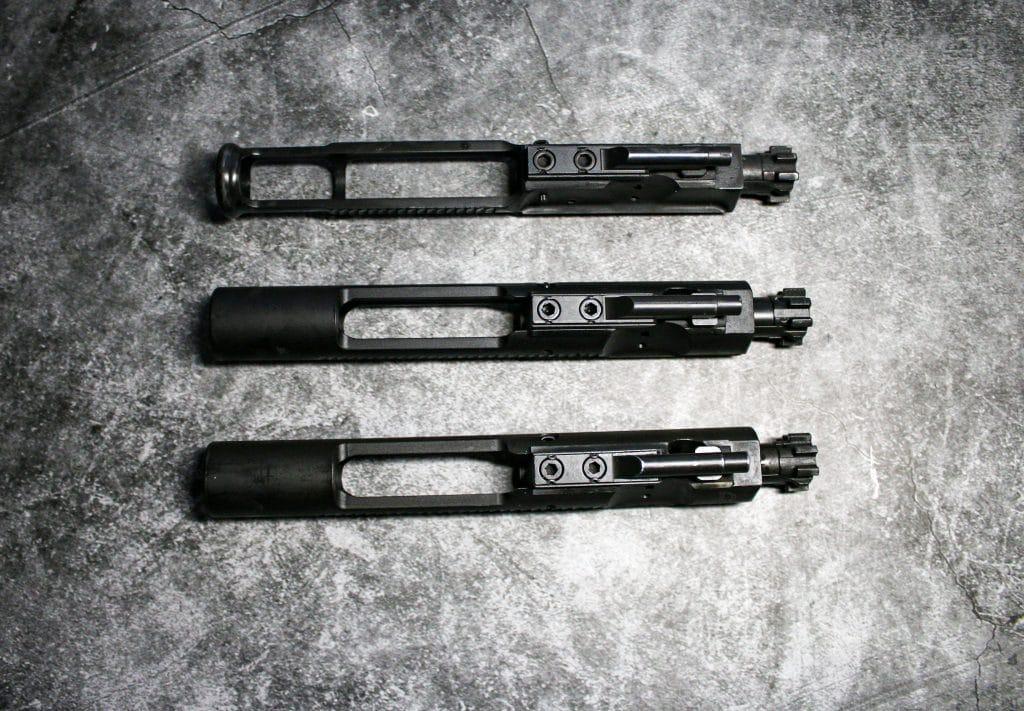
When the AR is fired, the gas system bleeds out a portion of the propellant exhaust via a gas port on top of the barrel. It feeds it back to the gas key atop the BGC, filling the chamber made by gas rings at the base of the bolt assembly, which forces the bolt carrier itself against the recoil spring.
That rearward motion twists the bolt on the cam pin, unlocking the chamber.
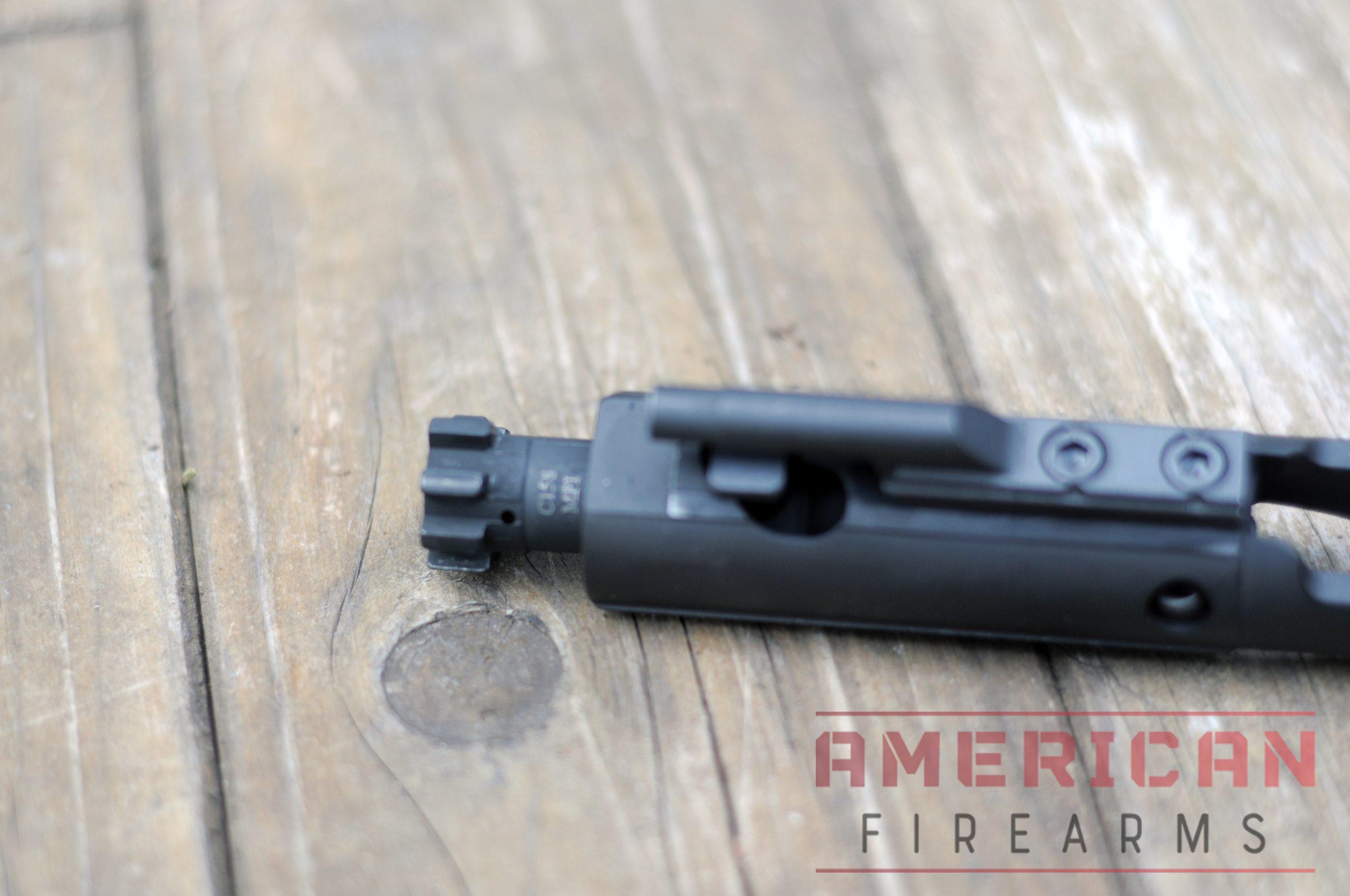
When the spring reacts to the bolt carrier, pushing it back into the battery, the bolt picks up the next cartridge in the magazine and pushes it into the chamber as the gas key realigns with the gas tube running atop the barrel, waiting for the next shot.
The process needs a tightly sealed and aligned gas system for this to work as advertised.
What to look for in a BCG
A good checklist to look for is in the material used, with 8620 steel being mid-shelf, 9310 and Carpenter 158 steel considered more top shelf, and those made of S7 tool steel the good stuff kept behind the counter.
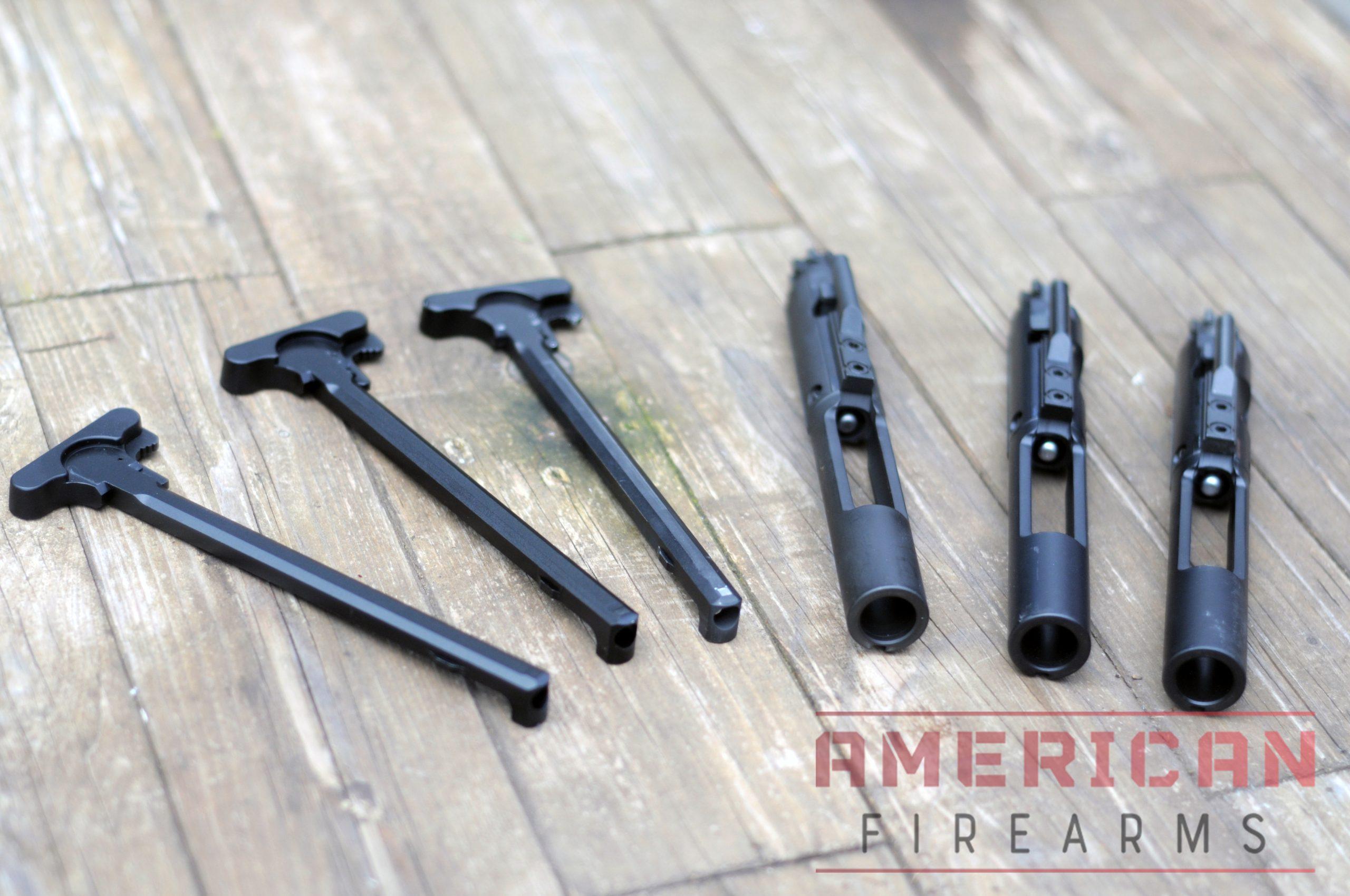
This doesn’t mean that 8620 is garbage, as it is the baseline grade that is considered Mil-Spec, but keep in mind that better grades of steel will hold up longer.
BCG CertificationBCGs will also carry a certification, or at least they should, to show the bolt itself is high-pressure tested (for shock-resistance), shot-peened (for strength), and magnetic particle inspected (for integrity), tests listed as HPT, MPI, and SP. We cover some of the better BCGs around if you’re in the market.
2. The right barrel
When the AR-15 rifle was first introduced in the 1960s, the standard barrel length was 20-inches, and the 5.56 NATO caliber ammunition of the day was ballistically optimized for that span.
Today, loads such as M855 are widely available and still deliver optimally in a 20-inch or longer barrel for those interested in maximizing accuracy — say, for competitive shooting.
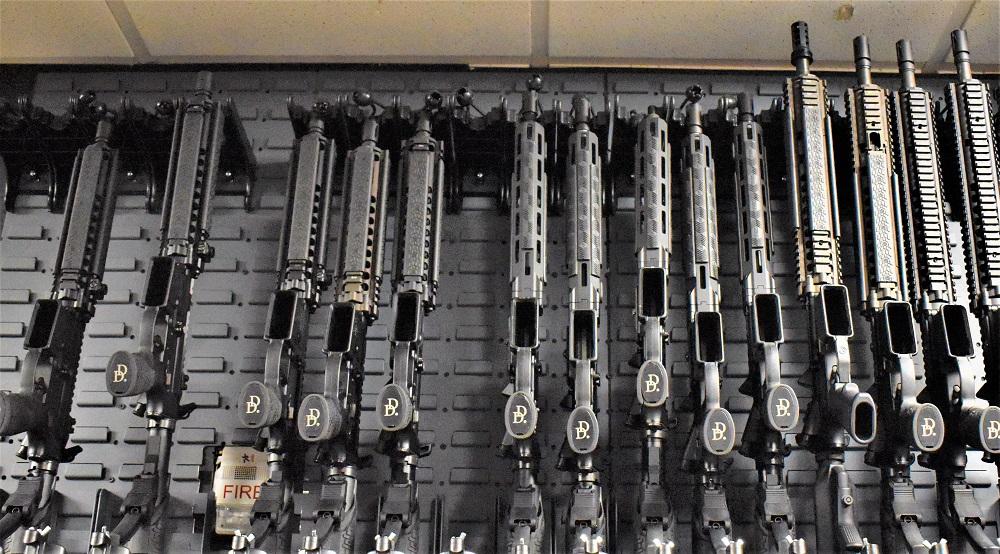
Since the early 1990s, the widespread adoption of M4 style carbine barrels, which for military and LE using a shorter barrel at just 14.5-inches, had led to many common ARs today having a default barrel length in the 16-inch range.
This choice is backed up by extensive barrel-length studies that found the “sweet spot” for common 5.56 loads in this range, although standard-length (20-inch) barrels deliver more velocity, thus imparting more energy to the bullet.
Even with that, there are custom hunting and target uppers that stretch out to 24- and even 26-inches. Beware, though, when using the long boys as harmonics issues start to come into play since longer barrels by nature will have more vibration.
Short Barreled 5.56 Performance
On AR pistols, the minute the barrel length starts to plunge below 14.5-inches, 5.56/.223 ballistics will begin to rainbow downward, shedding velocity with every inch dropped in barrel length while adding to noise and muzzle blast.
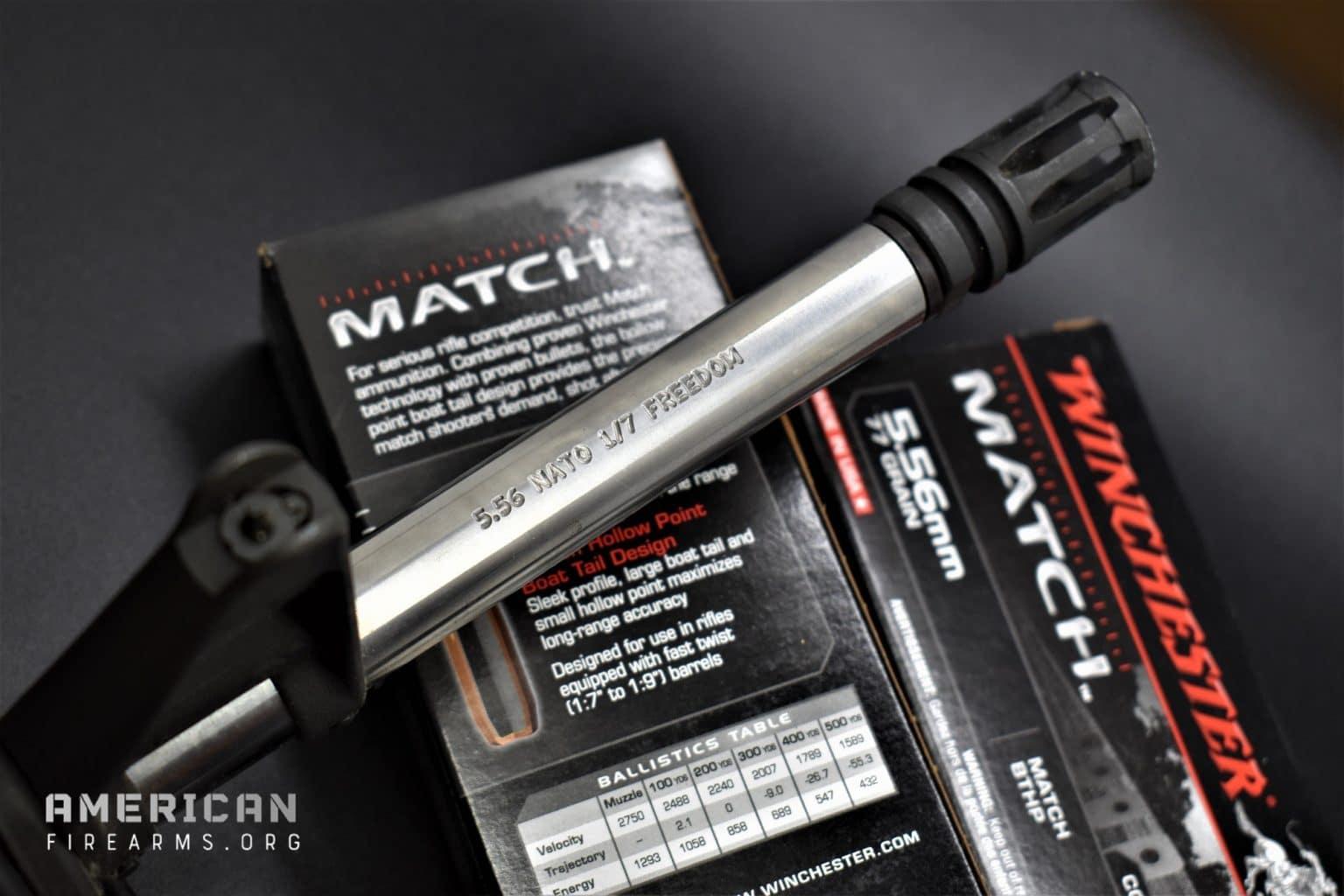
Short-barreled SBRs and pistols in standard AR chamberings also suffer from extensive muzzle flash due to unburnt powder and have a reputation of being “rowdy” on the range.
They’re also subject to a number of gun control efforts that longer-barreled rifles don’t have to navigate. Nonetheless, manufacturers market 5.56 barrels as short as 4.75 inches in overall length, targeting home defense rifle builders and range toy enthusiasts who don’t fear a little hot gas for breakfast.
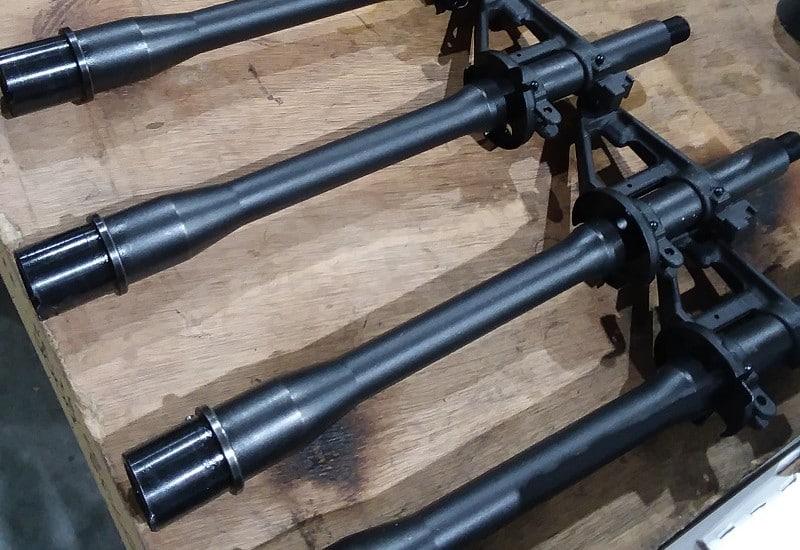
ARs range from 10-inch shorter barrels seen on AR pistols and SBRs to 24-inch long toms on some custom precision guns when it comes to barrel profiles.
Generally, weights will run from thin “pencil” types to heavy bull target barrels, with a sweet spot of around 16 inches being the norm — both as the minimum barrel length for a legal rifle and providing optimal ballistic performance for the 5.56/.223 round in most scenarios.
This is a good example of the modularity that makes the AR-15 so great.
What about barrel profiles?
Barrels also fall into three general “profile” types– lightweight, government, and heavy. Ironically, the hallmark of the early AR and subsequent AR-15 was a very thin barrel as the gun was developed by a company that was a subsidiary of a big player in the aviation industry, one in which every ounce mattered.
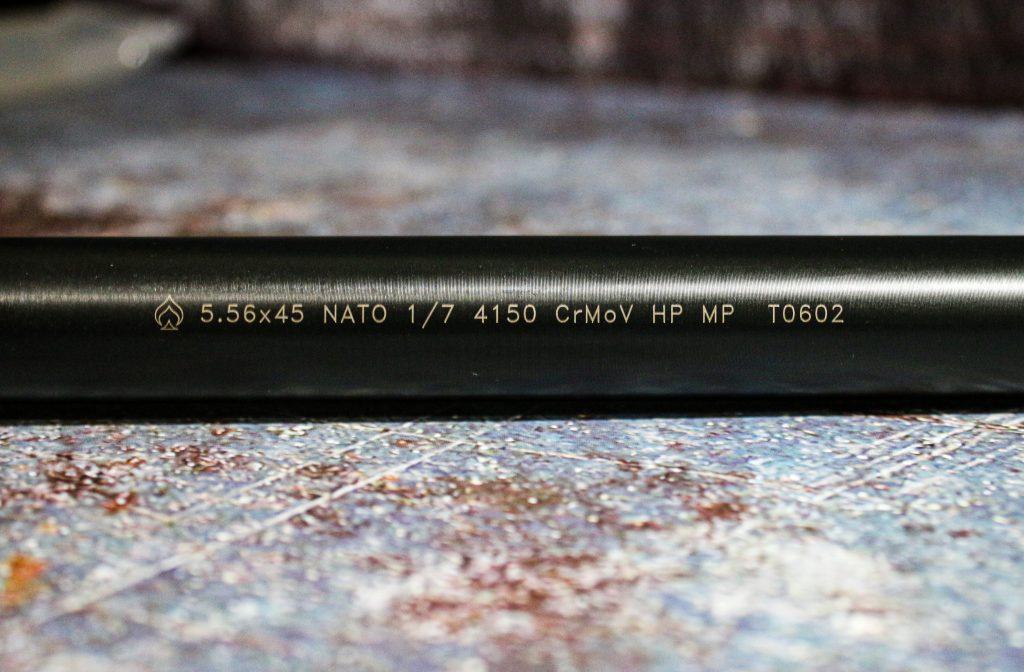
More on barrel profiles
Barrel Material
Most AR rifles in circulation today have barrels made of 4140 CMV steel, which is fine for general use. Barrels advertised as Mil-Spec will usually be made of stronger MIL-B-11595-E CMV or 4150 steel. Premium match barrels will usually be 416/410 stainless steel.
- 4140 indicates the barrel contains 40% carbon content
- 4150 indicates the barrel steel has a carbon content near .50%
A black nitride finish is typically seen on entry-level barrels. It is a little cheaper than manganese-phosphate hard chrome, which can be found on nicer (see; more expensive) barrels, with the latter lasting longer, especially when using heavier bullets, and for those interested in preventing barrel whip.
A chrome-lined barrel adds life and wear resistance, but can add to the final cost. If you want more on AR barrels we go deep in our AR barrels explainer.
3. Functional furniture
Originally, the system Eugene Stoner developed for his Armalite rifle used fixed plastic or fiberglass handguards around his early AR designs’ thin, lightweight barrel continued for the first couple of decades of the AR-15/M16s life.
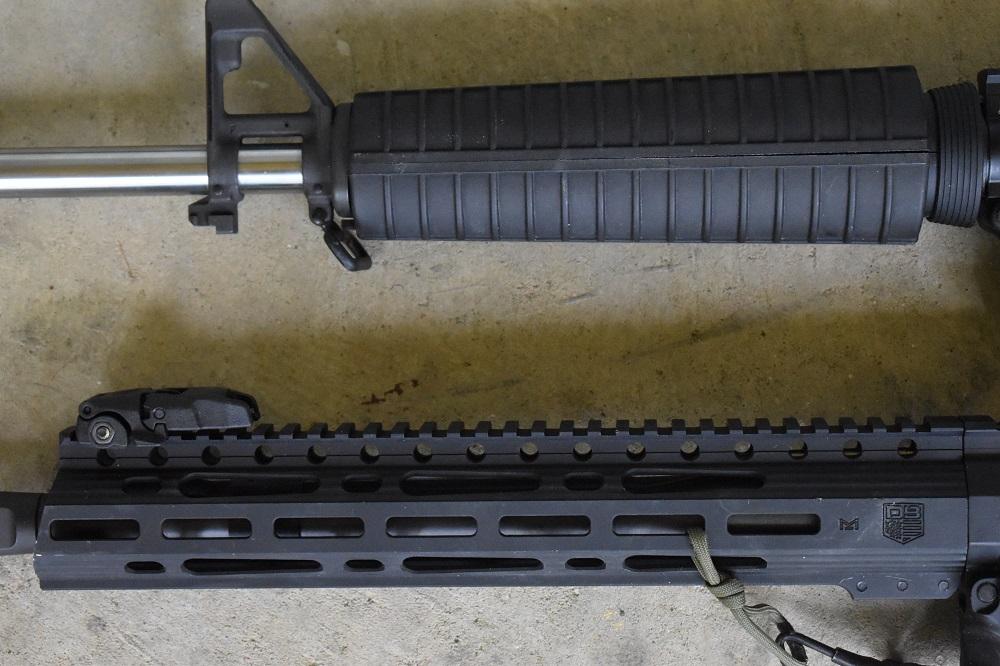
This was supplemented by two-piece handguards held in place with a cap and delta ring system and incorporated internal heat shields between the handguard and barrel to prevent melting in heavy use.
These days you have a few choices when it comes to handguards & furniture.
- Drop-in Handguards: So-called drop-in handguards, often with rail systems, started appearing in the early 1990s and offered a more up-to-date replacement for the old A1 and A2 style fore-ends. While they are lightweight and easily replaced if broken, the problem with these is that they attach to the barrel directly, affecting accuracy, especially as accessories are mounted.
- Free-float Handguards: More common today are free-floating handguards on the forearm, a feature seen even on AR pistols. Attaching to the barrel nut instead of the barrel itself, which allows for a truly free-floating barrel, free-floating handguards are often more modular than fixed handguards, dripping in Key-Mod or M-LOK slots for accessories (or running a full-length quad rail) and Pic rails for optics at the 12-, 3-, 6-, and 9-o’clock positions.
Further, since the barrel is free from the furniture, its harmonics are not affected by the handguard, aiding in maintaining accuracy and heat resistance.
Handguard length on AR-style rifles typically varies with the length of the firearm’s gas system. For instance:
- Pistol length systems run 10-inches as pistols must have at least a 4-inch system
- Carbine gas systems run 7-inches
- Mid-Length gas systems are 9-inches
- Rifle-Length gas systems are 12 inches
Gas system length informs handguard length, which translates into:
- M4 handguards for carbines which are 7-inches long
- Mid-Lengths, which are between 9 and 11-inches
- Rifle-length handguards are generally anything over 12 inches
This is all before we get into the world of DI (Direct Impingement) vs. gas the piston system and the like. We dive way deep into gas systems with our explainer on the topic.
4. A trigger that feels right (for you)
The most encountered trigger type on AR-15s is the good-old GI “Mil-Spec” pack. A single-stage trigger that can vary between 5.5 and 8.5 pounds, they have a lot of “creep” on the take-up before they break but perform well enough, are cheap, and reliable enough for target practice.
Most standard lower parts kits, which include everything needed to get a stripped lower receiver in working order, include a GI trigger system. While effective, they can be irritating for those who prefer a more predictable trigger break.
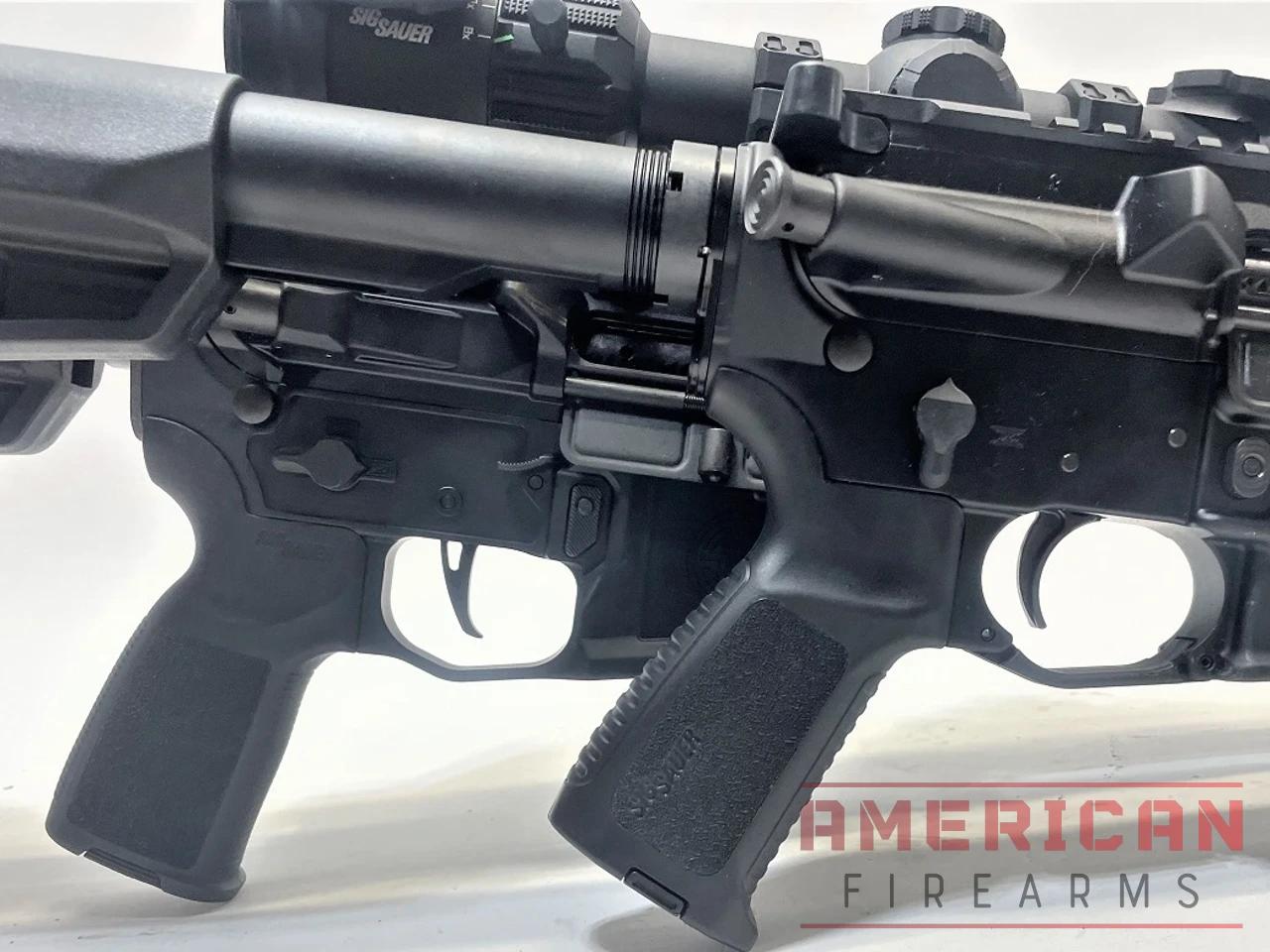
Drop-in preassembled replacement trigger packs can easily upgrade ARs and provide a more repeatable trigger pull, replacing creep with crisp. A good example is the CMC Single Stage, which is offered in both 2.5-pound and 3.5-pound pull weights, which can be had for around $100.
Double stage triggers have a mechanical change to the hammer, sear face, catch, and springs that creates a pull cycle that includes first a light take up to bring the catch to tension, then a clean release when the trigger breaks. These triggers are smooth and, while a little costly at about $200-$300, are worth it when precision accuracy and long-range shooting are concerned.
Another thing to keep in mind on trigger packs is the choice between more common curved triggers and flat-faced triggers.
While some drop-in packs will come with flat-faced triggers installed, companies such as Bullmoose offer flat-faced replacements for curved triggers that are compatible with the Mil-Spec parts kits.
Caliber Options
What if you don’t want a Plain Jane 5.56 AR? While the AR-15 platform is famously associated with the .223 Remington and 5.56x45mm NATO cartridges, its true versatility shines through the wide array of calibers it can accommodate.
Thanks to its modular design, the AR-15 can be adapted to suit diverse shooting needs, from competitive target shooting and varmint control to hunting medium-sized game and self-defense. We highlighted the various caliber options offered by leading AR manufacturers below, so if you want to build a .300 BLK shorty or use 6mm ARC to reach out and touch something, you’ll know which brand can give you those options.
Brand Name | Calibers Offered for ARs |
Aero Precision | 5.56 NATO .223 Wylde .224 Valkyrie .300 Blackout 6.5 Grendel .350 Legend 9mm .40 S&W |
Bravo Company Manufacturing (BCM) | 5.56 NATO & .300 Blackout |
Colt | .223 Remington & 5.56x45mm NATO |
Daniel Defense | 5.56mm NATO 6.8mm SPC & .300 BLK |
Geissele Automatics | 5.56x45mm NATO 6mm ARC & 6.5 Creedmoor |
LaRue Tactical | 5.56mm & 7.62x51mm NATO |
Noveske | 5.56 NATO .300 AAC Blackout 9mm Luger 6.5 Grendel & .223 Remington |
Palmetto State Armory (PSA) | 5.56 NATO .223 Remington .300 AAC Blackout 6.5 Grendel 7.62x39 .22lr .45 ACP 9mm .350 Legend .450 Bushmaster .458 SOCOM .50 Beowulf & .224 Valkyrie |
Springfield Armory | 5.56 .308 WIN & 9mm |
SIG Sauer | 5.56mm NATO .223 Wylde 7.62mm NATO 7.62x39mm & 9mm Luger |
Smith & Wesson | 5.56x45mm/.223 Remington .22 Long Rifle 5.45x39mm (older models) |
AR Reviews & Recommendations
How We Tested
Build Quality
We assess the quality of the materials used in the rifle’s construction, including the receiver, barrel, and other key components, as well as how well the rifle is put together.
Accuracy
We bench-fire test rifles using various types of ammunition at different distances to evaluate accuracy and precision.
Ergonomics
We evaluate the overall design and ergonomics of the rifle, including weight distribution & balance.
Overall Value
We evaluate the rifle’s price relative to other rifles in its class and assess whether it offers good value for money.
More on our testing process
Comparison Table
Our Top Picks
Displaying 1 - 1 of 10
Awards
Price
Overall Rating
Description
Rating Categories
Accuracy
Ergonomics
Features
Fit & Finish
Reliability
Value

$650.99 at Palmetto State
Jump to Details49
All-in-all PSA continues to use its massive component infrastructure to deliver fun, high-quality products, and their PA-15 is no different.
8/10
7/10
6/10
9/10
9/10
10/10

$2024 at Daniel Defense
Jump to Details44
It’s hard to get too much of a good thing with Daniel Defense. They rarely disappoint, and the Daniel Defense DDM4 V7 holds that line impressively.
8/10
7/10
7/10
8/10
8/10
6/10

$919.32 at Palmetto State
Jump to Details44
Few AR-15s have impressed me in the pure “bang for the buck” category as the Lead Star Grunt. They've really packed a lot to like in a sub-$1,000 rifle.
7/10
8/10
8/10
7/10
7/10
7/10
$1116.99 at Palmetto State
Jump to Details39
The Saint Victory builds on SA’s impressive SAINT semi automatic rifle with serious attention to detail, a full-length 15″ M-Lok riddled handguard and a nickel boron-coated flat-faced trigger right out of the box.
7/10
6/10
6/10
6/10
7/10
7/10

$880.99 at Palmetto State
Jump to Details41
The Ruger SFAR, or "Small Frame Autoloading Rifle", in .308 that is nearly the same size as a traditional 5.56 caliber AR-15.
7/10
6/10
6/10
8/10
7/10
7/10

$930.99 at Palmetto State
Jump to Details34
A new, high-quality AR-15 designed for competition shooting with top-notch parts.
8/10
5/10
6/10
6/10
5/10
4/10

$549.99 at Palmetto State
Jump to Details45
The AM-15 is a fantastic budget AR with a 16-inch 4150 Chrome Molybdenum Vanadium Steel barrel that ends in an A2-style birdcage.
8/10
7/10
6/10
6/10
9/10
9/10

$999.99 at Palmetto State
Jump to Details48
The Aero M4E1 is chambered in .223 Wylde, which gives you the option of running 5.56 NATO or .223 Rem flawlessly.
8/10
8/10
8/10
8/10
9/10
7/10
$927.99 at Palmetto State
Jump to Details41
Diamondback’s DB15 has been totally redesigned, and if you simply add up the price of the components they incorporated into the new gun it’s easy to see how much value they packed into their new AR.
7/10
7/10
7/10
7/10
7/10
6/10
$1023.99 at Palmetto State
Jump to Details53
The M400 SDI XSeries gives you competition performance in a common tactical design.
9/10
9/10
8/10
9/10
9/10
9/10
| Name | Selection | Price |
|---|---|---|
PSA PA-15 | Best Value | $599 |
Daniel Defense DDM4 | Best Premium AR | $2,024 |
Lead Star Grunt | Best Mid-Range Package | $919 |
FN M4 Carbine | Best M4 Build | $1,749 |
Springfield Saint Victor | Also Great | $1,116 |
COLT LAW ENFORCEMENT Carbine | Also Great | $1,049 |
Ruger SFAR | .308 Pick | $880.99 |
S&W M&P 15 Volunteer XV Pro | Mid-Range Runner-Up | $930 |
Anderson AM-15 | Budget Pick | $589 |
Aero Precision M4E1 | .223 Wylde Pick | $999 |
Diamondback DB15 | Also Great | $1,342 |
BCM RECCE-16 MCMR | RECCE Rifle Pick | $1,443 |
The Best AR-15s
1. Editor’s Pick: Palmetto State Armory PA-15
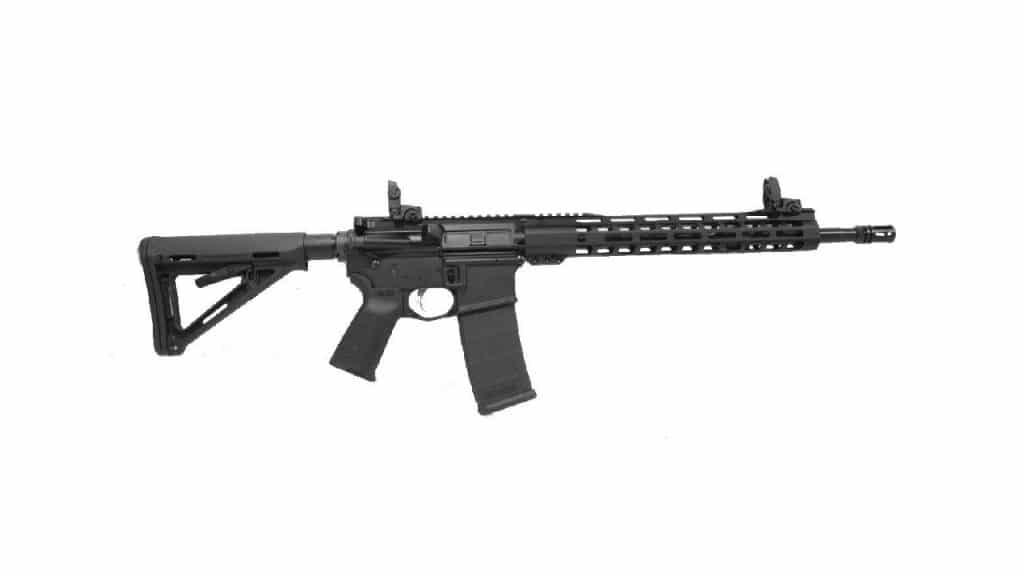
$650.99

49
EXCEPTIONAL
2025 Awards & Rankings
Performance Scores
Action: Semi-automatic
Barrel: 16 inches
Caliber: 5.56×45mm NATO
Gas System: Direct impingement
Grip: Magpul MOE
Trigger: Palmetto State Armory Mil-Spec
Sights: Magpul MBUS Sight Set
Weight: 6.5 pounds
What we liked:
- Solid availability
- Serious bang for the buck
- Lots of PSA products to choose from
- 1:7 barrel twist rate is good middle ground
What we didn’t:
- There are higher-quality builds available
- Not a drastic improvement over previous-gen PSA ARs
- Controls can run a touch loose
A quality (and customizable) workhorse AR
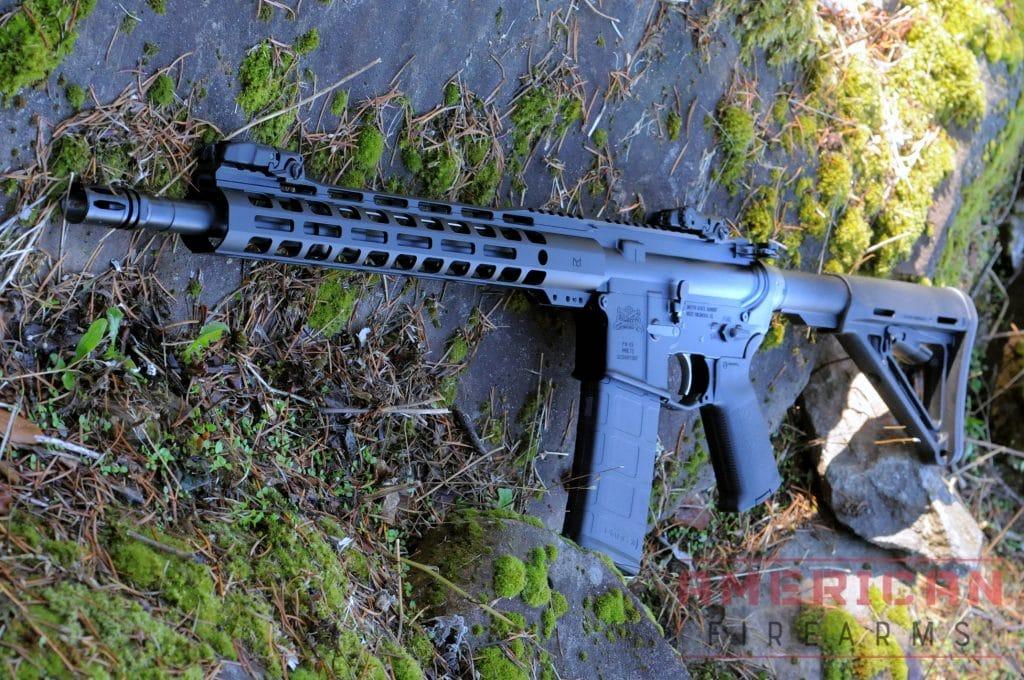
Long an AR component producer, Palmetto State has made an impact as an AR-15 manufacturer. Palmetto State’s PA-15 mil-spec AR-15 uses standard components but I love how they pair a 4150 Chromoly 16-inch, cold hammer-forged barrel with a classic A2 pistol grip, carbine-length gas system, and melonite finish for some throw-back goodness.
Beyond the components, PSA owns the production behind these ARs, so I can generally always find a few in stock in various configurations, which can be a rarity given the kind of surge in demand for ARs (and firearms in general) in times of crisis.
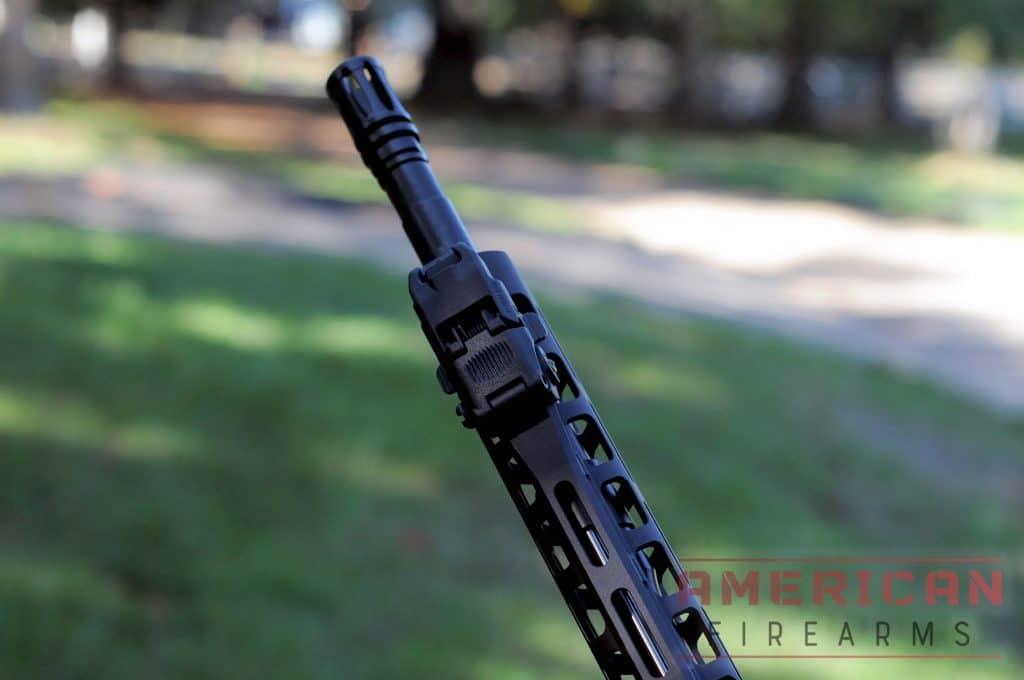
Flaws worth noting
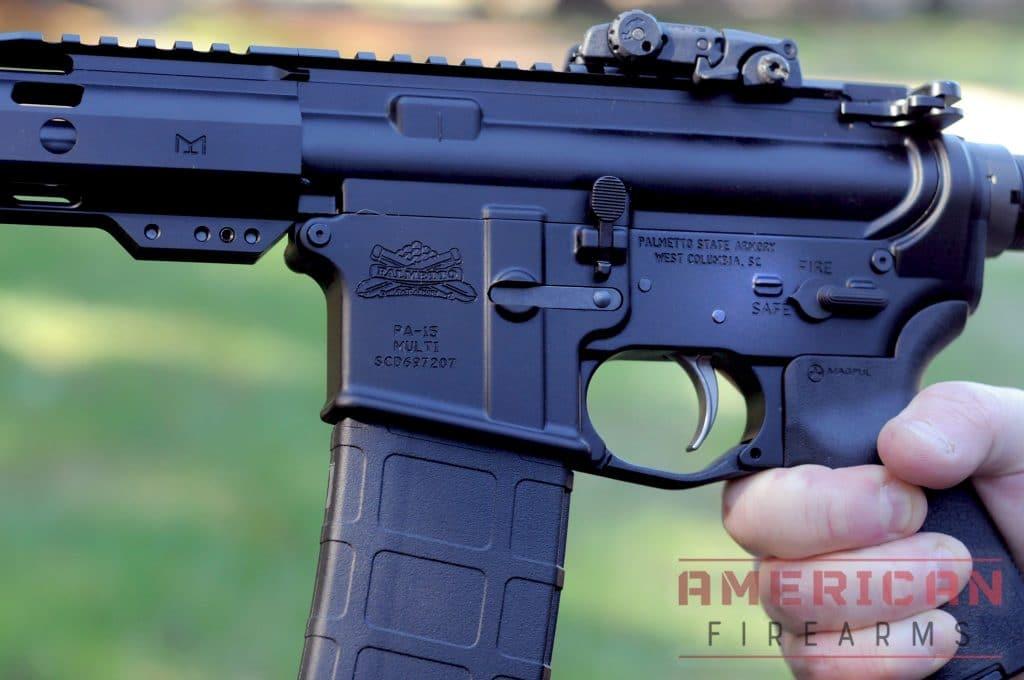
My main issue with the PSA is its carbine-length gas system paired with the 16-inch barrel which tends to over-gas the gun. I wouldn’t say it’s a major flaw, but an adjustable gas block will help dial the rifle to your liking if you find it too snappy.
Sure, you’ll be able to power through the cheapest ammo available (and given recent trends *cheap* is probably the wrong word), but I found it produced a forward (2 or 3 o’clock) ejection pattern out of the box.
Not a killer, but something that we’d like to tune out to get it humming like a Singer.
I’ve also had a PSA BCG freeze up on me without proper maintenance. Not unique to the PSA rifle, but one of the few instances when that has happened to me.
A fun, functional middle ground
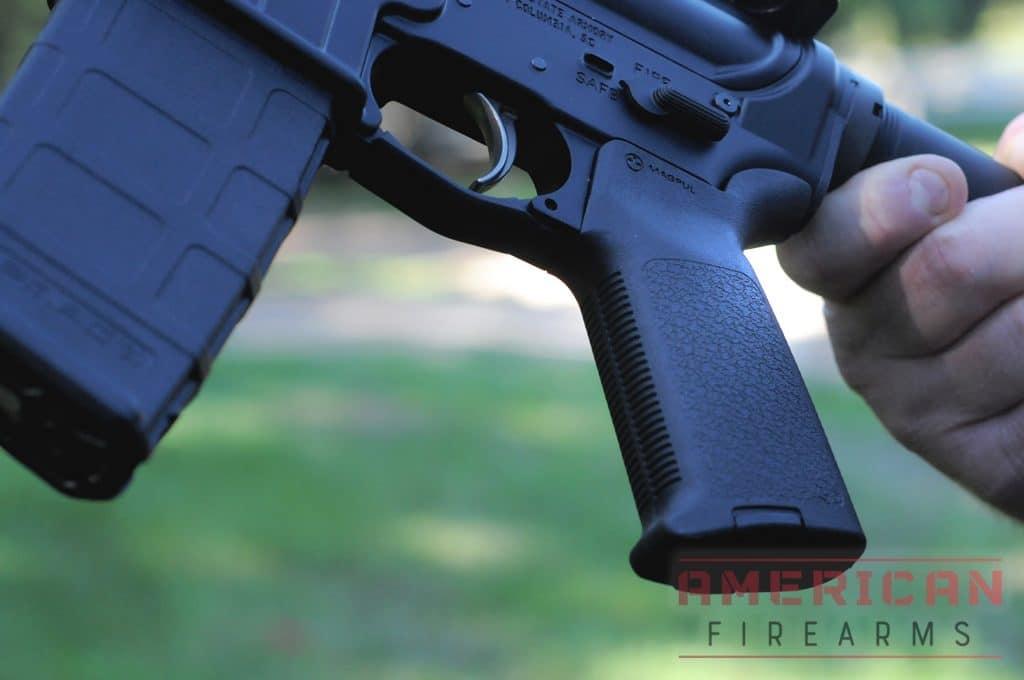
The 1:7 twist rate barrel gets 62 & 77-grain ammo to the target in a tight group – but also performs well with 55-grain. Paired with a halfway decent LPVO, I can ring 8-inch steel from a standing position at 75 and 100 yards all day long.
As with all classic A2 birdcages, there are no ports on the bottom so you’ll avoid kicking up dust when firing prone.
All-in-all PSA has produced an outstanding rifle and continues to use its massive component infrastructure to deliver fun, high-quality products. Sure, there are higher quality, better-designed ARs out there, but for a first AR or a 5th, I think the PSA hits the sweet spot of value and performance. For more check out our PA-15 long-termer review.
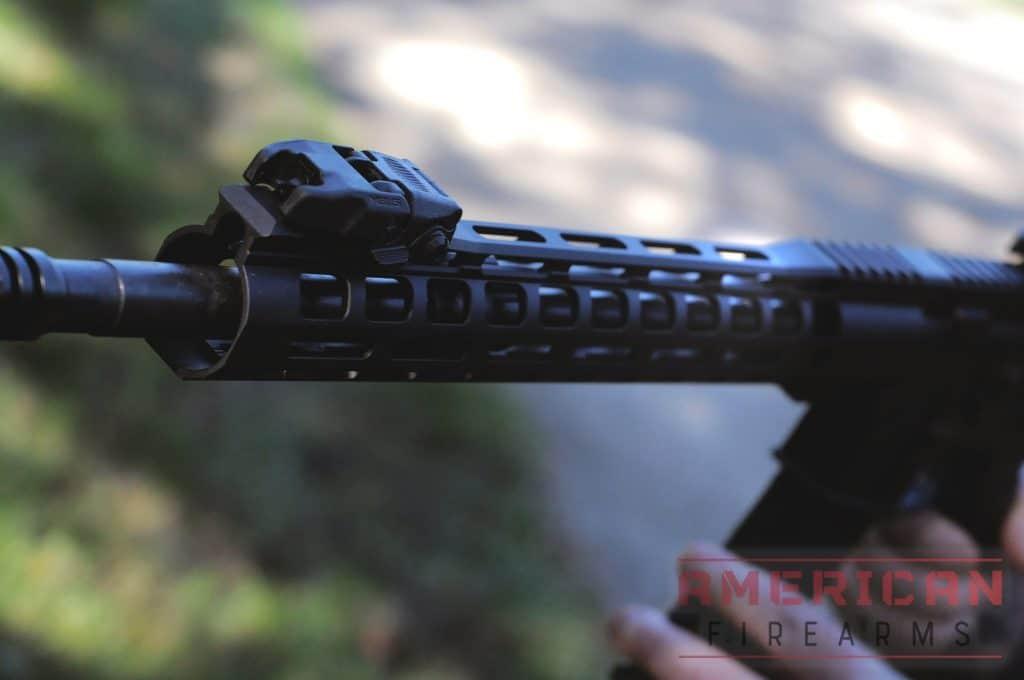
2. Premium Pick: Daniel Defense DDM4V7 Mil Spec AR-15
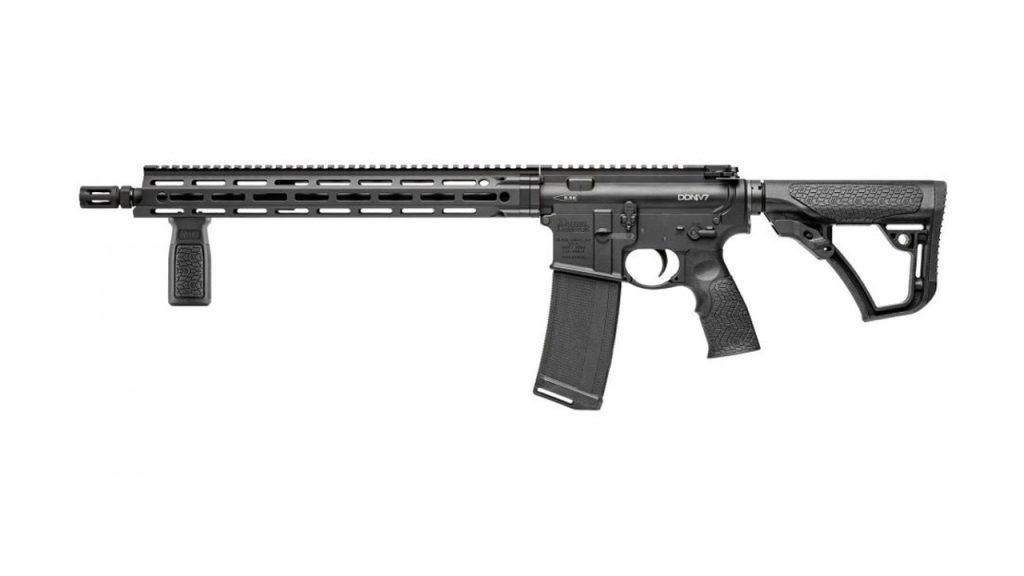
$2024

44
EXCEPTIONAL
2025 Awards & Rankings
Performance Scores
What we liked:
- Incredible build quality
- Gold standard for reliability
- Mid-length gas system makes for softer shooting
- California compliant options
What we didn’t:
- Trigger feels heavier than it should
- Vertical grip is mounted in an awkward location from factory and limits hand position options
A top-tier AR if there ever was one
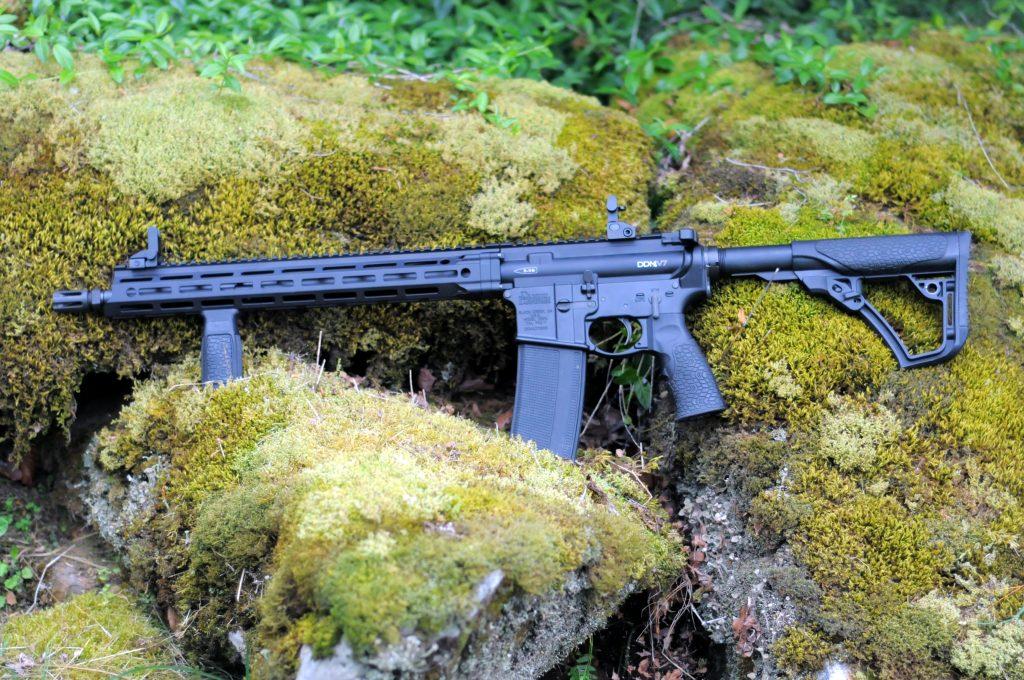
The company that made AR rail systems famous has produced some of the most popular rifles now for a generation. A long-time favorite of mine, the Daniel Defense DDM4, especially the V7 series gun, uses a cold hammer forged government profile barrel that does away with quad Picatinny rails in favor of a lightweight M-LOK rail. The DDM4 also features a flash hider muzzle device, which helps to suppress muzzle flash and improve shooting accuracy.
Long one of our favorite AR-15 manufacturers, I’ve run Daniel Defense guns for years now, and they’ve proven their reliability time and time again.
The folks at Daniel Defense were kind enough to send me one of their DDM4s to spend some quality time with, which you can read more about in our DDM4 V7 review.
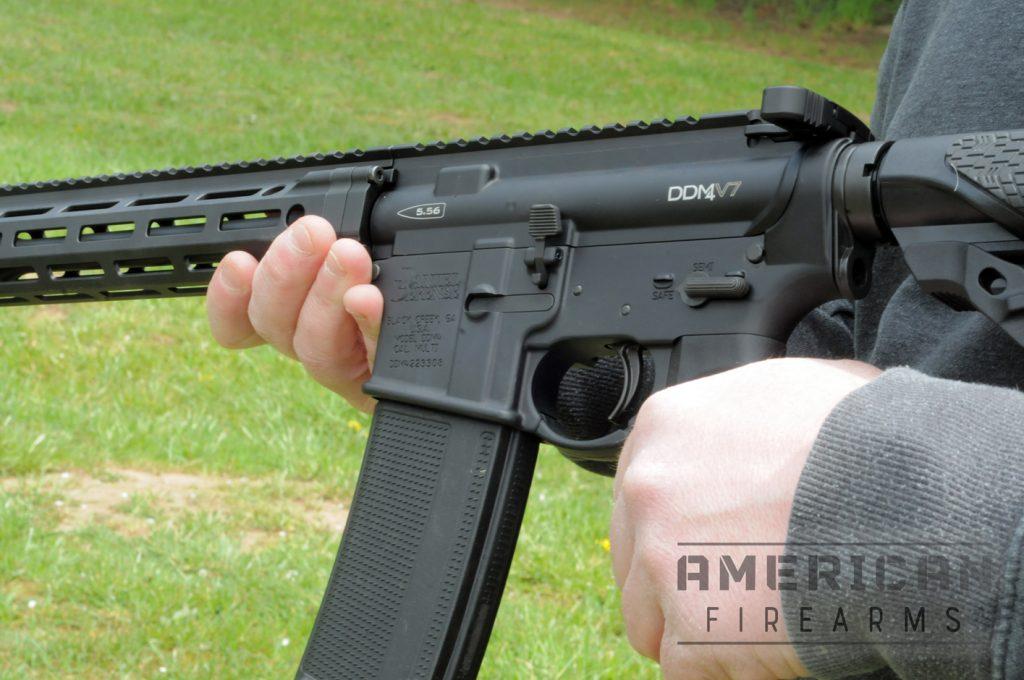
Durable Reliability
Daniel Defense is a fan of heavy phosphate coatings and hardened steel gas blocks, which gives their AR-15 rifles a one up on the competition when it comes to durability.
I’ve put a few hundred rounds through this test rifle, and it hasn’t complained once. Beyond reliably chewing though Sellier & Bellot 55 grain M193 like a champ, the DDM4 spits brass at a near-perfect 4 o’clock from the shooter. It’s so consistent I can hear casings landing on one another behind me after a few rounds. It’s just a remarkably well-tuned rifle.
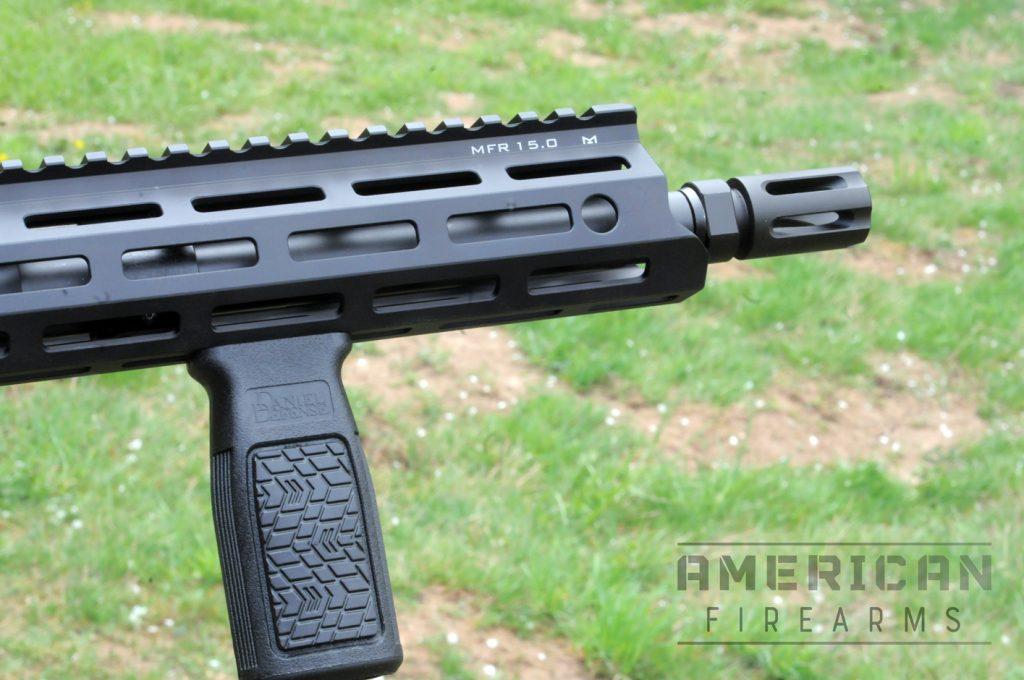
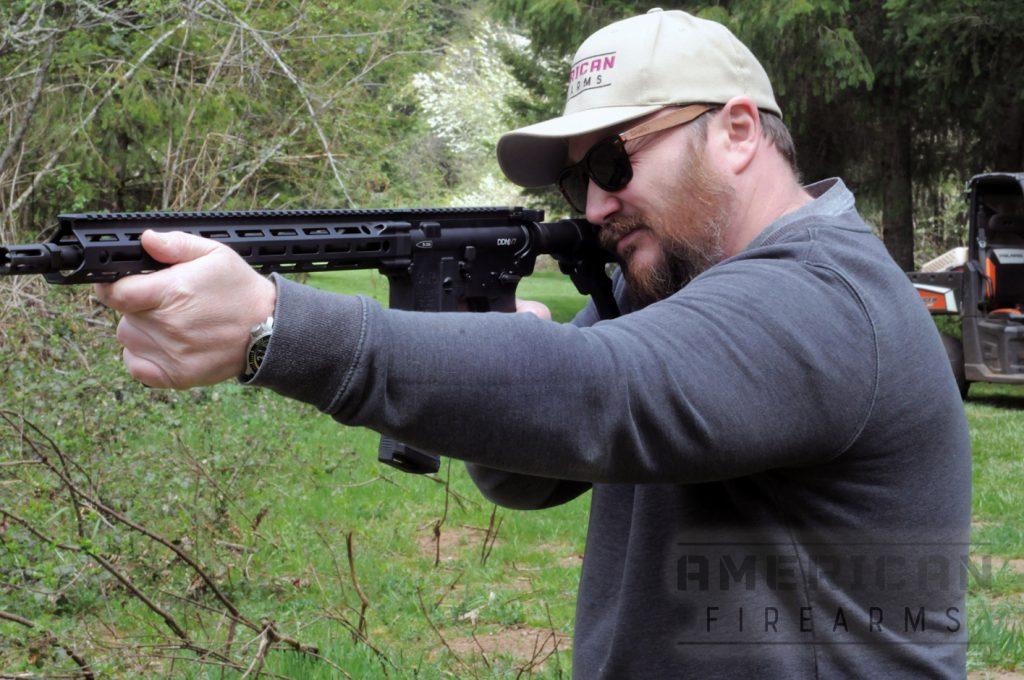
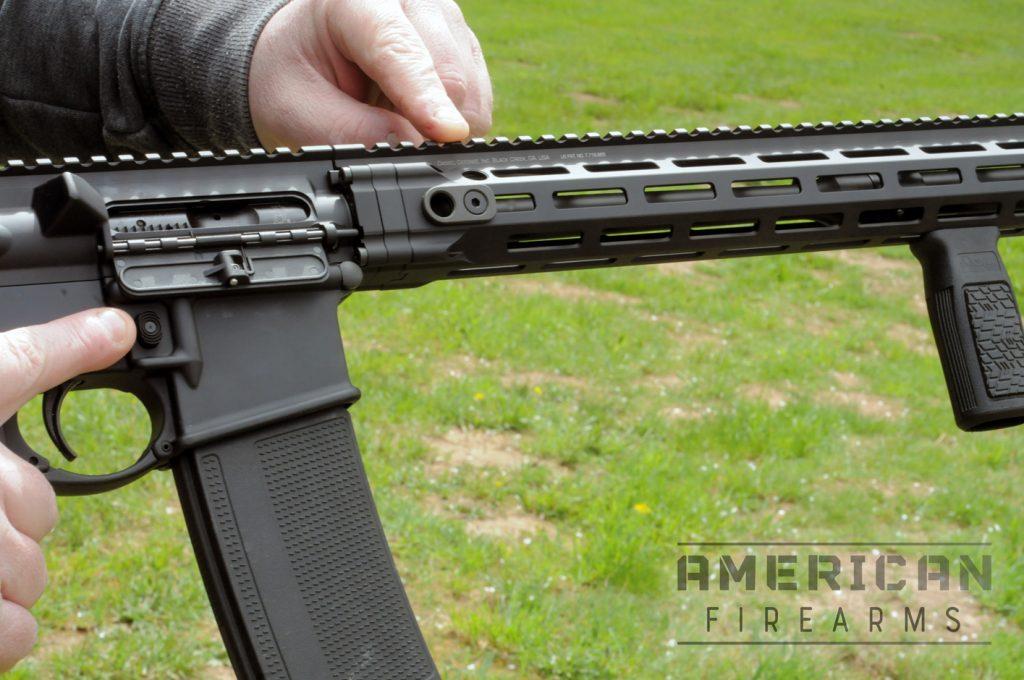
Availability continues to improve
Despite intermittent inventory & availability crunches (in-demand AR-15 manufacturers like Daniel Defense have not been immune to limited inventory), they’re still meeting demand pretty consistently, so if you can’t find the gun of your choice in stock sign up for their newsletter alerts and before long you’ll be at the front of the line.
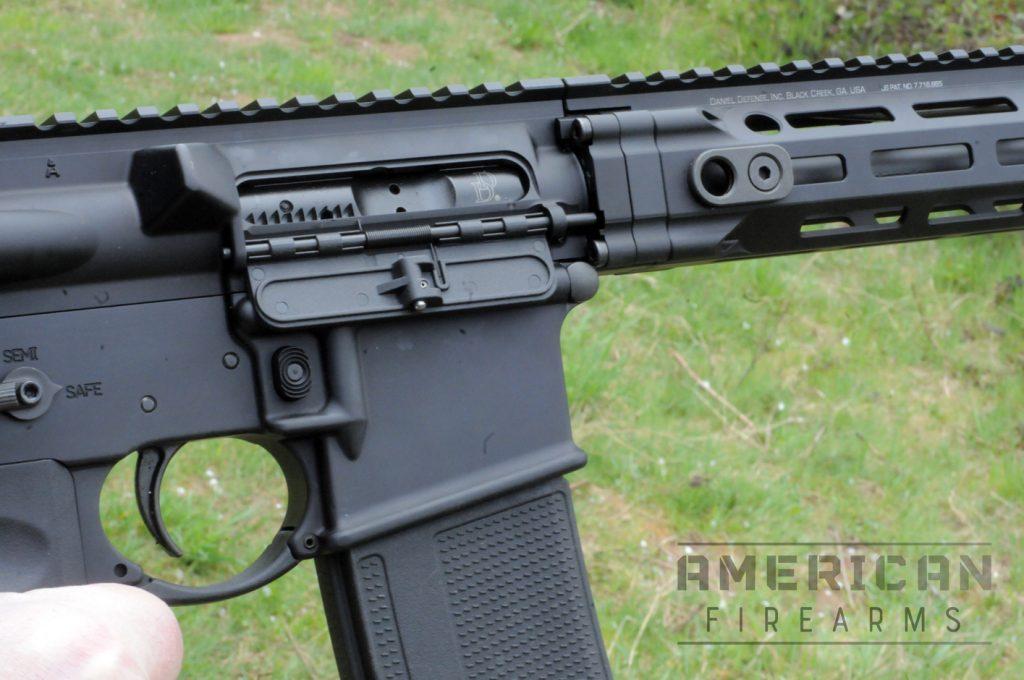
The DDM4 is the smaller-caliber 5.56 NATO brother to the 7.62/.308 AR-10 DD5. And it’s an outstanding rifle and an example of the kinds of rifles that have made Daniel Defense a household name (of sorts); it feels like a high-end watch and runs, points, and performs as well as anything on the market today.
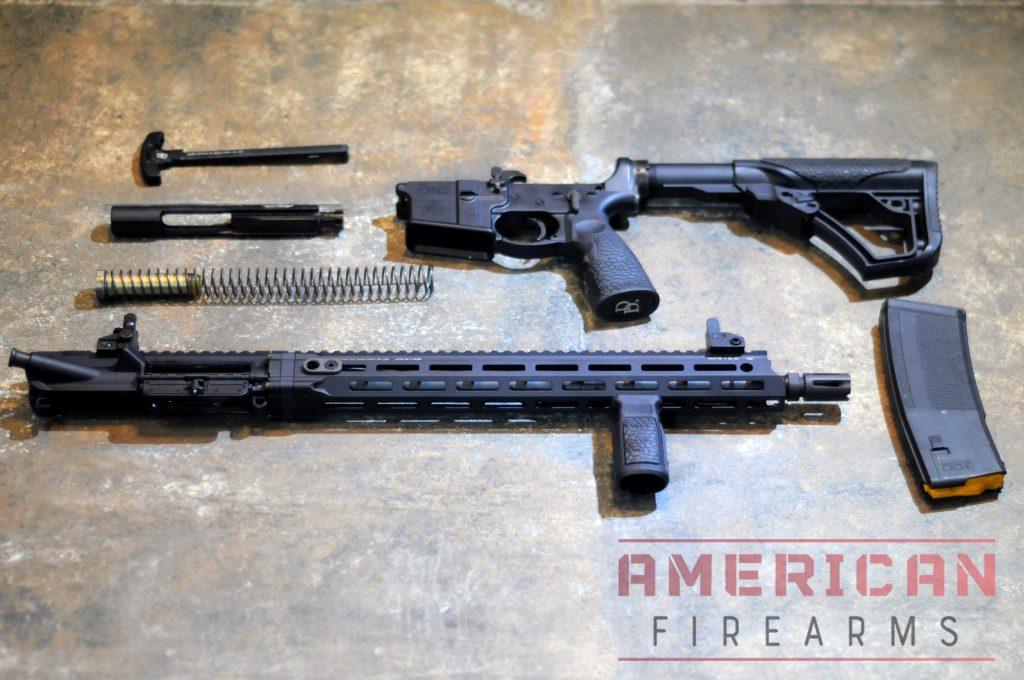
I find the DDM4’s grip a solid, pointable beast that offers more real estate than the Magpul MOE grip, and it has only recently been supplaneted by the Lead Star’s slimmer, stickier overmolded grip as my favorite.
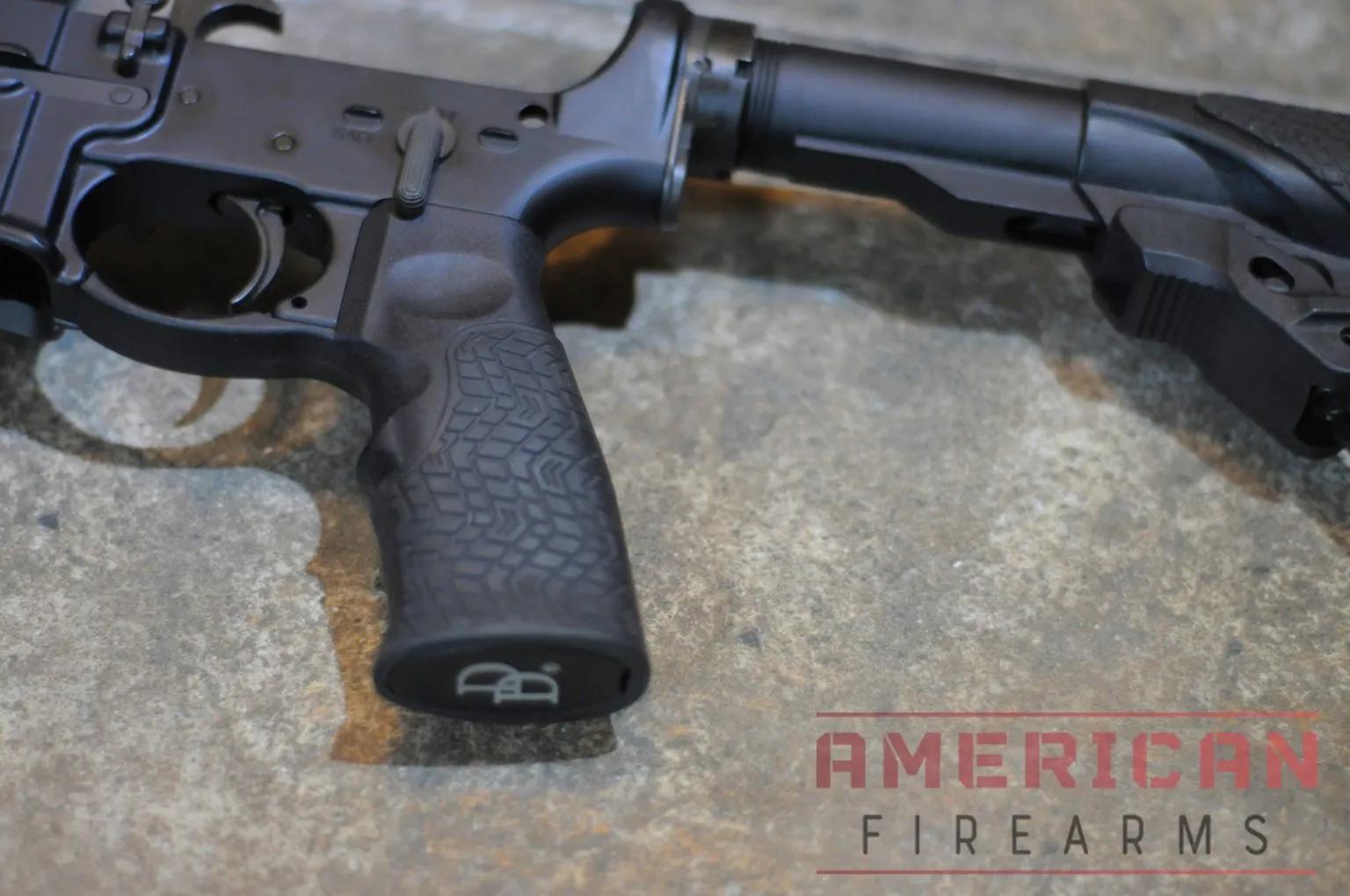
I could go on and on about the DDM4 — it’s a great rifle and absolutely worth considering if you’re in the market for a premium AR. It’s hard to get too much of a good thing with Daniel Defense. They rarely disappoint, and the Daniel Defense DDM4 V7 holds that line impressively.
3. Runner-Up: Lead Star Grunt
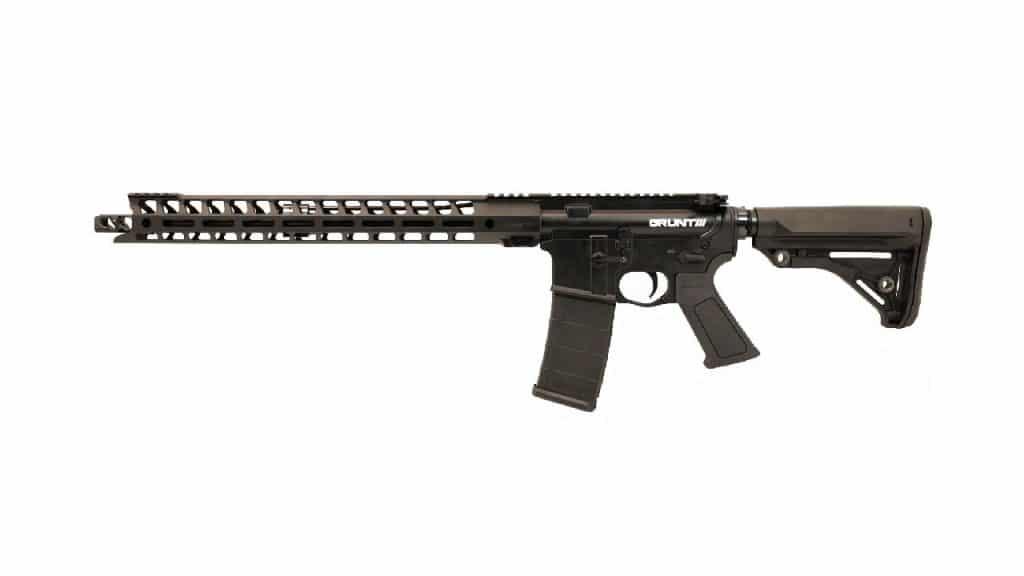
$919.32

44
EXCEPTIONAL
2025 Awards & Rankings
Performance Scores
What we liked:
- Lots of nice upgrade touches
- Light!
- Great trigger
- Quality furniture
What we didn’t:
- Can’t run a suppressor without replacing the handguard
- Muzzle brake is “capital L” Loud
Few AR-15s have impressed me in the pure “bang for the buck” category as the Lead Star Grunt. It’s not attempting to re-write the book or change the game in any sense, but Lead Start has really packed a lot to like in a sub-$1,000 rifle that will go bang every time you pull the trigger.
All the Upgrades
Lead Star may be familiar to the competition set, they’ve been cranking out precision-focused PCCs for some time, and their entry into the world of full-bodied rifles benefits from their precision PCC experience, letting the Grunt stand out amid the sea of 5.56 ARs available within a Benjamin of a grand.
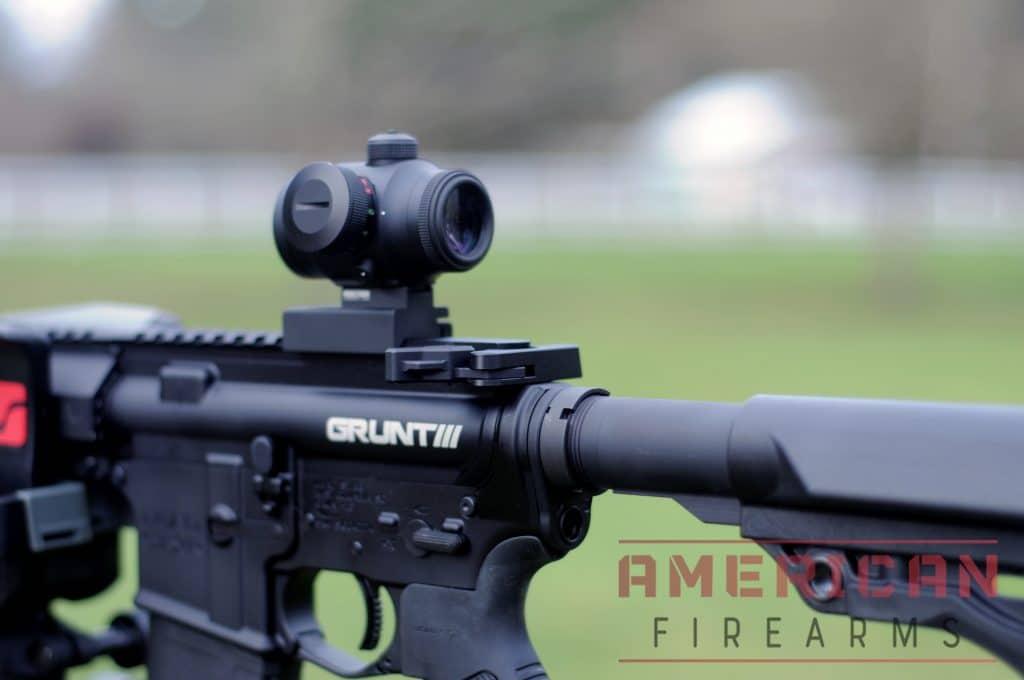
If the Golden Age of 5.56 AR-15 rifles is truly upon us, the Grunt surprised me on a few fronts. The first is just how light and nimble it feels in hand. From the full-length 17-inch handguard to what is now my favorite AR grip (displacing the DD DDM4), everywhere I turned the Grunt over-delivered — especially for what is typcally considered a mid-tier rifle.
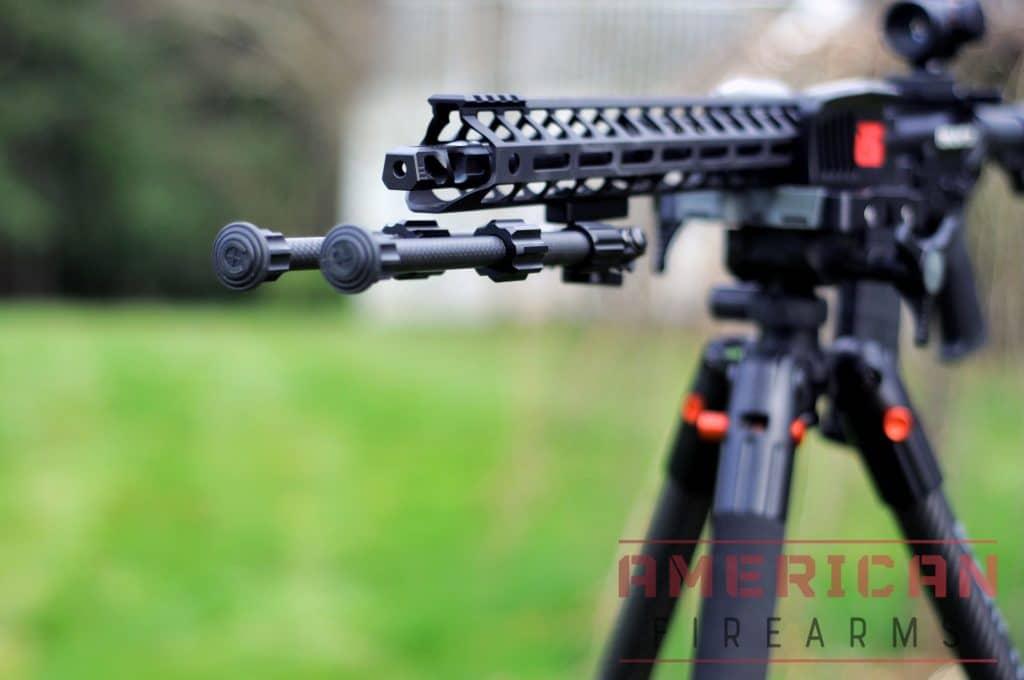
The Grunt being Lead Star’s entry into the (hyper-competitive) world of home defense, duty, and range rifles, it’s competing with a lot of options, but there are a few touches that helped the Grunt stand out.
It’s incredibly soft shooting — even with rapid firing — thanks in part to Lead Star’s unique muzzle brake, which leans on their 9mm brake design, using ports on top of the brake in addition to a pre-chamber to help keep muzzle rise to a minimum and extending their innovative approach to controlling a PCC to world of the 5.56 rifles.
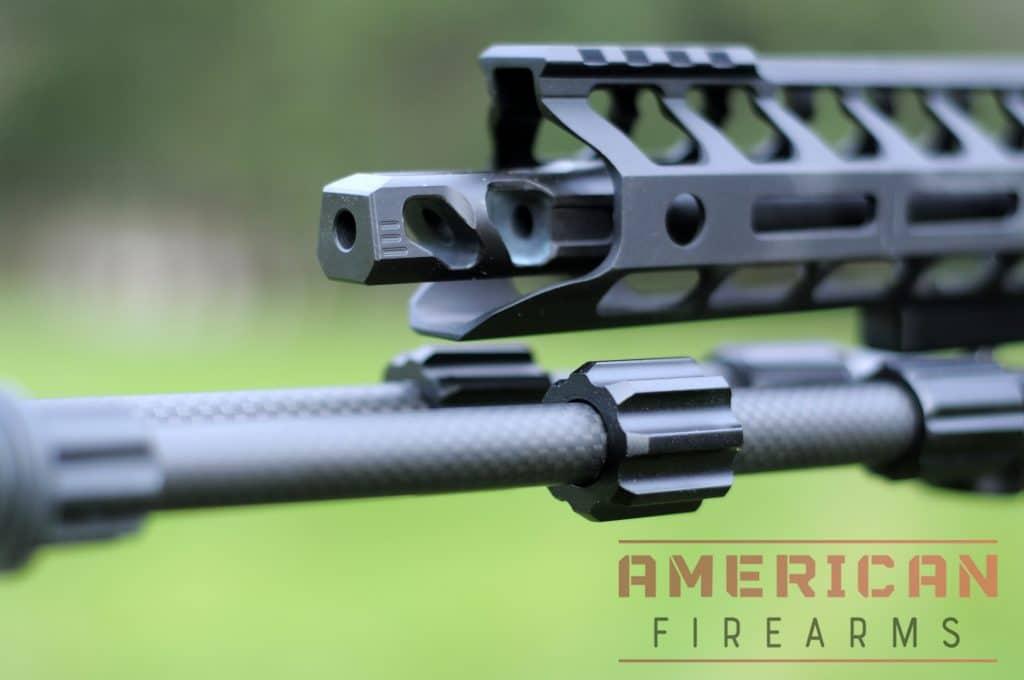
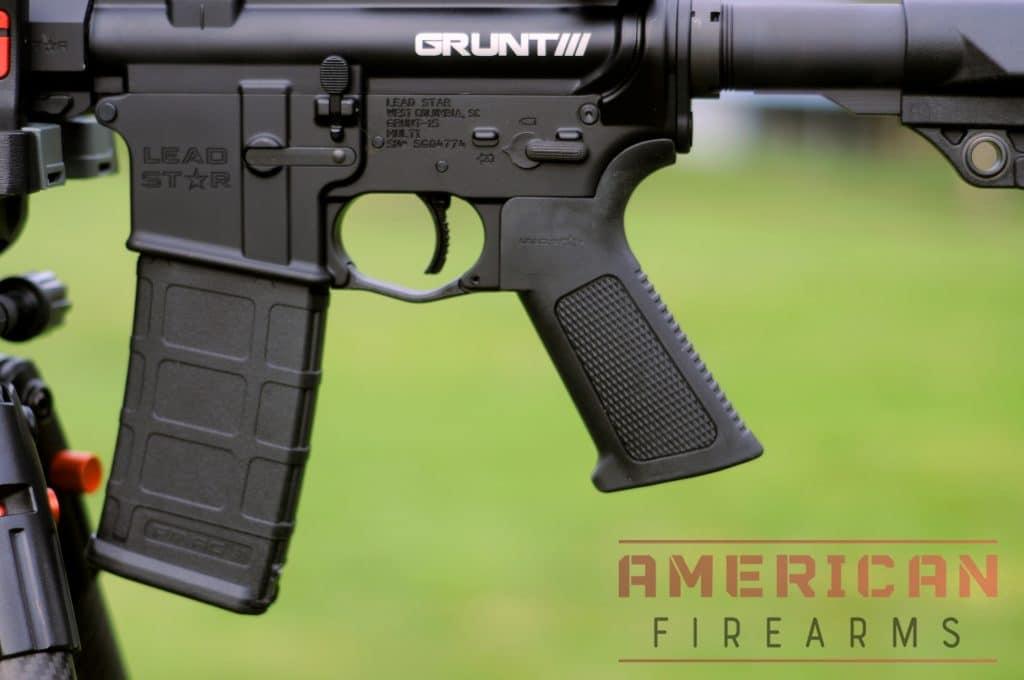
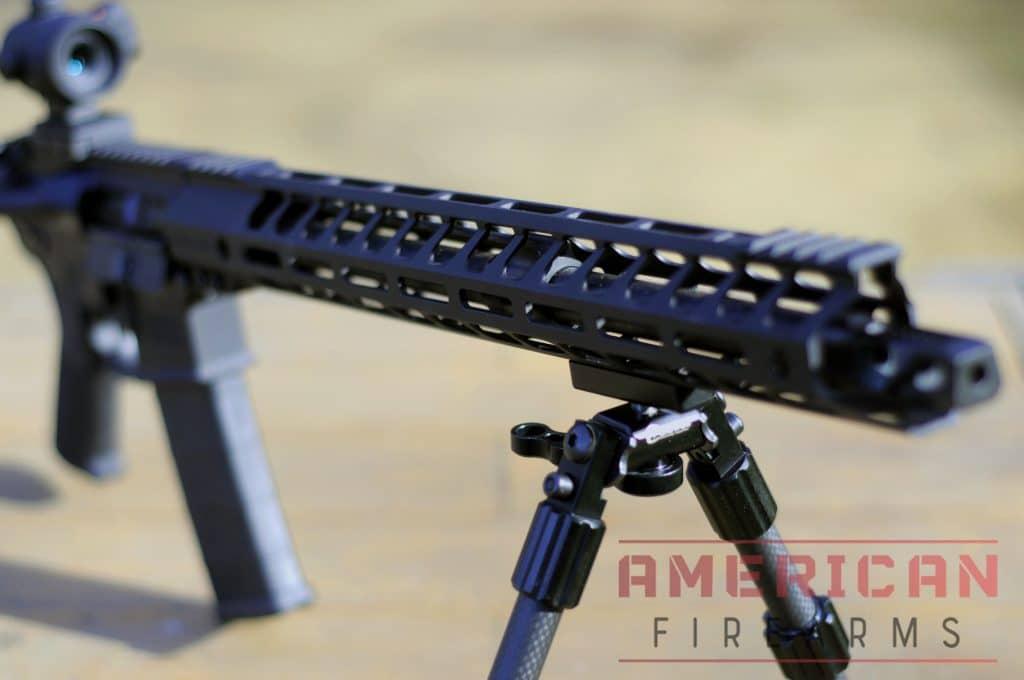
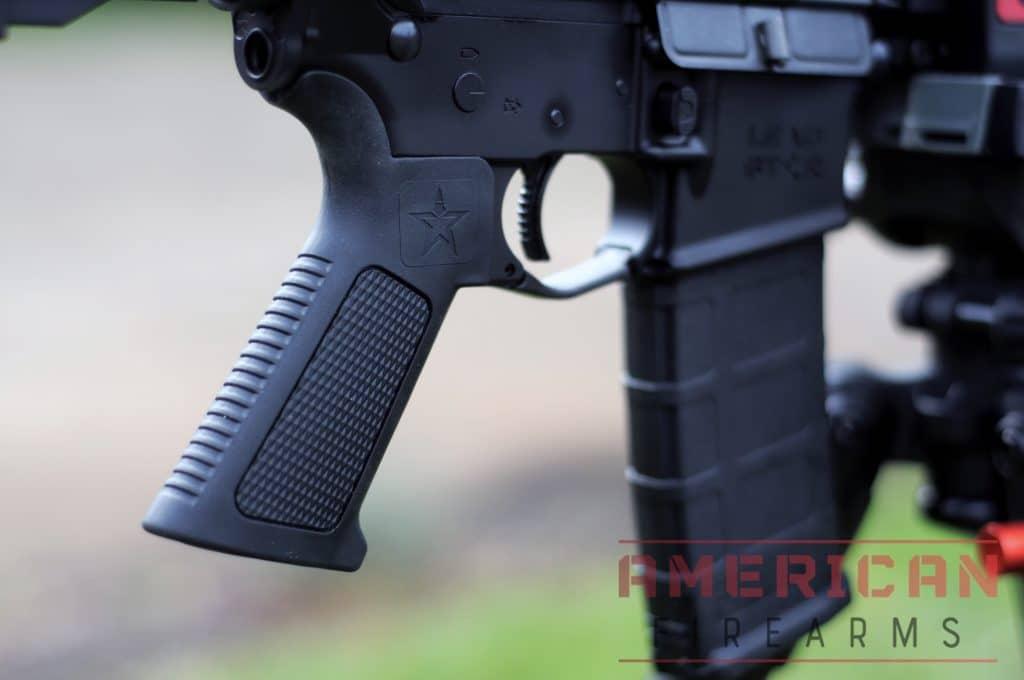
Another area that impressed me was the trigger — it’s a slender girl, with zero — like zero zero — uptake. Super snappy six pounds in weight and breaks when you intend it to. Straightforward reset and predictable as can be. Just a delight.
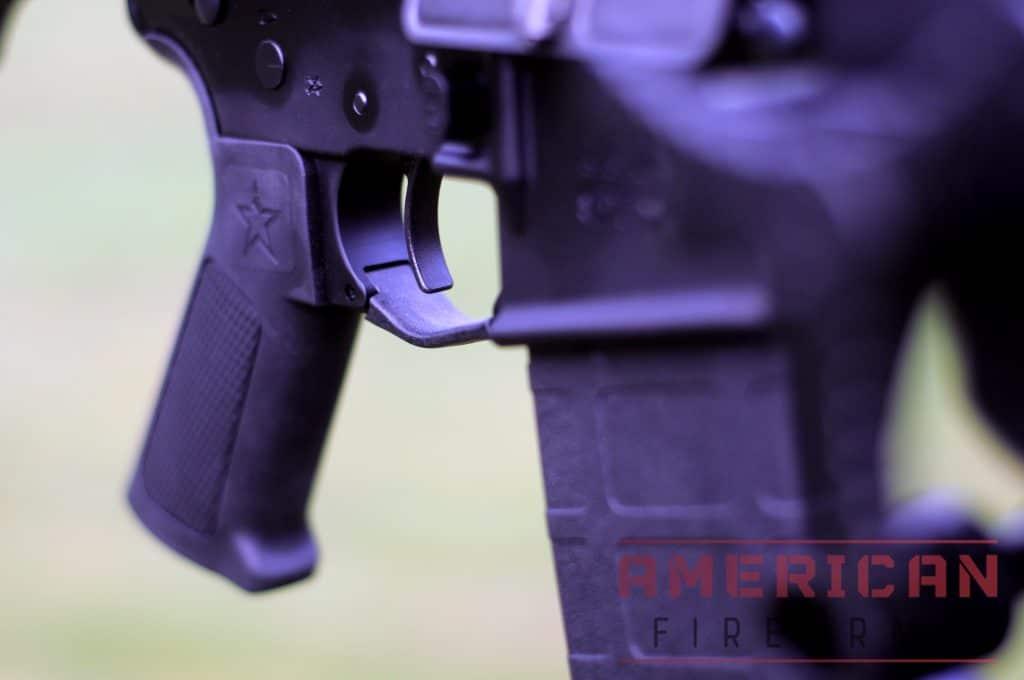
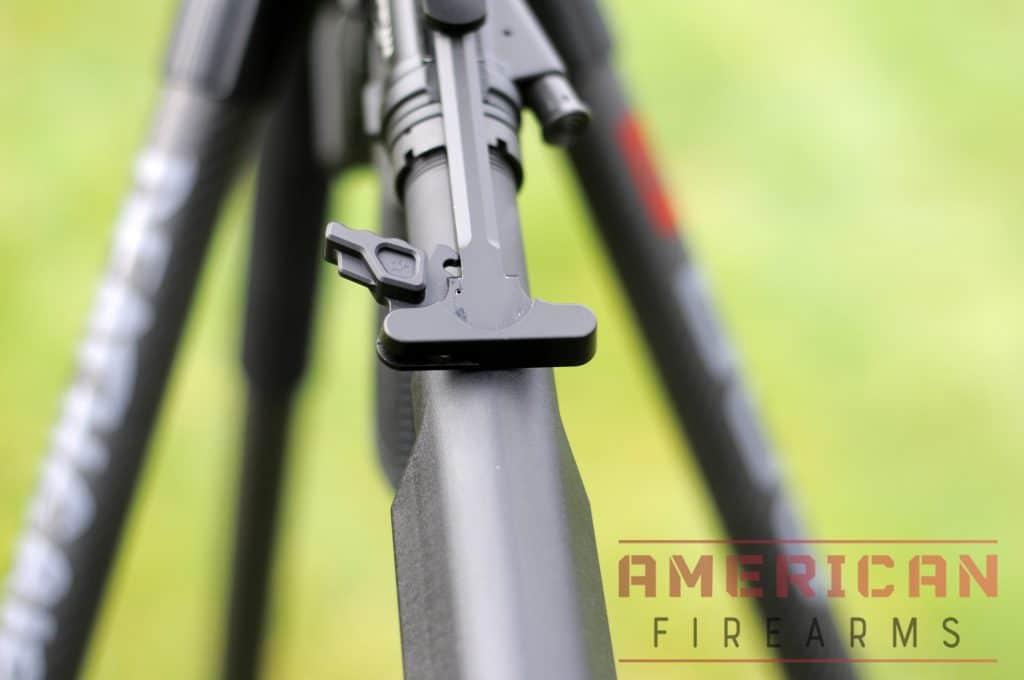
This being my first time with a Lead Star AR-15, I was incredibly impressed and thought it would clearly make a solid go-to AR for a beginner or seasoned enthusiast.
Shortcomings
The Grunt was great on a lot of fronts, but I didn’t appreciate that the handguard, while lovely, runs out under the muzzle brake, preventing me from testing this with a suppressor.
That fact was made doubly painful by the muzzle brake itself, which — while effective — is supremely loud. This rifle will make you few friends at the range.
4. Best M4 Build: FN M4 Carbine AR-15
Build Quality:
Accuracy:
Ergonomics:
Value:
What we liked:
- US military-grade
- Deep AR expertise
- Standard service rifle of the U.S. Army
- Chrome lined barrel
What we didn’t:
- 16″ barrel is your only option
- Expensive
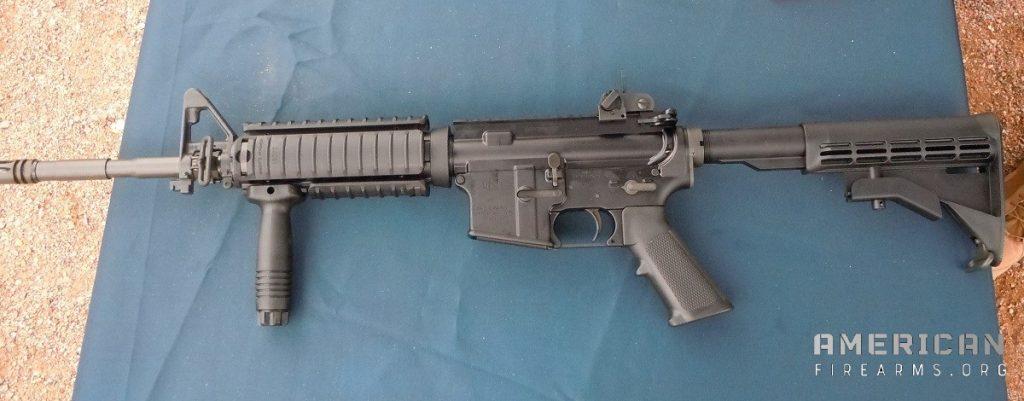
Best known for their SCAR-series rifles, FN has also been one of the biggest AR-15 manufacturers when it comes to making M4/M4A1 carbines for the US Armed Forces for the past two decades and consistently delivers thousands on open contracts every year.
Battle-proven M4/M4A1s
Yes, this is exact same rifle used by U.S. troops across the globe (giggle switch notwithstanding).
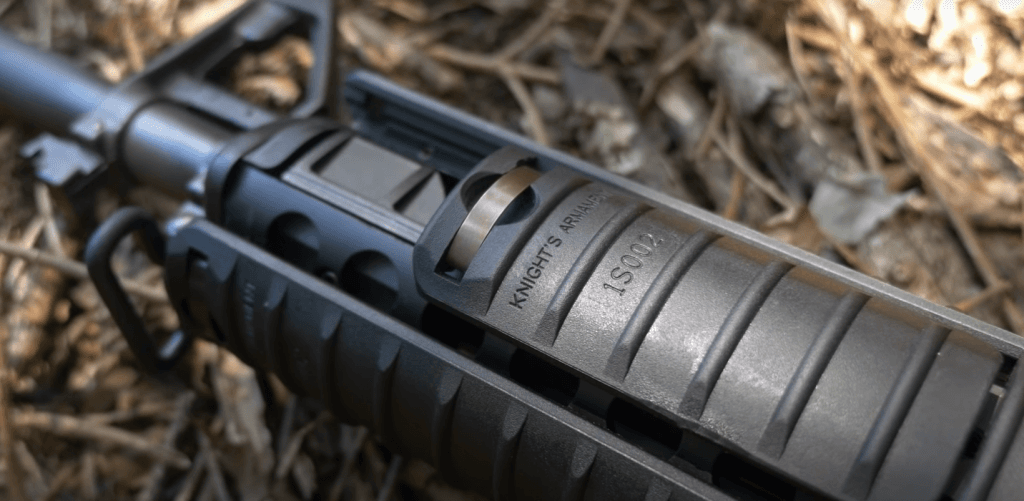
Their semi-auto M4 Collector Series guns, with a 16-inch, 1:7 chrome-lined, cold hammer forged barrel, is about as close as you can get to the Army’s standard rifle on the commercial market without talking to a recruiter. I’ve always appreciated FN firearms for their attention to detail and build quality, and the M4/M4A1 from FN holds that line beautifully.
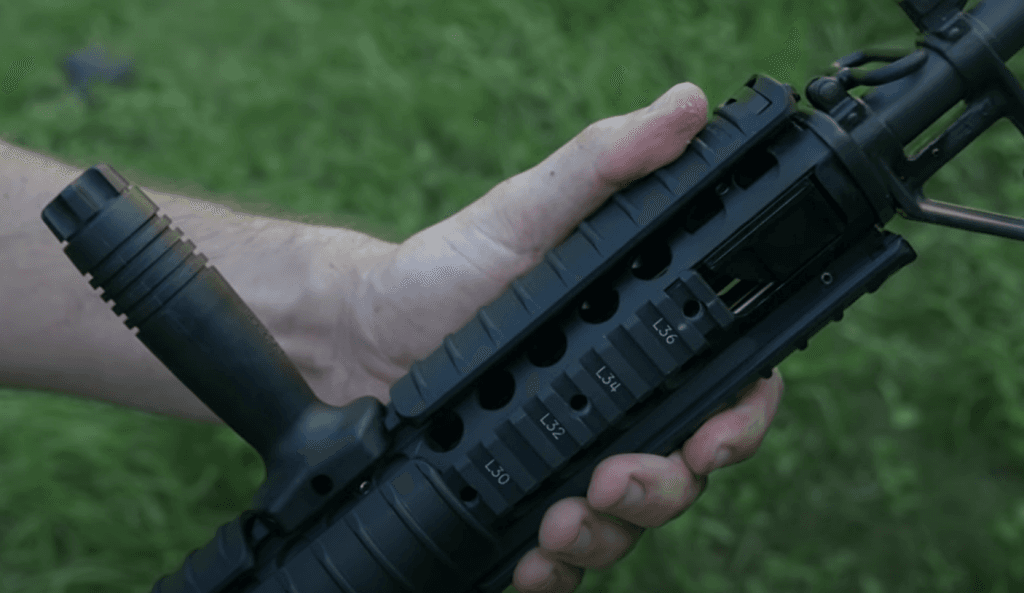
5. Springfield Armory Saint Victor 5.56 AR-15
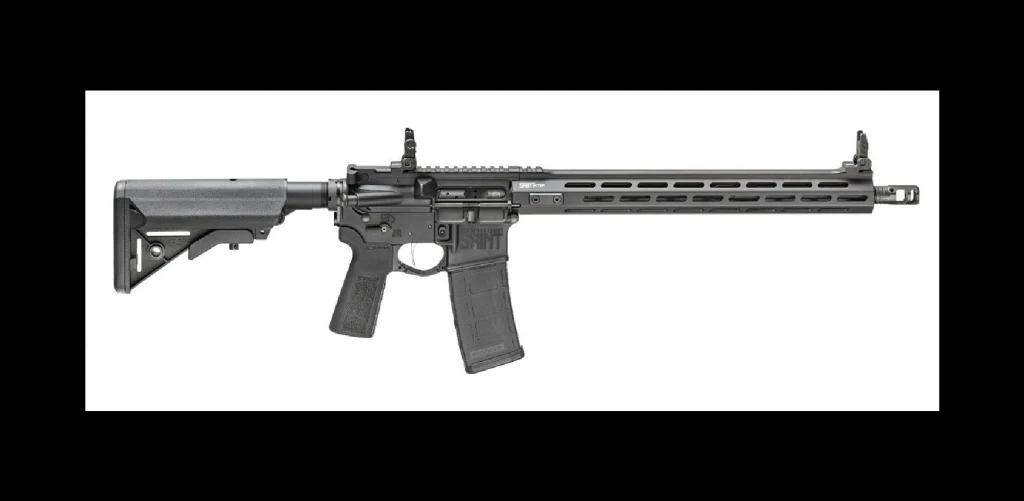
$1116.99

39
AVERAGE
2025 Awards & Rankings
Performance Scores
What we liked:
- Fantastic bang for the buck
- Solid upgrade over base SAINT rifle
- Nickel boron-coated flat-faced trigger makes for smooth, consistent pulls
- Smooth-top handguard makes it comfortable to use without gloves
What we didn’t:
- Tough to get your hands on one
- Short rail up top
From the M1A/M14 to the AR
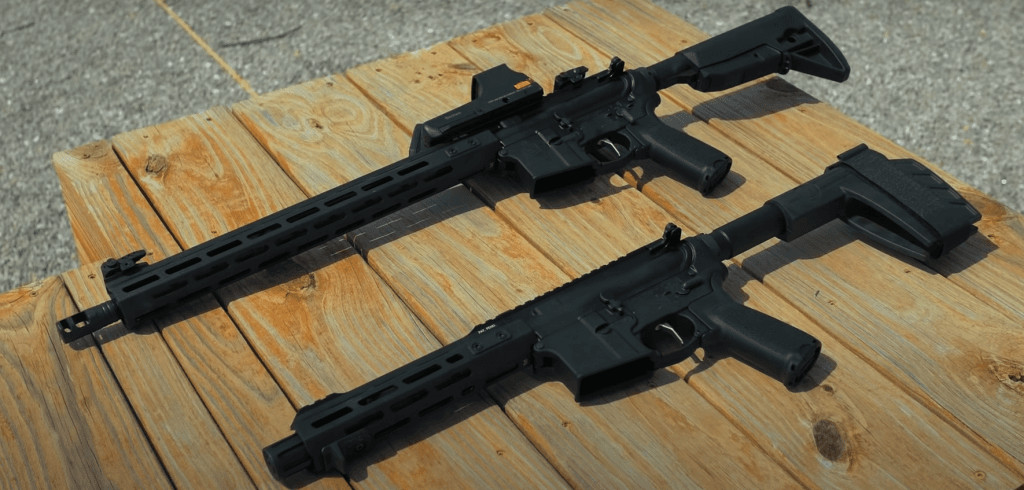
Cleverly taking on the old U.S. Army’s defunct Springfield Armory name in the 1960s and making a name for themselves with semi-auto M1A variants of the classic M14, Springfield Armory, Inc. has been around the block when it comes to ARs and is now one of the go-to AR-15 manufacturers for many people thanks to their mix of approachability, quality, and price competitiveness.
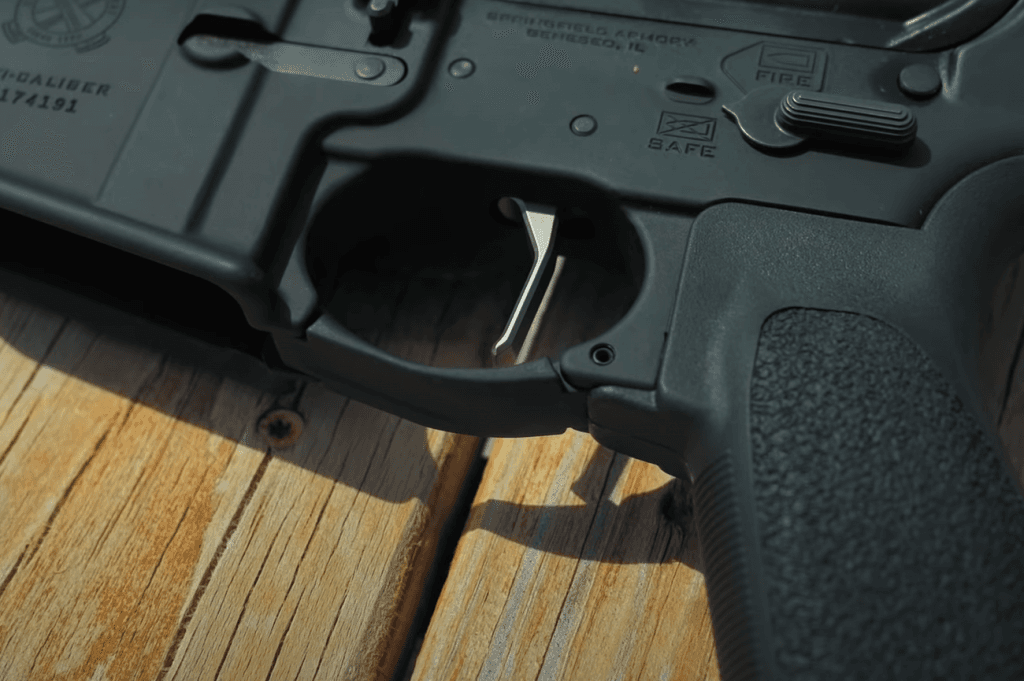
An improvement over the base SAINT rifle
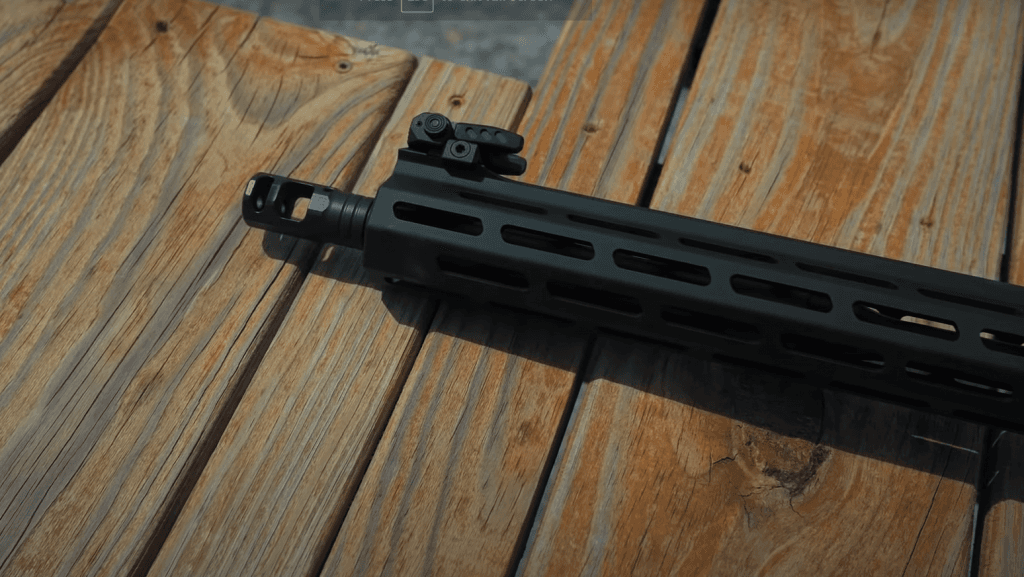
The Saint Victory builds on SA’s impressive SAINT semi-automatic rifle with serious attention to detail, a full-length 15″ M-Lok riddled handguard, mid-length gas system, a nickel boron-coated flat-faced trigger right out of the box, and a B5 SOPMOD stock that incorporates a QD sling mount and ergo cheek weld. The rifle length gas system reduces recoil and is ideal for longer barrels, making it well-suited for long-range shooting.w
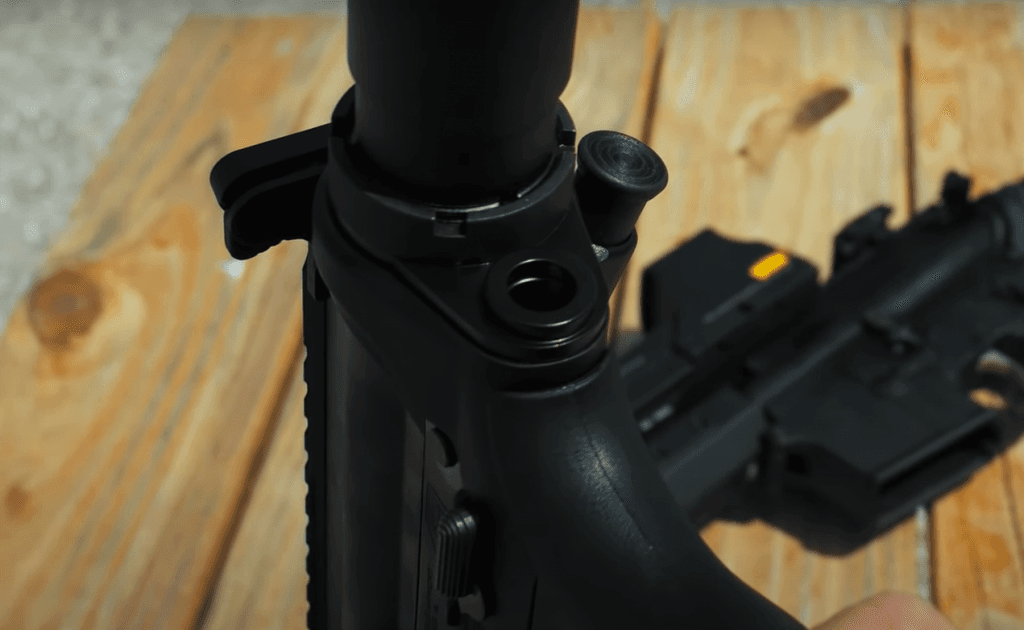
6. Also Great: Colt Law Enforcement 6920 Carbine AR Rifle
Build Quality:
Accuracy:
Ergonomics:
Value:
One of the original AR-15 manufacturers, Colt has certainly not abandoned American’s Rifle. Colt’s baseline M4 series gun, the LE2920 is one of the most encountered AR-15 rifles in the trunk of police cars from coast-to-coast.
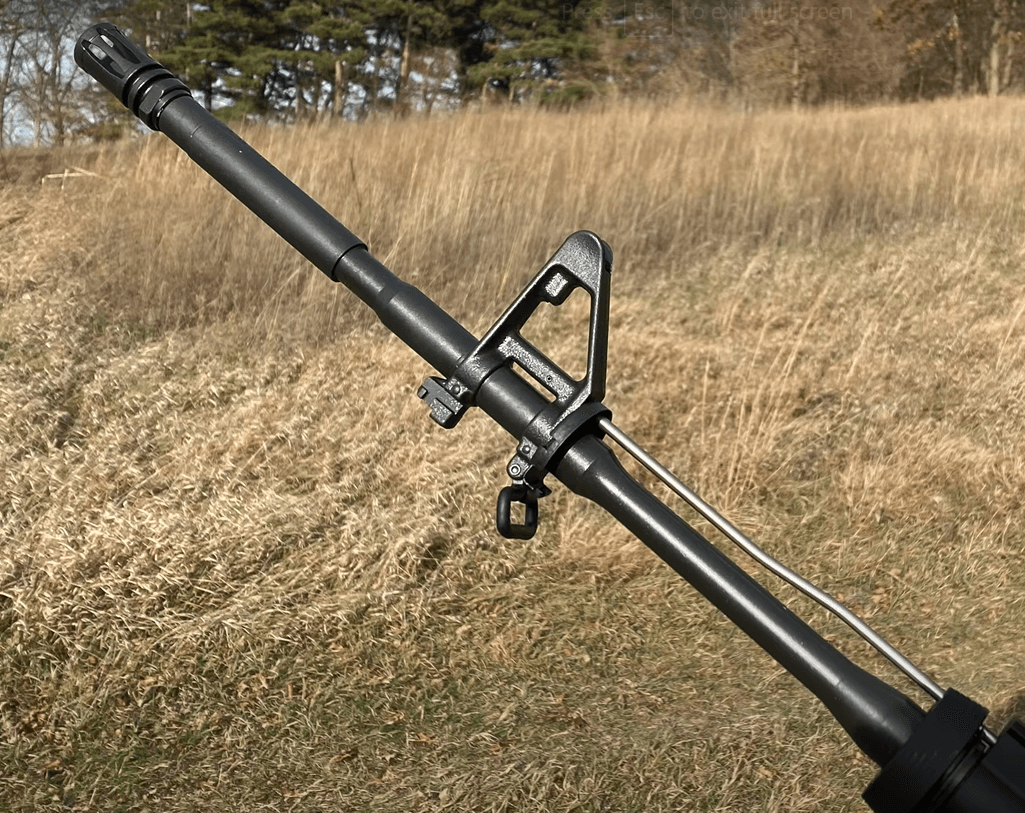
Something of an old-school semi-automatic rifle, it has classic rounded handguards which can put a crimp in the plans of those who want to hand a dozen accessories from their gun, but the LE6920 screams “Mil-Spec” with its 16-inch cold hammer-forged barrel, fixed front sight, and Magpul MBUS BUIS.
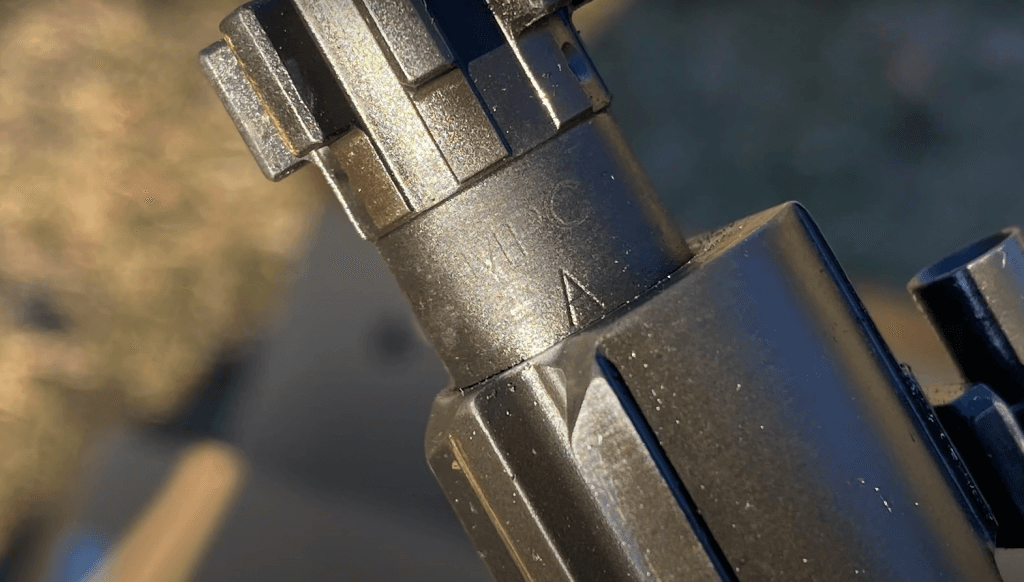
7. .308 Pick: Ruger SFAR
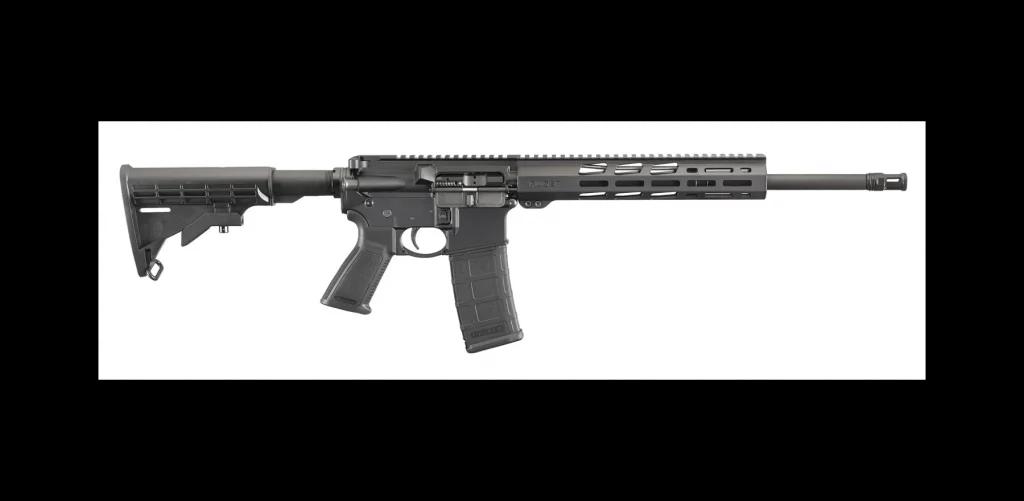
$880.99

41
EXCEPTIONAL
2025 Awards & Rankings
Performance Scores
Specs
- Caliber: .308/7.62 NATO
- Barrel Length: 16.1 inches (carbine); 20-inches (rifle)
- Overall Length: 34-37.25 inches (carbine); 38-41.25-inches (rifle)
- Weight: 6.8 pounds, unloaded (16-inch carbine); 7.3 pounds (20-inch rifle)
- Magazine Capacity: 20+1 standard SR-25 pattern.
What we liked:
- Ruger has delivered when it comes to a light AR-15-sized carbine that comes with the ability to fire the much more ballistically satisfying .308 Winchester.
What we didn’t:
- The innovative series of venting holes in the upper receiver, barrel extension, and bolt carrier leave the user with a very dirty rifle, especially when using a suppressor, while the factory-installed muzzle brake is sure to make no friends on the range– particularly when shooting indoors
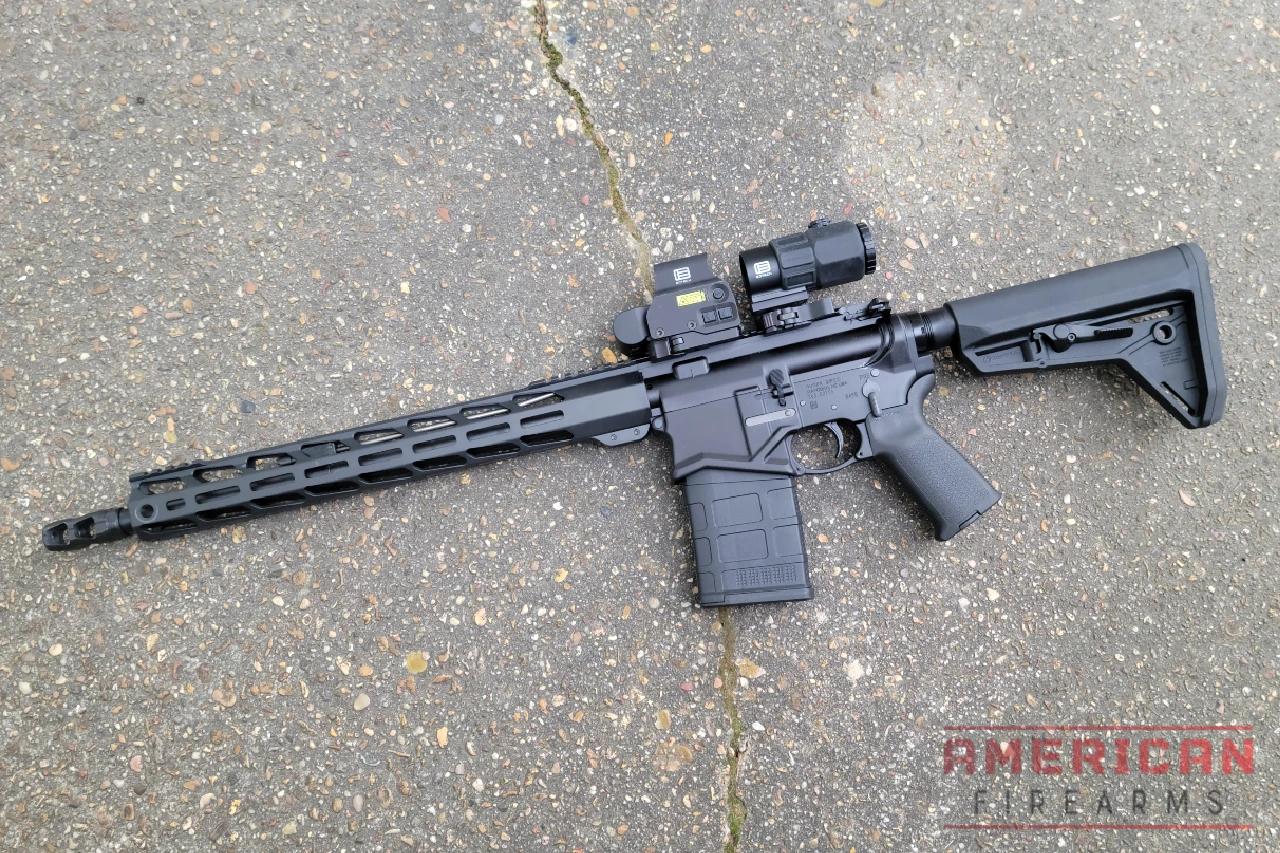
Billed not as an AR-10 but rather a Small Frame Autoloading Rifle in .308 that is nearly the same size as a traditional 5.56 caliber AR-15, Ruger’s SFAR is turning some heads.
Debuted in late 2022 as Ruger’s move to replace their 7.62 NATO/.308 caliber SR-762 piston rifle, the sub-7-pound/34-inch SFAR came in much lighter than the SR-762’s chunkier 8.6 pound/38-inch size while still offering the same 16.1-inch barrel. c
Ruger pulled off the tiny miracle via tweaks in the bolt carrier group and via trimming ounces wherever possible, such as cutting back on the top rail and going with an ultralight skeletonized free-floating handguard.
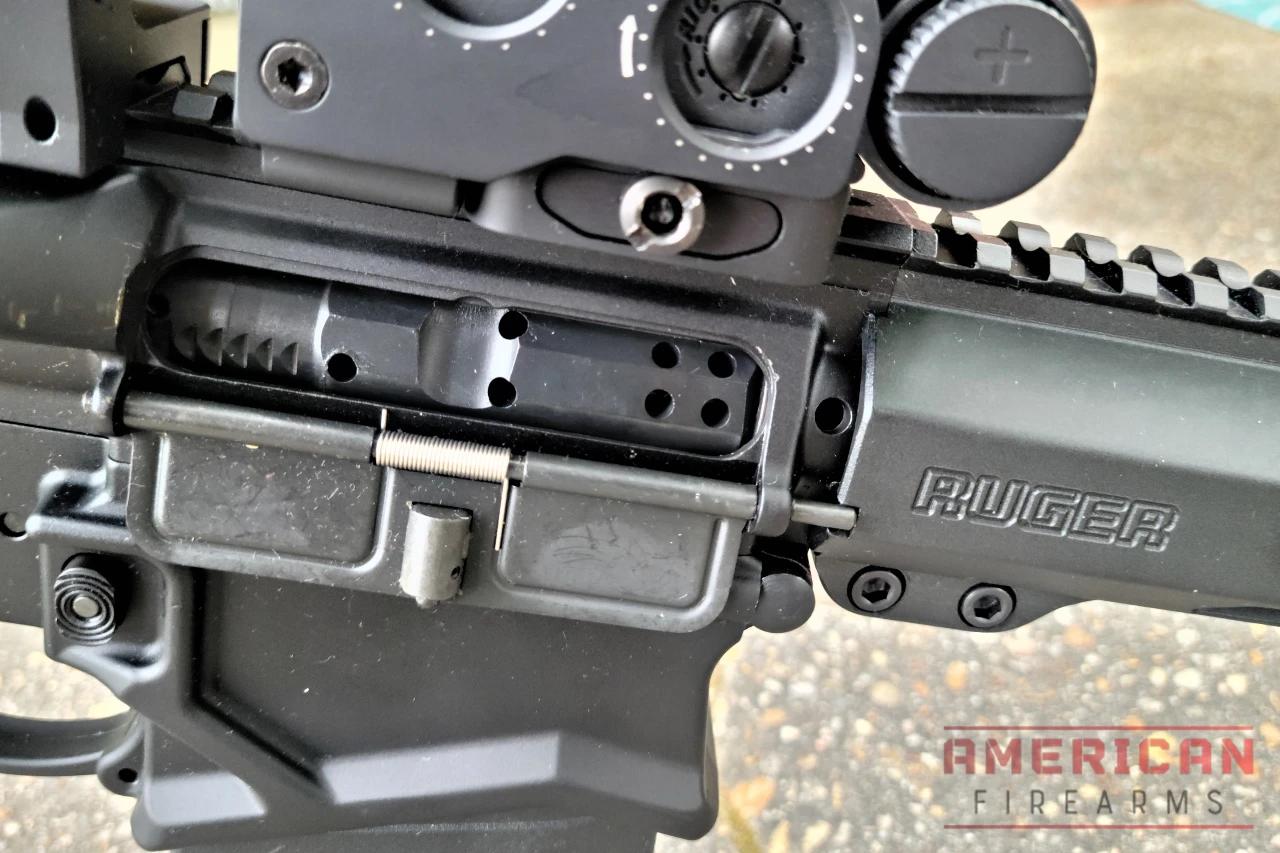
This gas-impingement actioned AR-15-sized .308 still offers an adjustable Magpul MOE SL stock and matching grip, a two-chamber muzzle brake to tame recoil, and a handguard slathered in M-LOK accessory slots.
The 16.1-inch barreled carbine only has two short Picatinny rails on the top of the upper receiver and handguard while the 20-inch model runs a full top Pic rail but comes in at 7.3 pounds, unloaded.
For use with suppressors, the SFAR features a 0.750-inch 4-position rotary-regulator gas block to dial in the gas as needed to match functionality. Finally, it has five sling swivel QD cups.
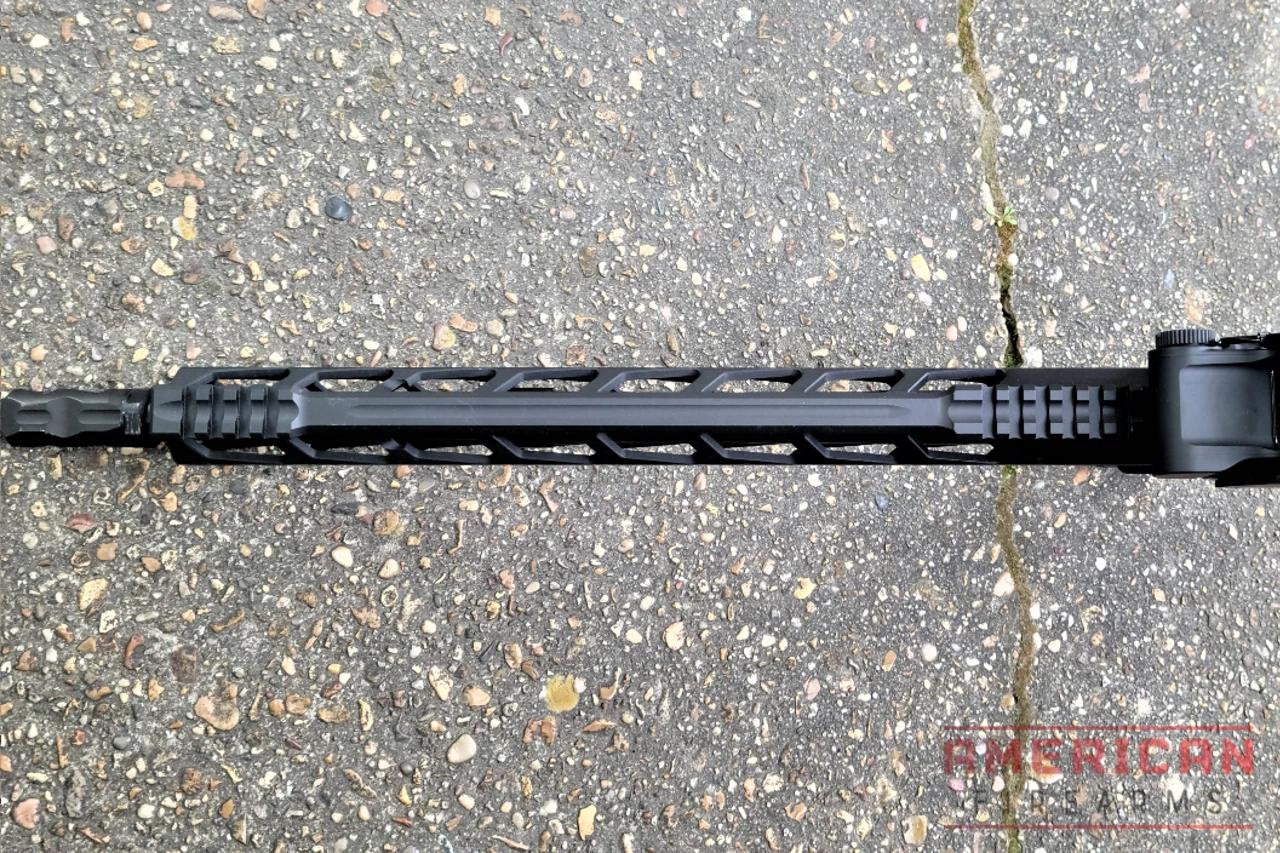
The safety selector switch and bolt release are on the left of the lower while the magazine release button is on the right– as with just about every AR-15. They work as advertised. The charging handle is ambi.
The SFAR in its 16-inch format is probably the lightest commercial .308 autoloader on the market other than the much more expensive POF-USA Revelation. The Magpul furniture is comfortable and easy to use without adding extra weight.
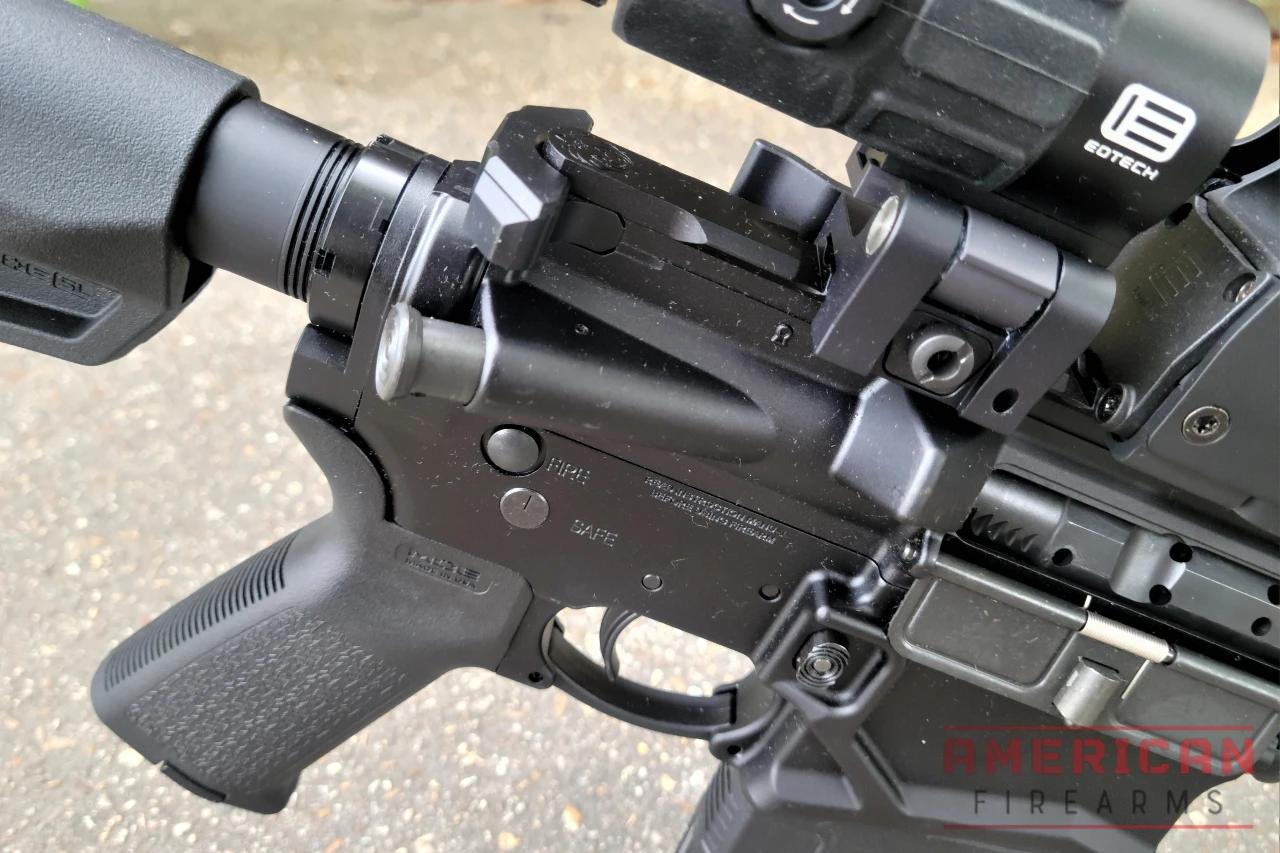
Firing the 16-inch carbine on three different range days with an assortment of 500 hunting, military surplus, and target loads, I found the SFAR to run 400:400 without a suppressor mounted.
However, when the suppressor was mounted (we used a Dead Air Sandman-S), things went off the rail until I experimented and dialed in the gas regulator to match the ammo.
The SFAR ships sans sights but has a top Picatinny rail on the upper receiver and handguard for optics, a red dot sight, and/or bolt-on irons.
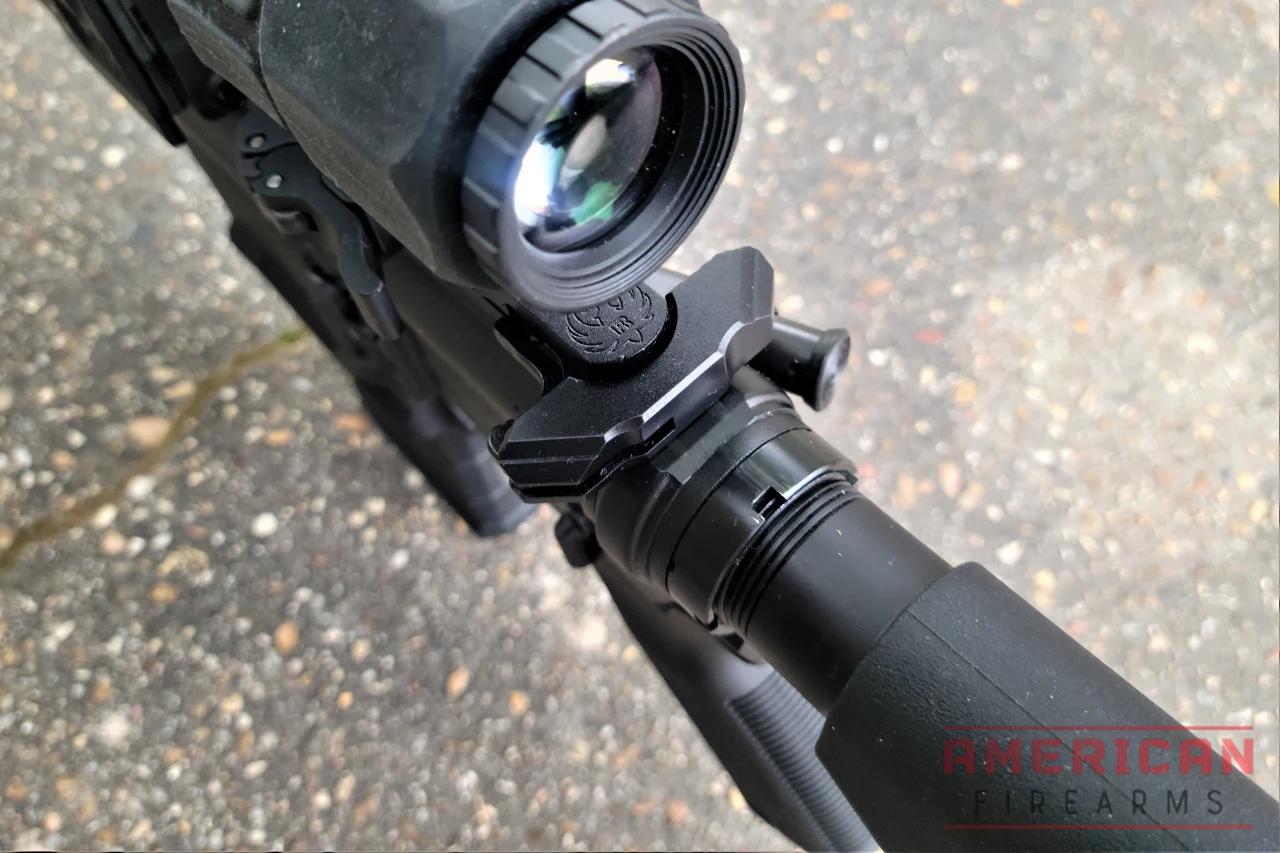
Both SFAR models ship from the factory with the Ruger Elite 452 trigger that delivers a smooth, crisp 4.5-pound 2-stage trigger pull. The rifle is also compatible with standard AR-15 packs which means it can be easily swapped out.
I found the SFAR to be almost sub-MOA accurate with match loads from the bench at the 100-yard mark. This stretched as I moved targets and switched to milsurp loads but the carbine was still capable of hitting gongs out to 500 yards.
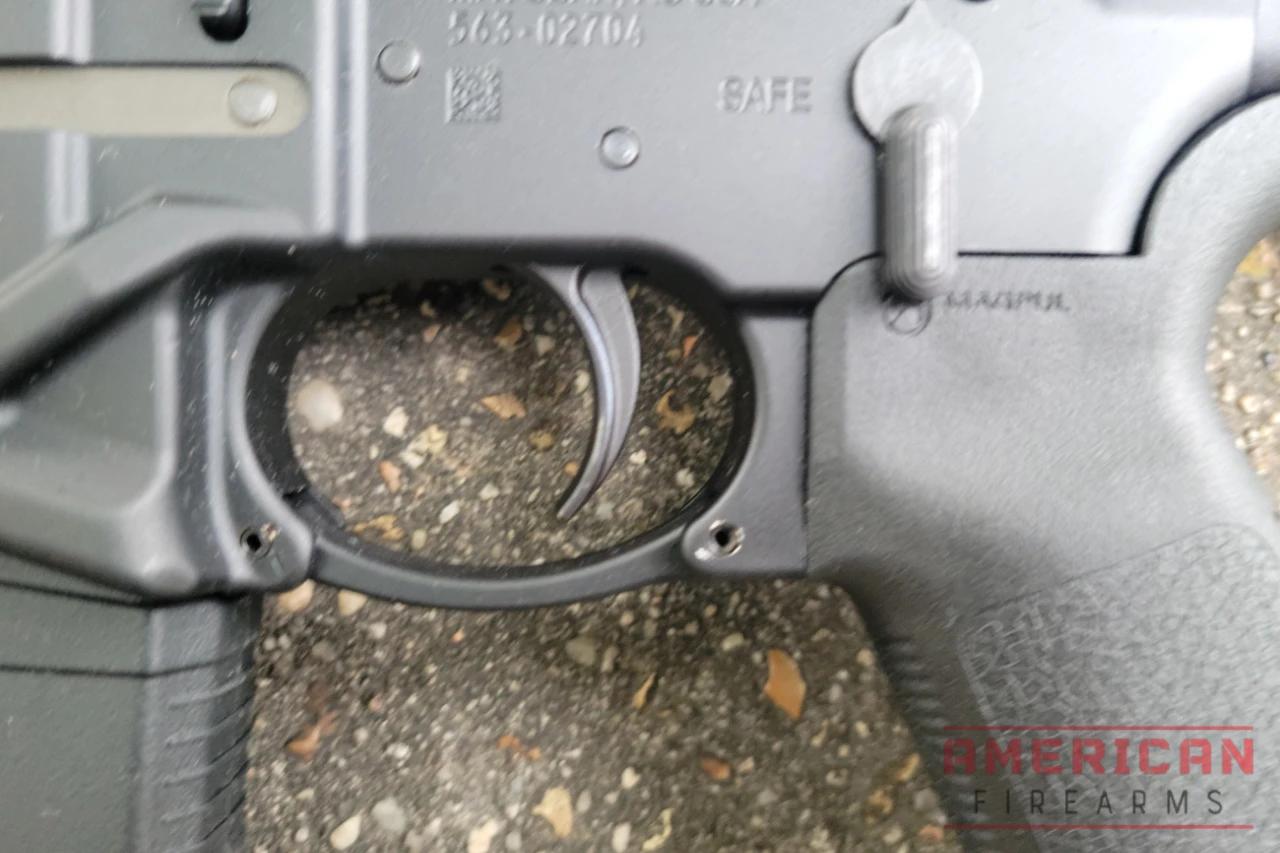
The SFAR is compatible with mil-spec AR-15 trigger groups, receiver end plates, charging handles, pistol grips, and adjustable stocks– which means you can switch up just about anything you want outside of the barrel, BCG, handguard, and receivers.
Want more on the SFAR? Check out our hands-on review.
8. Also Great: S&W M&P 15 Volunteer XV Pro
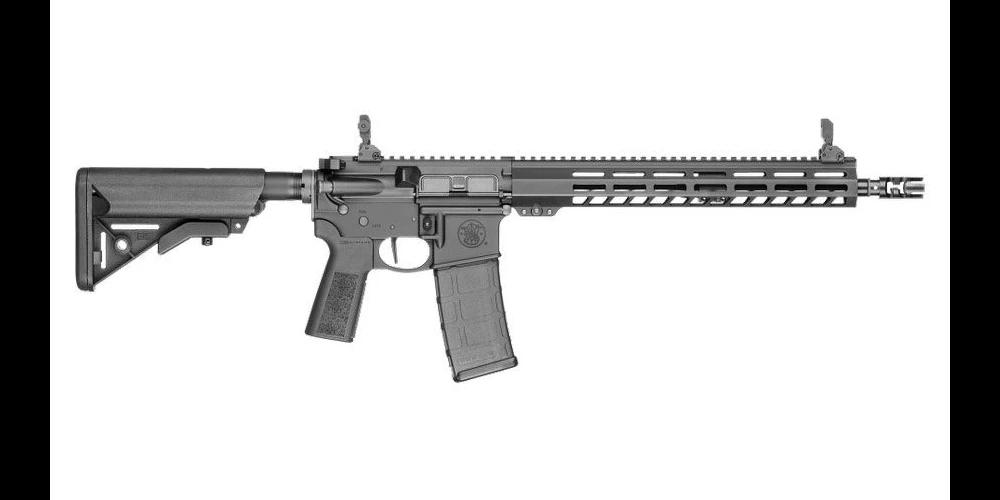
$930.99

34
AVERAGE
2025 Awards & Rankings
Performance Scores
Back when revolvers were the main game in handguns, Smith and Wesson never tried to put Colt underwater by over-building their guns, but they did offer wheel guns that brought 99% of what Colt did to the table and for less money.
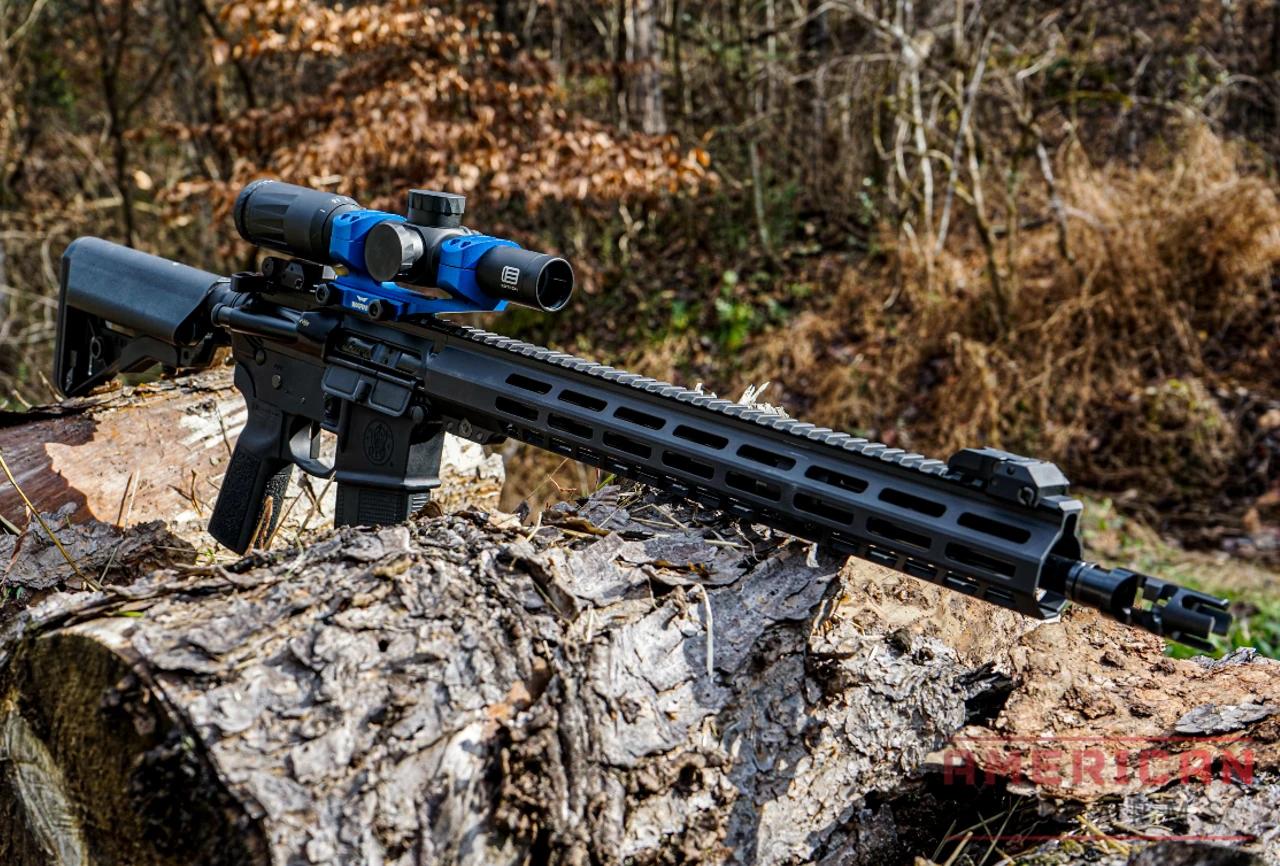
About a decade ago Smith and Wesson applied the same concept to the AR-15 by bringing their M&P15 line to market.
Priced affordably, they hit all the high points you look for in a quality AR in the sub-$1,000 price range. The M&P-15 is a great rifle that punches way above the mid-tier pricing, but their new M&P 15 Volunteer XV Pro really impressed me. This isn’t your ordinary AR-15.
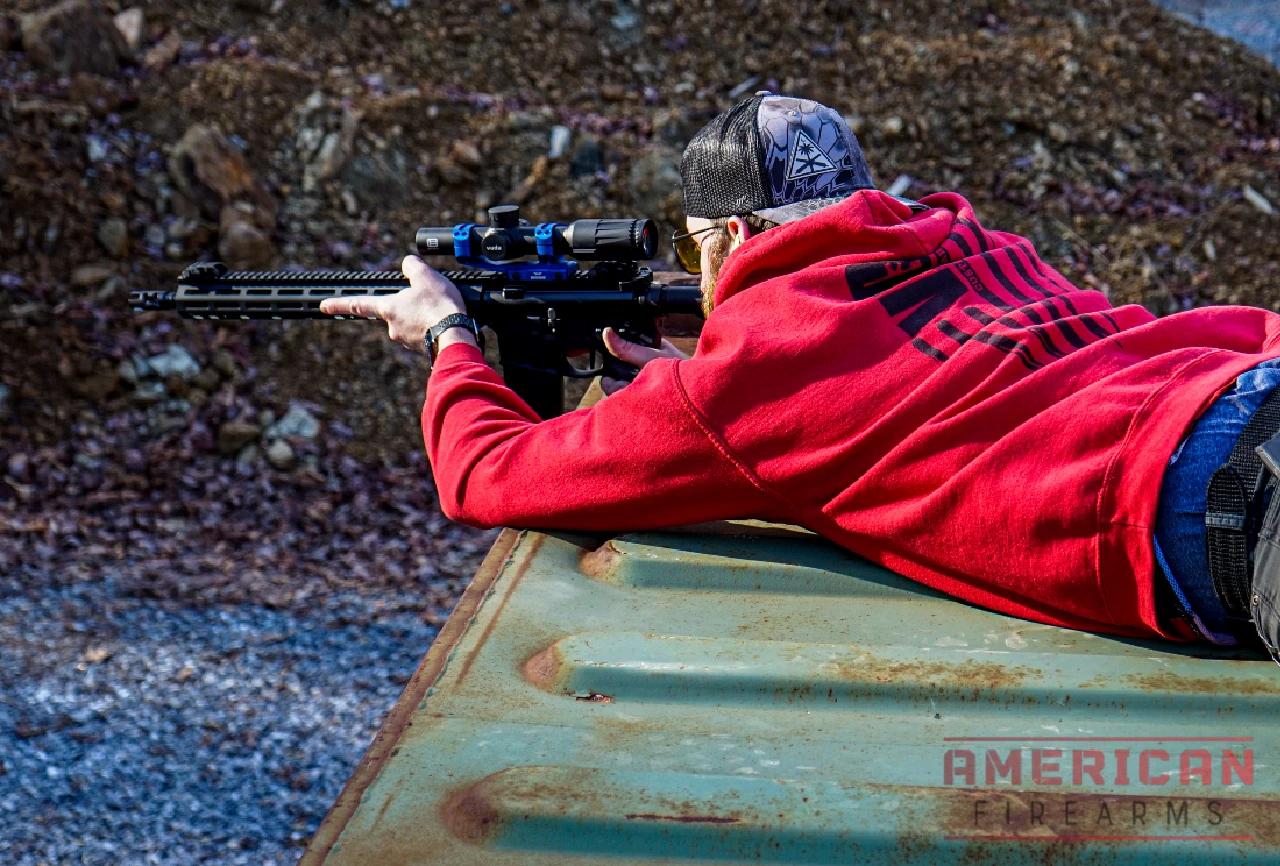
The new Volunteer series from S&W is designed for competition and performance right out of the box. S&W partnered with some larger named brands to build an AR-15 with high-quality parts for those competitive shooters who want a reliable and accurate gun to shoot.
The XV Pro has a 16-inch 5.56 NATO barrel with an internal and external Armornite finish. The 15-inch M-LOK forend is made of aluminum to cut some of the weight out of the gun. The rifle has a mid-length gas system, and the barrel is topped off with a Primary Weapons Systems 556 muzzle brake, which really helps with control if being a touch loud.
One of the best features is the ambidextrous Radian Raptor charging handle for easy left or right-handed manipulations — it’s so easy to manipulate and looks fantastic.
S&W also outfitted the rifle with a flat-faced trigger, 2-inch M-LOK rail sections included, a B5 Systems P-Grip 23 pistol grip, and a B5 Systems SOPMOD stock.
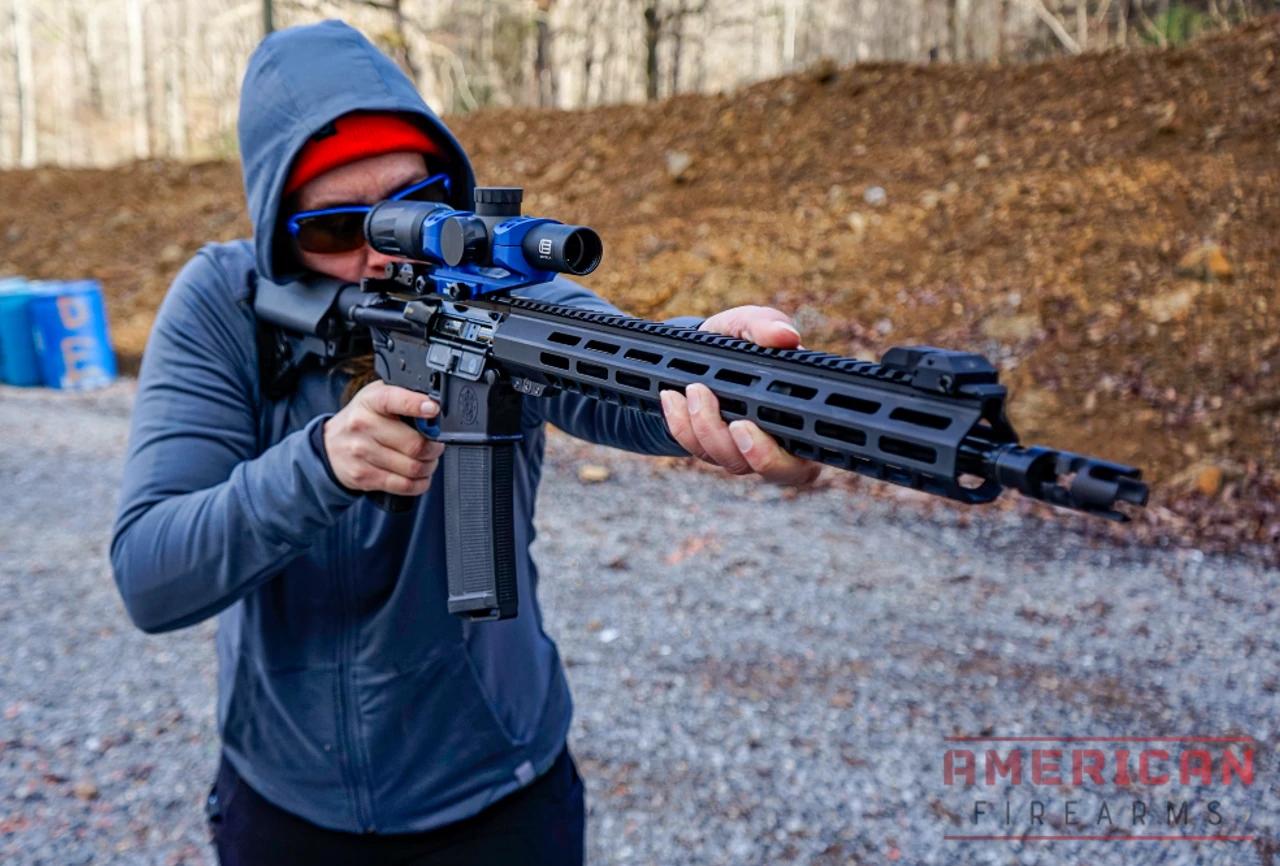
The level of detail Smith & Wesson put into developing this rifle to be comfortable and competitive doesn’t go unnoticed. Simply top the gun off with your favorite LPVO, and you’re ready to race.
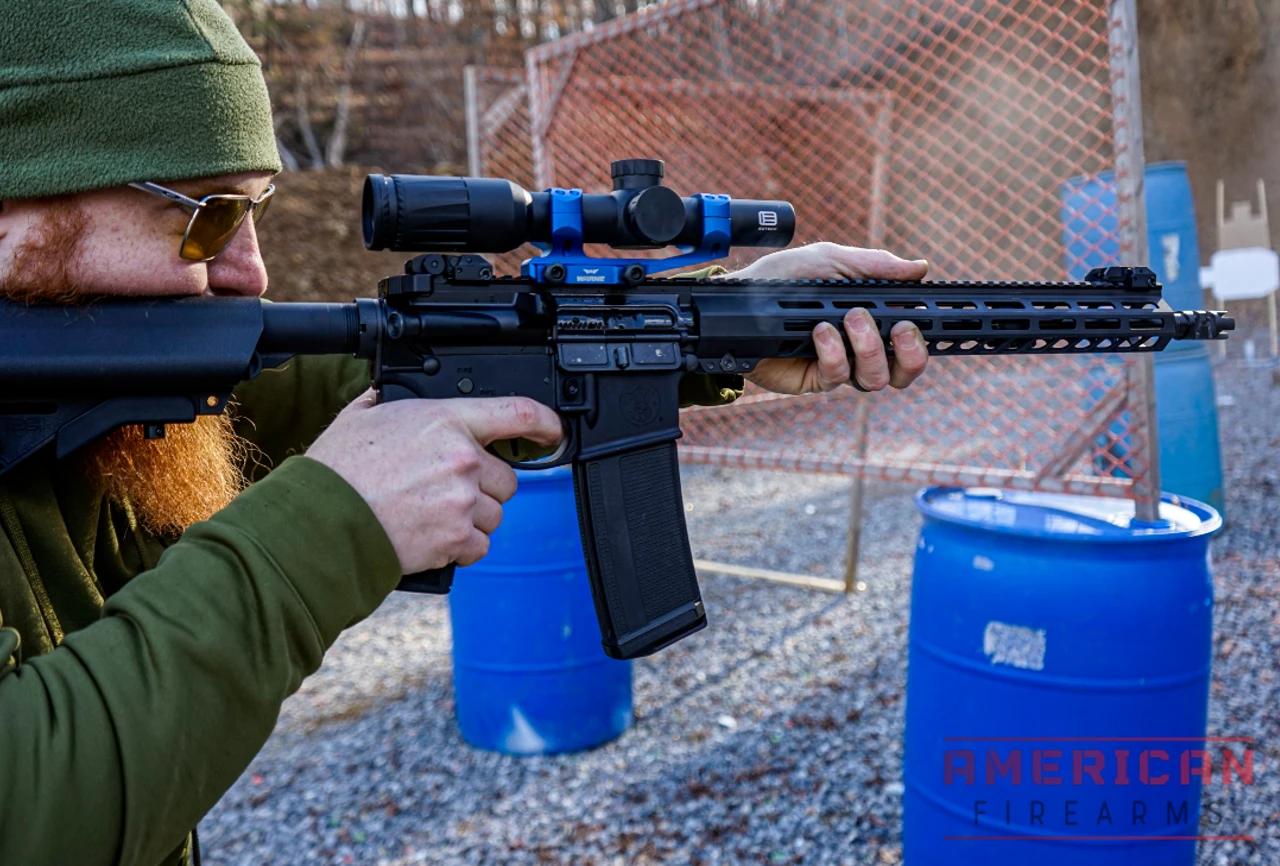
The pistol grip is a nice touch that gives most shooters a more comfortable grip angle as it comes more naturally. S&W also includes Williams Gun Sight Company Folding Sights, which I highly recommend keeping on the gun as backup sights if anything were ever to fail.
I found the gun sub-MOA accurate with good-quality ammunition straight out of the box.
9. Budget Pick: Anderson MFG AM-15 Rifle
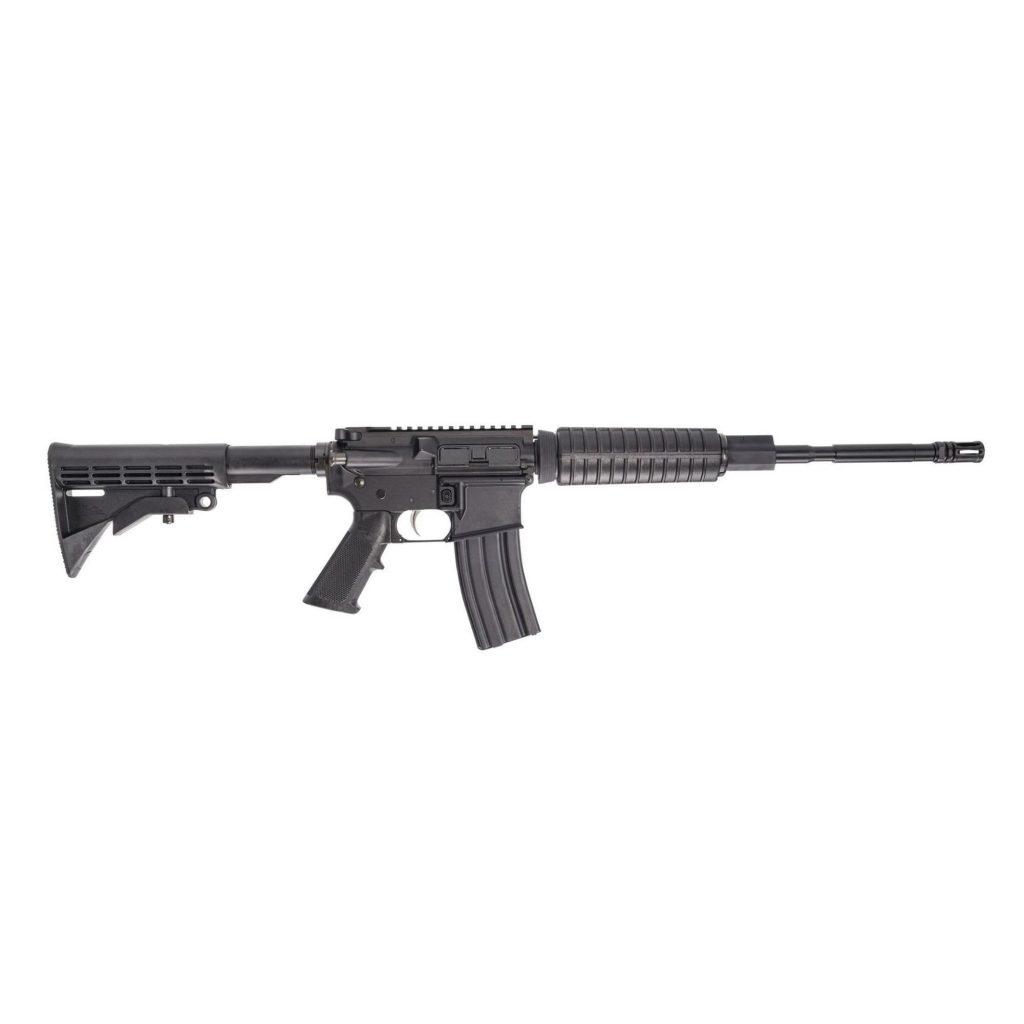
$549.99

45
EXCEPTIONAL
2025 Awards & Rankings
Performance Scores
Kentucky’s Anderson Manufacturing — lovingly referred to as the “Poverty Pony” in AR circles — is well known for lowers that cost less than a dinner for two. Still, their complete rifles are also solid performers. They manufacture all their components in Hebron, Kentucky, which helps them pass the savings onto you.
Their AM-15 is a fantastic budget AR is an inexpensive rifle with a 16-inch 4150 Chrome Molybdenum Vanadium Steel barrel that ends in an A2-style birdcage.
Despite what many folks would consider a “low expectation” rifle, the AM-15 runs a forged aluminum receiver that has been anodized, and the 1-8 twist barrel is parkerized, making for a gun that will hold up well over time. Some of the more subjective aspects — like charging handle feel — aren’t as polished as more high-end guns, but the Anderson is a reliable firearm that may very well win you over in time.
This rifle is a great choice for those who already have an optic picked out, as it includes a flat-top rail on the upper.
One thing I would like to see is some FSB, as the AM-15 does not have a front sight, but if you’re running an optics, it’ll do the trick. Also, the drop-in handguard does not have accessory rails, a common reality with sub-$700 ARs.
10. .223 Wylde Pick: Aero Precision AR15 M4E1 223 Wylde
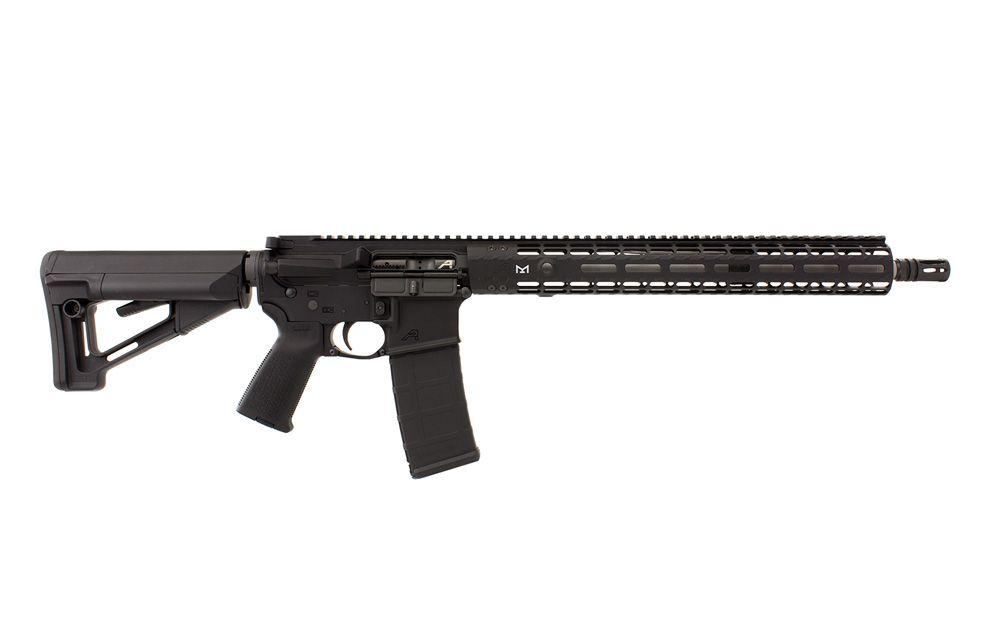
$999.99

48
EXCEPTIONAL
2025 Awards & Rankings
Performance Scores
Aero Precision almost certainly has the most receivers in circulation, and Enhanced Series Upper Receiver is incredibly popular. Their complete rifles are just as reliable and impressive.
This Aero M4E1 is chambered in .223 Wylde, which gives you the option of running 5.56 NATO or .223 Rem. The 16-inch barrel has been bead blasted and is made from 416 stainless steel, and when paired with the low profile gas block and a mid-length gas system, runs as smooth as rifles costing considerably more. It’s a fun rifle to shoot.
The receiver is Aero’s Gen 2 lower, which boasts a flared magazine well and has a tension screw to keep the play out of the upper and the lower. I would have preferred the inclusion of iron sights and– given the flexibility of the .223 Wylde to shoot the longer-ranged .223 Remington — a muzzle brake of some kind, as the A2 feels out of place with the rest of the rifle’s build quality.
The addition of the Magpul STR Stock is great, as you get both a comfortable comb angle and storage for things like batteries to keep your optics running.
The M4E1 is set up to be a perforant hunting rifle, so a scope on top of the ample Picatinny rail would be more appropriate. The lightweight M-LOK handguard keeps weight down while providing room for all the accessories you could want to take into the field.
11. Also Great: Diamondback DB15 FDE Elite AR-15
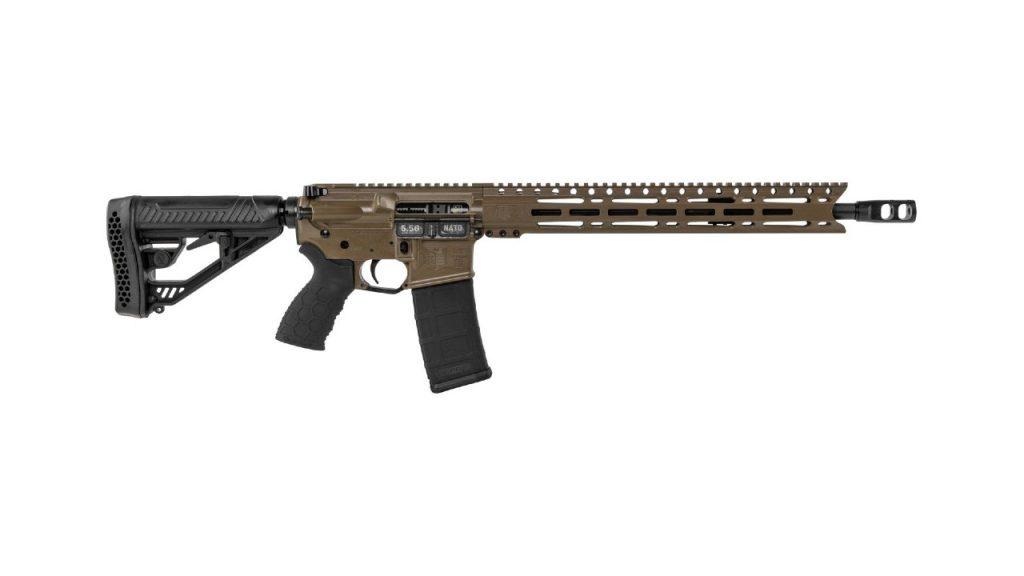
$927.99

41
EXCEPTIONAL
2025 Awards & Rankings
Performance Scores
This year’s Diamondback’s DB15 has been totally redesigned, and if you simply add up the price of the components they incorporated into the new gun it’s easy to see how much value they packed into their new AR.
The inclusion of the 1-8 twist 16-inch 4140 Chrome Molybdenum Steel barrel, forged 7075 T6 aluminum upper and lower both cerakoted in flat dark earth, an adjustable Adaptive Tactical EX Performance stock, and one of the most aggressive muzzle brakes I’ve seen on a factory rifle in years, it’s easy to see that Diamondback aimed this rifle squarely at those of us who want to spend around $1,000 on an AR without the need to upgrade it. The new DB15 does that in spades.
Many AR enthusiasts are happy to spend $700-$800 on a base gun, and slowly add better components over time to build or customize the rifle. That’s not something you’ll need to do with this gun — you buy it from the factory with all the bells and whistles you want.
12. RECCE Rifle Pick: Sig Sauer M400
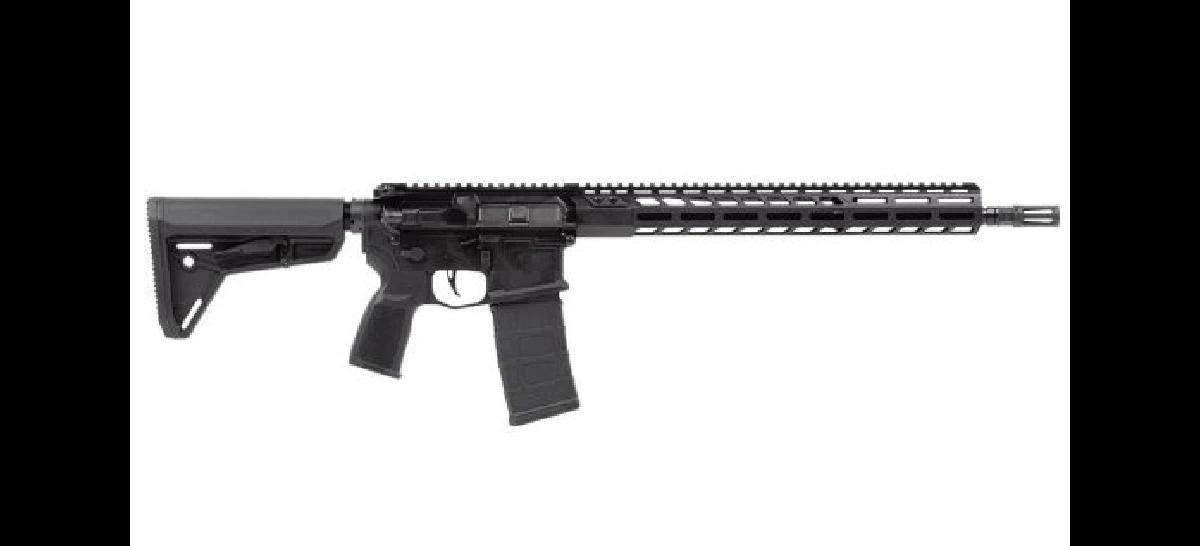
$1023.99

53
EXCEPTIONAL
2025 Awards & Rankings
Performance Scores
Given SIG’s recent spate of military contract wins, their M400 line of ARs benefits from both the duty pedigree and SIG’s commitment to innovation. The M400 line has a few variants, from the budget-friendly Tread to the premium SIG M400-DH3, but my personal favorite (and the one we’ve got a good 2,000 rounds through) is the SIG M400-SDI XSeries, which strikes a balance between the Tread and DH3.
The M400 SDI takes the familiarity of the Tread/AR platform and marries it to the DH3’s competition focus, giving you a rifle that brings competition performance in a common tactical design.
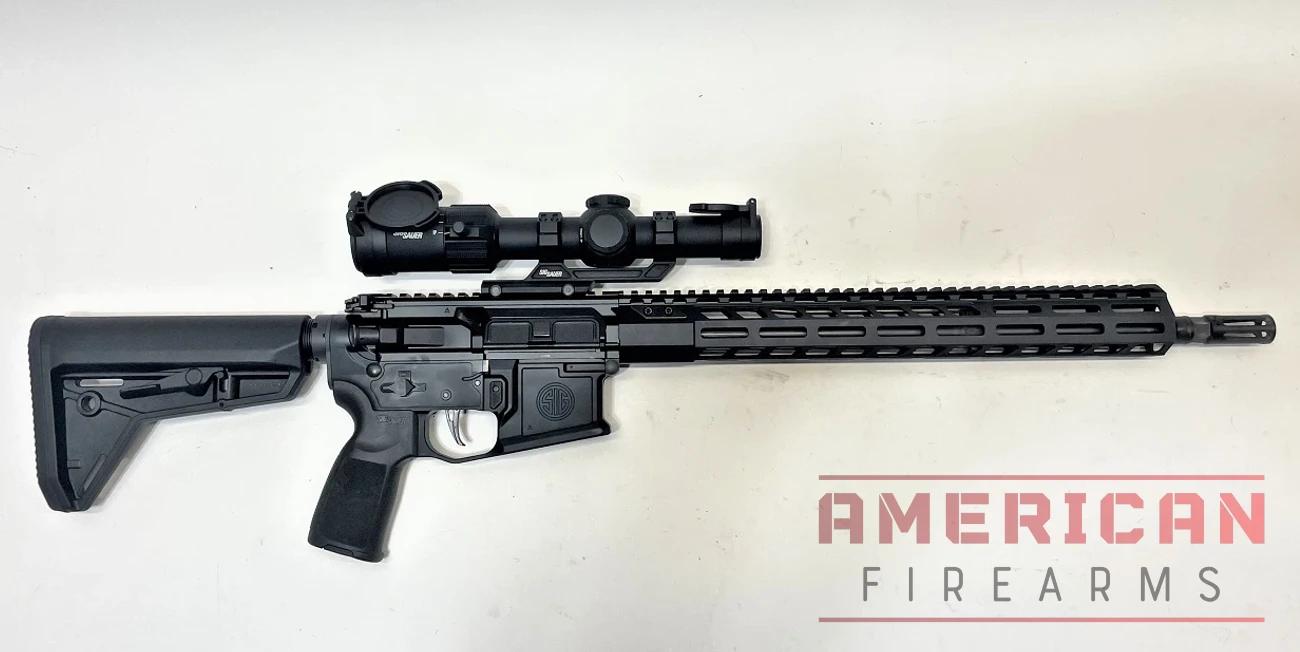
The M400 is incredibly reliable, and M400-SDI XSeries adds a ton of nice upgrades over the Tread — like fully ambidextrous controls, ambi charging handle, and most importantly the sweet 2-Stage Matchlite Trigger that breaks right around 3.5 lbs.

The M400 SDI is an awesome rifle, and while it’s not cheap — often in the $1,200-$1,500 range, the fit and finish is fantastic, making it one of the few fully assembled rifles I would buy.
FAQs
Here’s a list of common questions related to everyone’s favorite black rifle.
What does AR stand for in AR-15?
AR in AR-15 stands for “ArmaLite Rifle,” not “Assault Rifle” as is often mistakenly assumed. ArmaLite is the company that developed the AR-15 in the 1950s. The “15” designates the model number in ArmaLite’s series of firearms.
What caliber is an AR-15?
Most AR-15s are chambered in 5.56x45mm NATO or .223 Remington. However, AR-15 style rifles can be built in various calibers, including .300 Blackout, 6.5 Grendel, and 9mm, among others. The standard 5.56mm/.223 remains the most common.
How much does an AR-15 cost?
AR-15 prices can vary widely based on quality and features. Entry-level AR-15s typically start around $500-$700, mid-range options cost $800-$1,500, and premium models can exceed $2,000. Custom-built AR-15s can cost even more.
What is the difference between an AR-15 and an M16?
The main difference is that the AR-15 is a semi-automatic rifle for civilian use, while the M16 is a select-fire (capable of fully automatic fire) rifle used by the military. AR-15s also typically have 16-inch or longer barrels to comply with civilian regulations.
How long is an AR-15?
A standard AR-15 with a 16-inch barrel typically has an overall length of 32-36 inches with the stock fully extended. This can vary slightly depending on the specific model and components used.
What is the legal barrel length for an AR-15?
In the United States, the minimum legal barrel length for a rifle is 16 inches. Anything shorter requires registration as a Short Barreled Rifle (SBR) under the National Firearms Act, which involves additional paperwork and a tax stamp.
How many rounds does an AR-15 hold?
Standard AR-15 magazines typically hold 30 rounds. However, capacity can range from 5 to 100+ rounds depending on the magazine. Some jurisdictions limit magazine capacity, often to 10 or 15 rounds.
What states ban AR-15 rifles?
As of 2024, several states have restrictions or bans on AR-15 style rifles, including California, New York, New Jersey, Connecticut, Hawaii, Maryland, and Massachusetts. Laws can change, so it’s important to check current local regulations.
How does an AR-15 work?
AR-15s typically use a direct impingement gas system. When fired, some of the gas from the burning gunpowder is redirected through a small hole in the barrel to push the bolt carrier group backward, ejecting the spent casing and chambering a new round.
What is a buffer tube on an AR-15?
The buffer tube, also called the receiver extension, is the hollow tube that extends from the lower receiver and houses the buffer and recoil spring. It’s crucial for the cycling of the rifle and also serves as the attachment point for the stock.
Recap
Given the size and scope of the AR world and its standing as a consistent target of ever-evolving gun laws, finding the right AR-15 for you can be intimidating, especially when you’re looking for your first AR, starting down the long road of building your own from an AR build kit, or just concerned about the ever-evolving world of gun control.
In the end, whenever one of my friends wants recommendations for choosing an AR-15, I always recommend doing your homework, spending some time at your local gun store, and making sure your rifle is designed for your needs. The modular design of the AR means you can build a big game hunting rifle, one for long-range precision, a competition gun, a home defense gun, something for close-quarters combat, or anything in between.
I recommend buying a complete rifle, spending time at the gun range with it – then getting another!
Lots More Reading
- NRA Museum, Colt AR-15 Rifle
- National Park Service, U.S. SUBMACHINE GUN XM177 “COMMANDO”
- NRA Museum, Guns of Vietnam and Desert Storm
- Defense Standardization Program, FAQs
- Nathan Schueth, 4150 Carbon vs 416-R Steel
- Otai Steel, 9310 steel vs 8620
- Stag Arms Blog, Commercial vs. Mil-Spec Buttstocks
- Peter Luff, Troops in Afghanistan get new lightweight rifle magazines
- Howard Precision, Difference Between 6061 and 7075 Aluminum
- FBI.gov, NICS Background Checks By Month/Year
- Wikipedia, Ammo Shortage in the U.S.
- NPR, Kyle Rittenhouse Trial In Kenosha Killings Delayed Until November
- NRA Blog, How to Pick the Right Round For Your AR-15 Barrel
- SADJ, Barrel Length Studies in 5.56 NATO Weapons
- Ballistics by the Inch, 5.56 Ballistics by Barrel Length
- KAK Industry, 4.75″ AR Barrel
- Gun Digest, Articles and Books on AR-15s and Tactical Rifles
Updated
May 22, 2025 — We dove deeper into the caliber options provided by our recommended brands to help clarify which brands support specific calibers most effectively.
Sign up for our newsletter
Get discounts from top brands and our latest reviews!

